Users’ Working Papers
The V-Dem Institute encourages users of V-Dem data to submit a version of their papers as Users’ Working Papers to be published in our website.
Why?
- The V-Dem Institute has a wide network of readers and followers, both through website and social media. Sharing your paper with us can help to exchange your findings with other scholars and practitioners through our network and increase your readership.
- It also gives recognition to the people who have invested years into creating the dataset.
Please submit your paper by email to contact@v-dem.net.
Template for the Users' Working Papers is available here Working Paper Template.docx (115.1 KB).
Disclaimer
V-Dem does not do quality control and therefore does not endorse the content of the Users' Working Papers, which is the responsibility of the authors only.
| User WP # | Title | Author(s) | Citation | Abstract | |
|---|---|---|---|---|---|
| User WP # | Title | Author(s) | Citation | Abstract | |
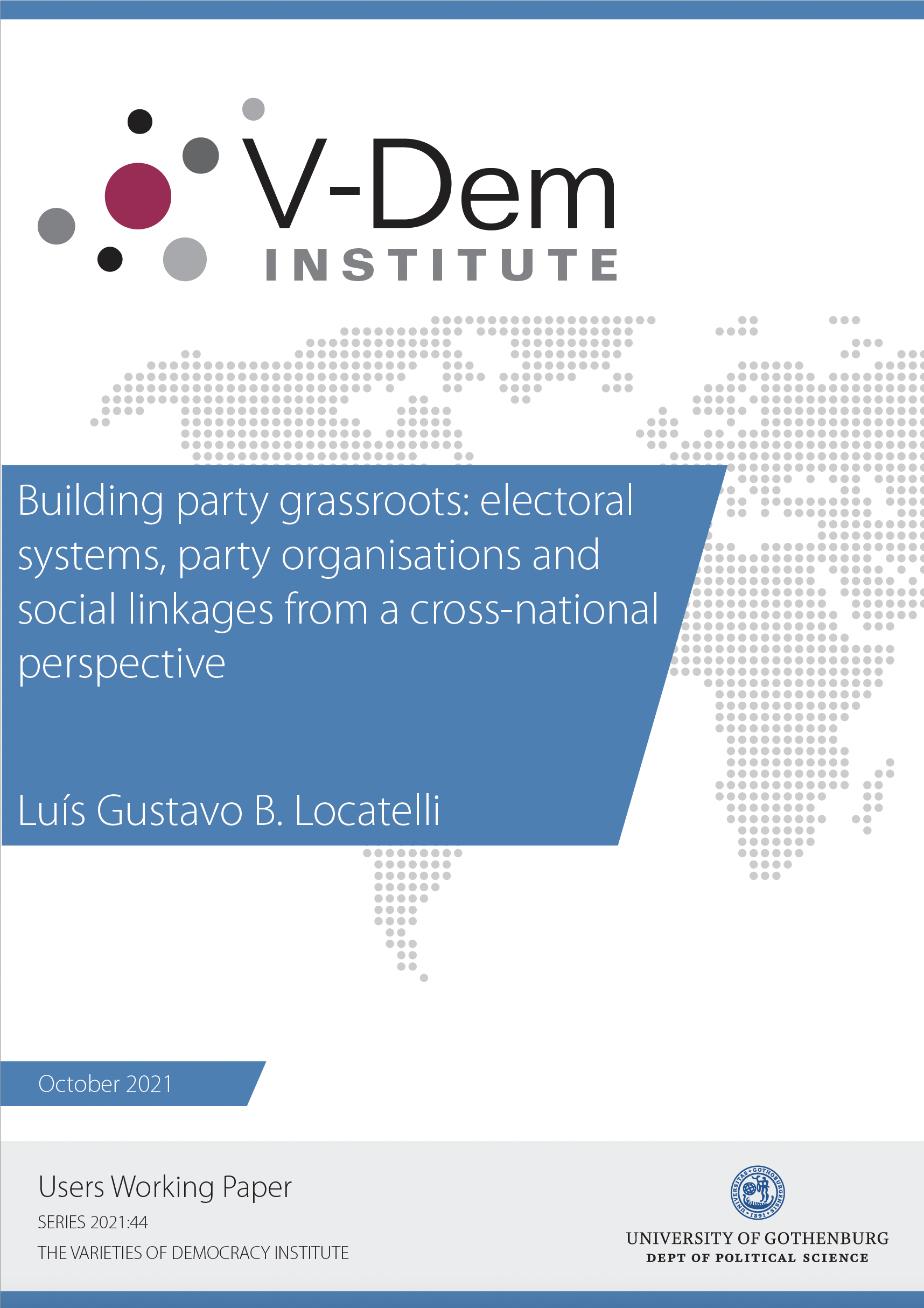
|
UWP #44 | Building party grassroots: electoral systems, party organisations and social linkages from a cross-national perspective | Luís Gustavo B. Locatelli | University of Gothenburg, Varieties of Democracy Institute: Users’ Working Paper No. 44. October 2021. |
The objective is to explore the connection between the proportional electoral system (PR) and party organisations as key institutional determinants for party-group linkages from cross-party, national, and temporal perspectives. Developing a nuanced framework, we propose an integrated model to address two questions: 1) Do candidate-centred electoral systems impact the development of party-society linkages? 2) If the electoral system has any impact, does it occur directly or mediated by party organisations? Using V-Party (2020) and V-Dem (2020) databases, we selected and analysed 617 parties in 48 countries covering third-wave democracies, post-communist countries, and the most extensive proportional democracies in Europe (Western and Eastern Europe) and Americas between 1989 and 2019 -- Large-N cross-national comparative analysis (Janda 1980). Based on panel models, we found that the candidate-centred electoral system is negatively related to developing strong ties between parties and groups, but only in party organisations with low party strength, intraparty cohesion, financial linkages with non-party groups. When the decision-making process concentrates power in the hands of powerful party elites, they can solve coordination problems and mitigate intraparty conflicts and personalisation consequences. Thereby, intraparty politics vary empirically, answering their contextual challenges (electoral rules) strategically, with solid consequences for party-group linkages.<br/> |
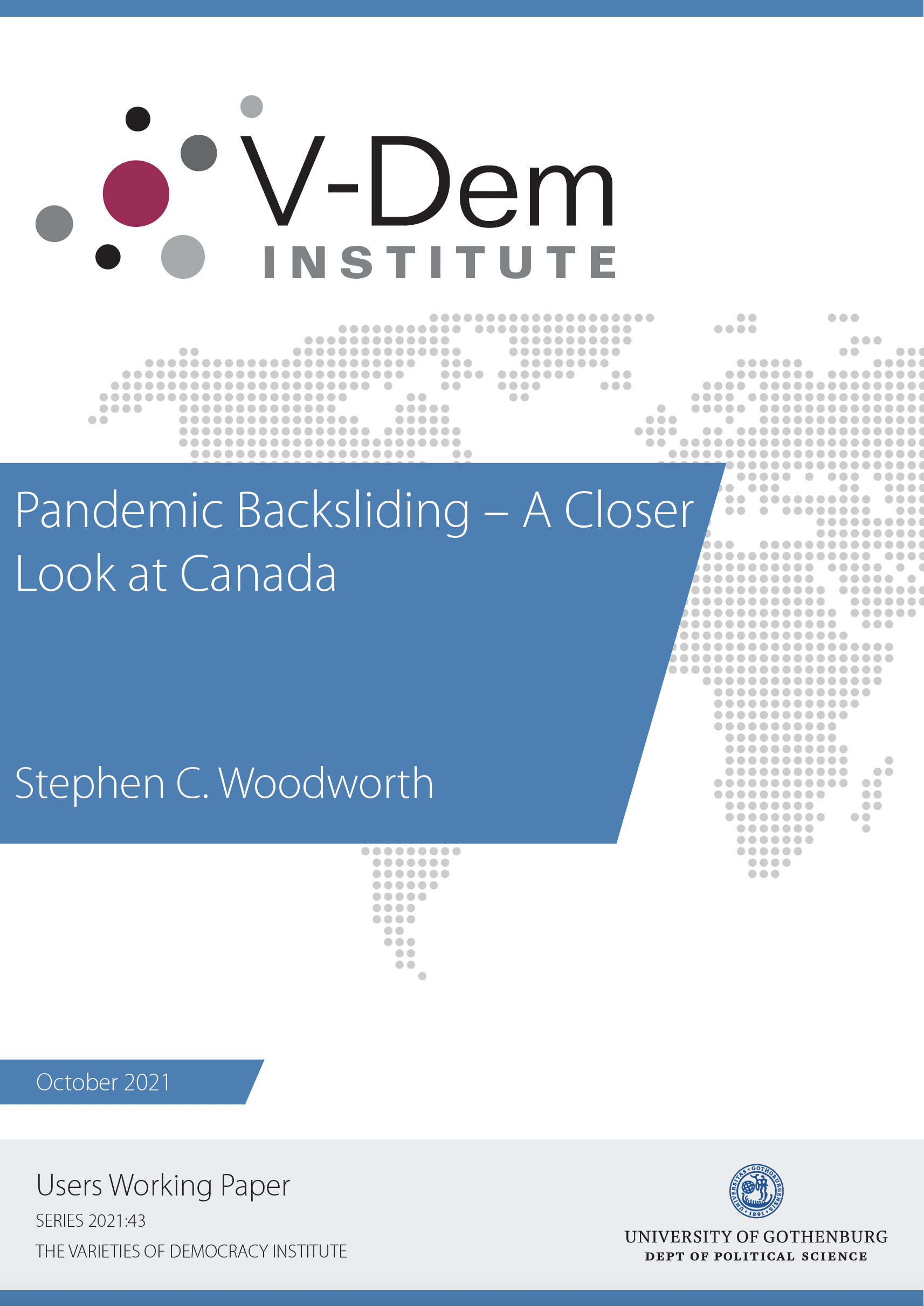
|
UWP #43 | Pandemic Backsliding – A Closer Look at Canada | Stephen C. Woodworth | University of Gothenburg, Varieties of Democracy Institute: Users’ Working Paper No. 43. October 2021. |
The author reviews the V-Dem data employed in assessing the impact in Canada of pandemic responses on democratic institutions, and proposes additional information which, if incorporated, would result in reclassification of Canada from “low risk” to “medium risk” of pandemic backsliding. Alternatively, a finer-grained examination is recommended.<br/> |
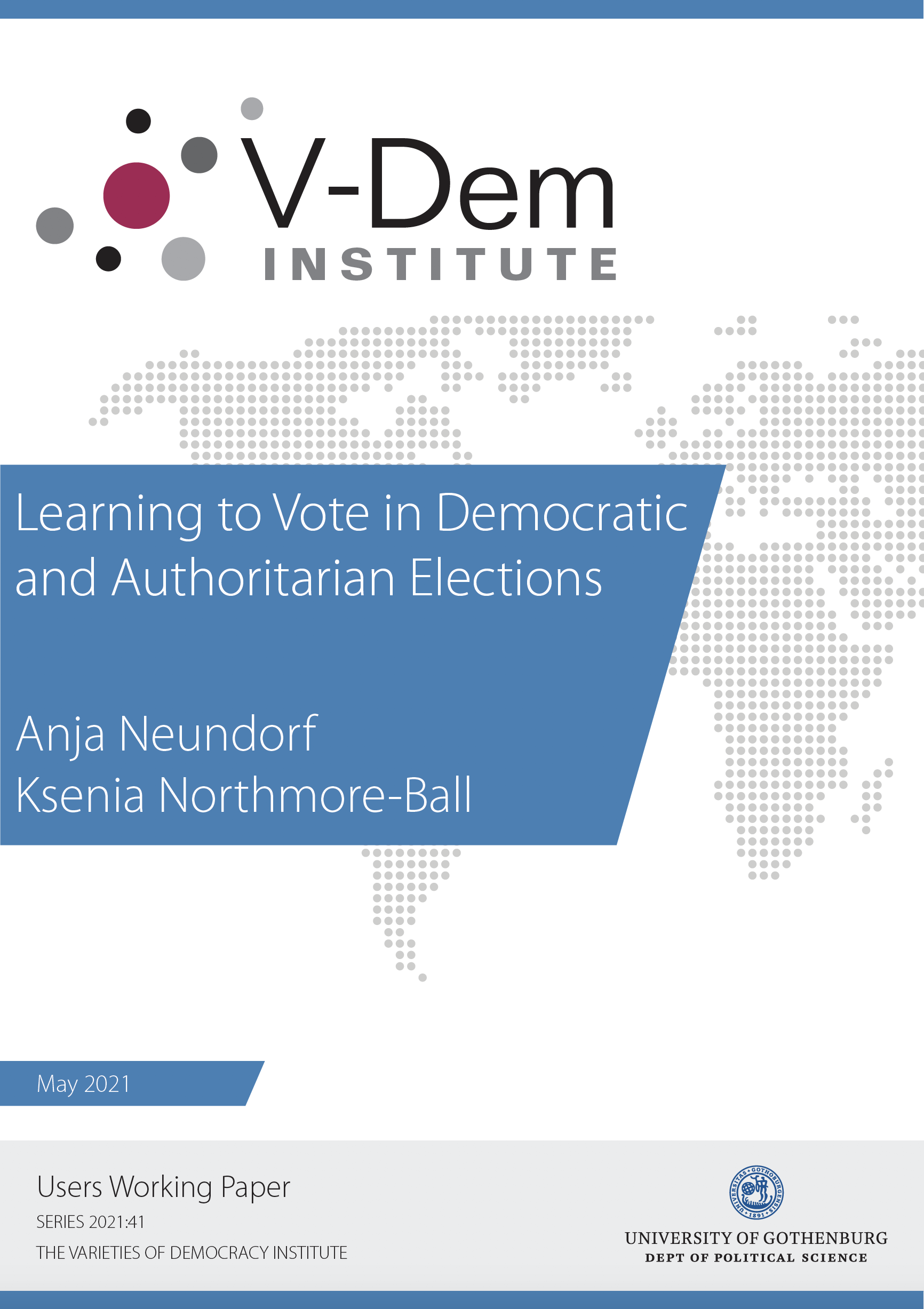
|
UWP #41 | Learning to Vote in Democratic and Authoritarian Elections | Anja Neundorf, Ksenia Northmore-Ball | University of Gothenburg, Varieties of Democracy Institute: Users’ Working Paper No. 41. May 2021. |
High levels of turnout are key to legitimacy in new democracies, ultimately con-tributing to their consolidation. However, little is known about the determinants of long-term electoral participation and the legacies of authoritarian elections. To investigate these legacies, we rely on socialization and institutional theories of turnout, which have not been tested in authoritarian settings. To test our ex-pectations, we rely on newly harmonized public opinion data covering over 106 countries from 1975 to 2015, estimating generational differences in turnout. We show that the opportunity to participate in elections in the formative years posi-tively affects later-life turnout. This finding is further confirmed using a design-based difference-in-difference approach, utilizing female suffrage in Greece as an identification strategy. However, the impact of these early opportunities on long-term habitual voting is conditional on the level of contestation of the elec-tions experienced. Low levels of electoral competition, typical in authoritarian elections, can create jaded voters.<br/> |
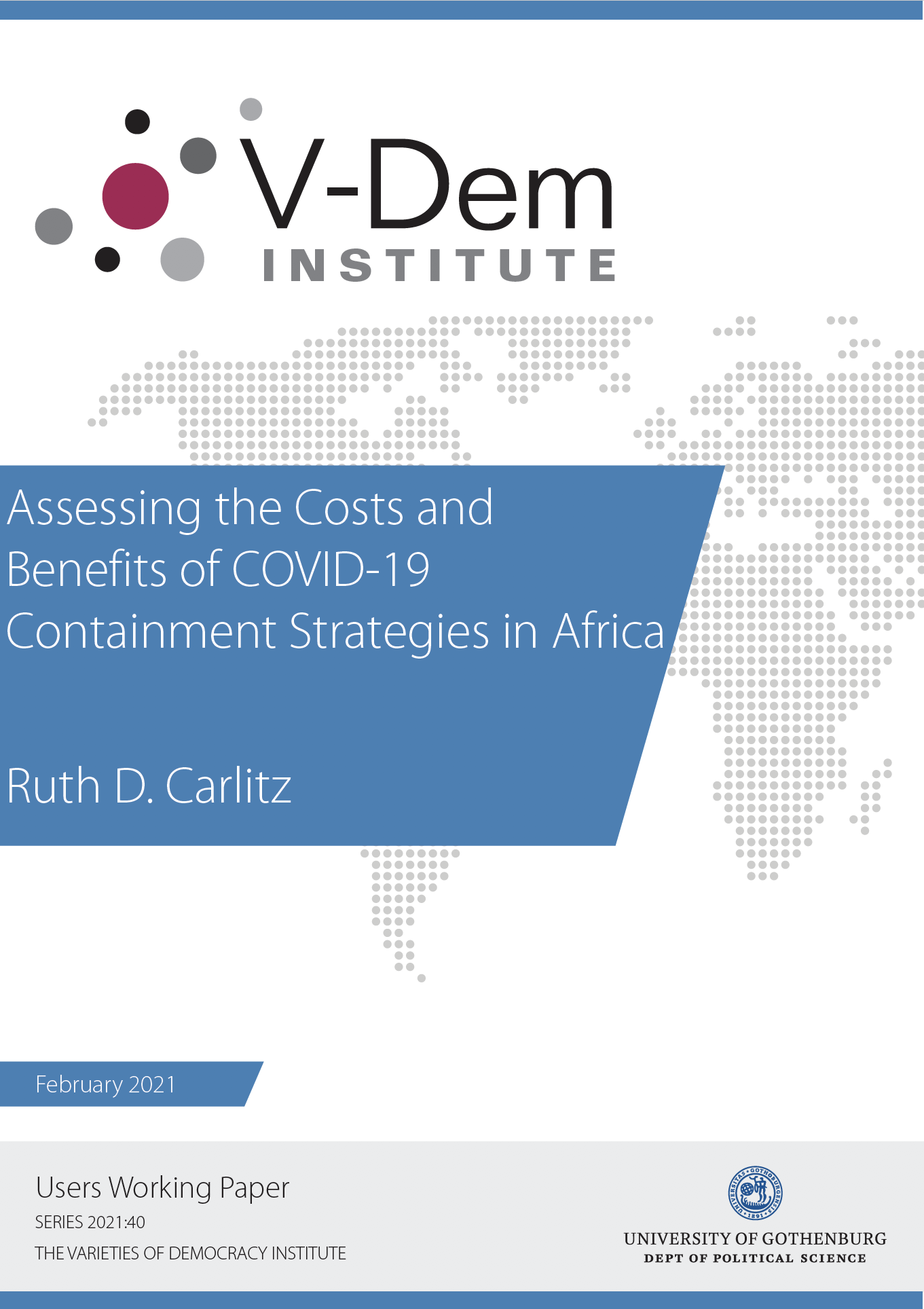
|
UWP #40 | Assessing the Costs and Benefits of COVID-19 Containment Strategies in Africa | Ruth D. Carlitz | University of Gothenburg, Varieties of Democracy Institute: Users’ Working Paper No. 40. February 2021. |
This paper explores the extent of variation in African countries’ responses to the COVID-19 pandemic, as-sessing the relative success of di˙erent strategies in containing the spread of disease as well as the costs con-tainment strategies have entailed. I begin by examining the range of responses taken by di˙erent African governments, looking at the consequences for population mobility and spread of infection during the ÿrst seven months of the pandemic (March-September 2020). Using anonymized mobile phone data, I show that mobility reductions were signiÿcantly greater in countries where the government enacted more stringent measures. Statistical regression analysis indicates that such mobility reductions are signiÿcantly and negatively associated with COVID-19 growth rates two weeks later. However, the success of lock-down policies in containing the spread of disease came at a signiÿcant cost in many countries, including severe economic contraction, disruptions to essential services, and curtailing of human rights. That said, such costs do not appear to be a necessary result of enacting stringent measures. Cross-country analysis reveals a number of cases where governments acted swiftly and seriously to contain the spread of disease but did not su˙er major economic or governance consequences. Highlighting the experiences of such countries is important for drawing lessons about best practices for continued management of COVID-19 and future outbreaks.<br/> |
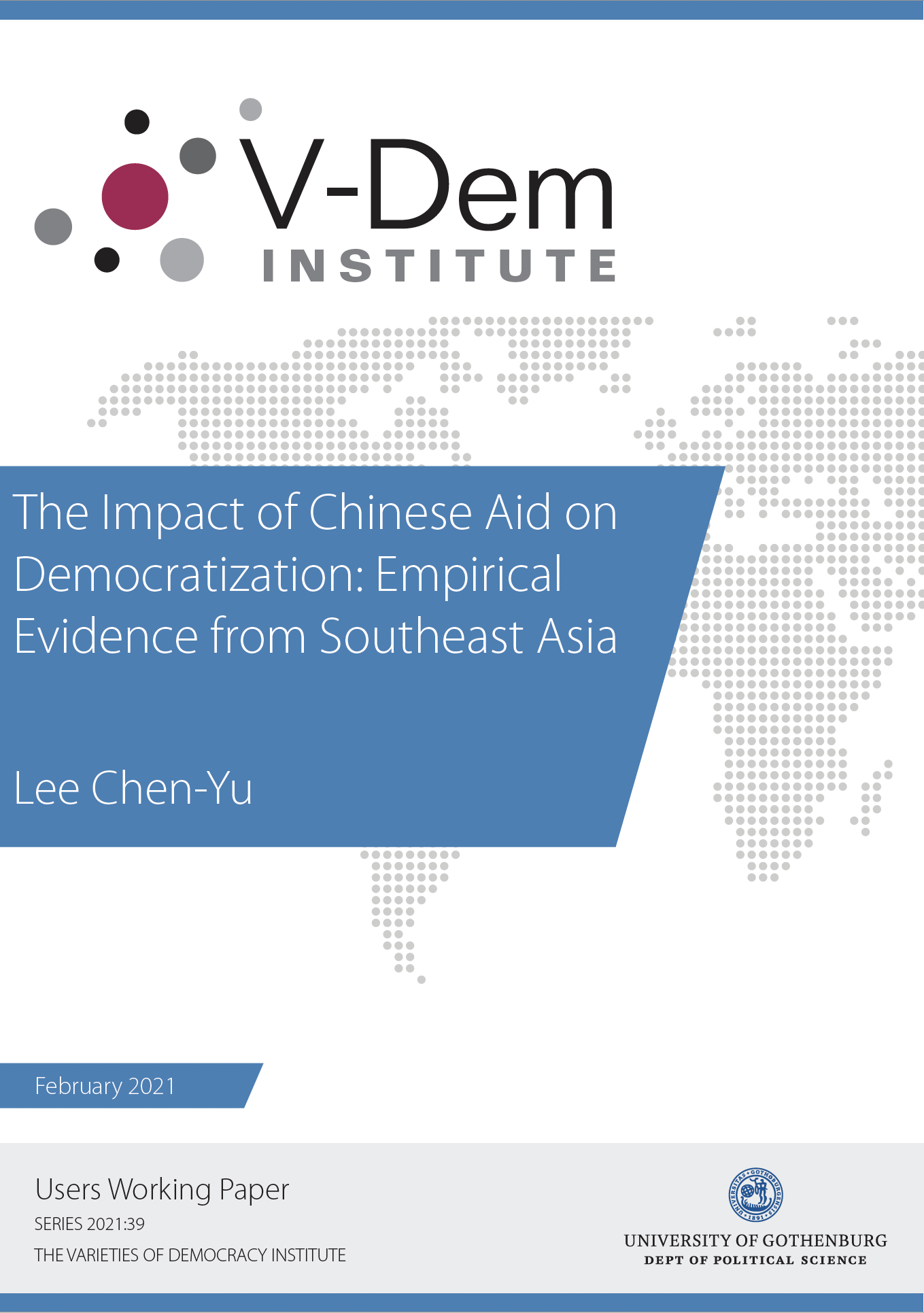
|
UWP #39 | The Impact of Chinese Aid on Democratization: Empirical Evidence from Southeast Asia | Lee Chen-Yu | University of Gothenburg, Varieties of Democracy Institute: Users’ Working Paper No. 39. February 2021. |
It has been argued that the “unconditional” nature of Chinese development aid causes deleterious effects on institutional quality in recipient countries. This article focuses on Southeast Asia to investigate the political impact of Chinese developmental aid. I argue that the effect of Chinese aid is conditional on regime types of recipient countries. Specifically, Chinese aid should intensify repression in closed autocracies but reinforce electoral manipulation in electoral autocracies. Moreover, I propose a nonlinear effect of Chinese aid in electoral autocracies as overdependence on Chinese aid could instigate anti-China sentiment, which arouses civil mobilization against the government and increases the likelihood of democratization. My identification strategy exploits time variation of Chinese steel production and cross-sectional variation of the probability to receive aid from China to construct instruments of Chinese aid reception. Overall, I find weak evidence of a Chinese “political aid curse” in Southeast Asia.<br/> |
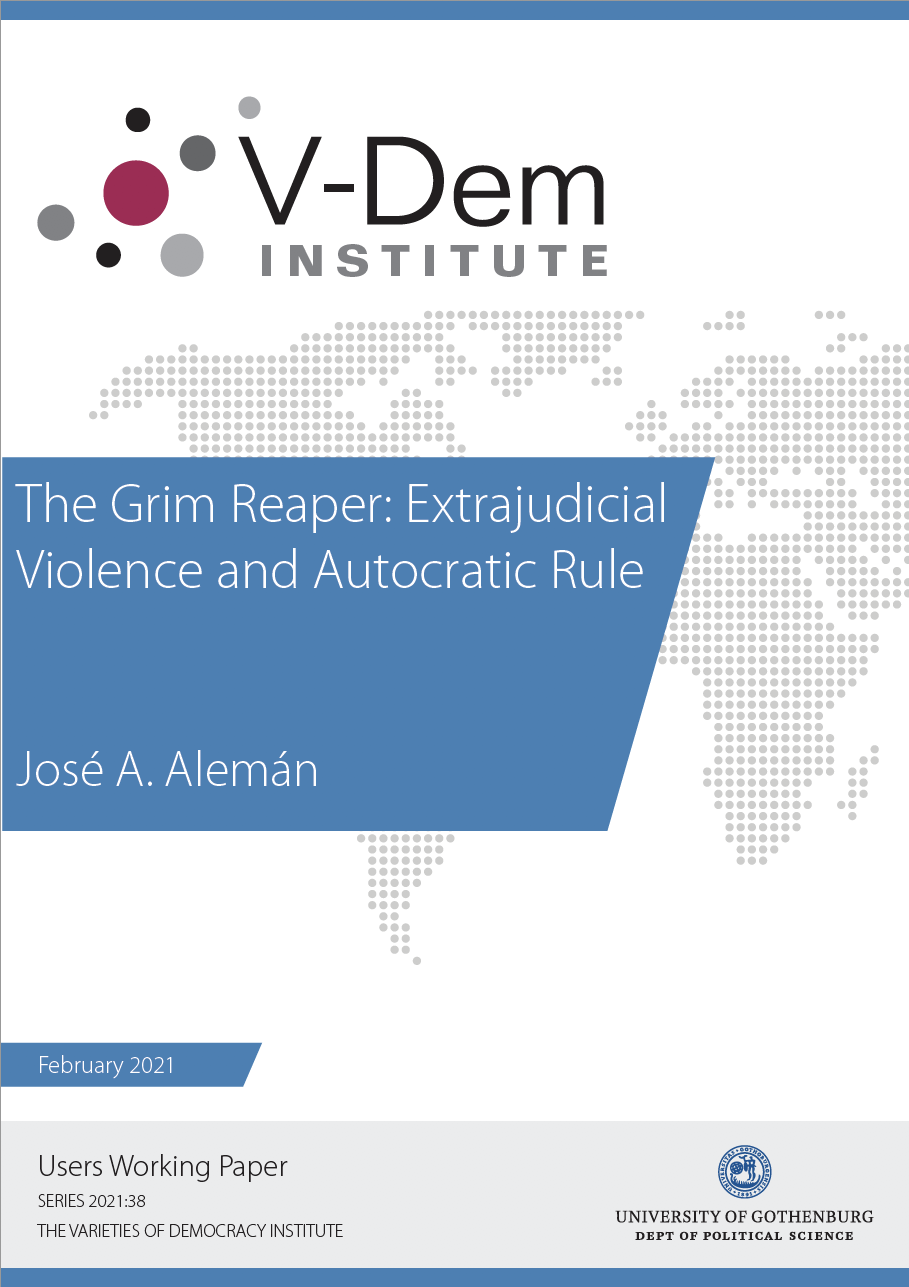
|
UWP #38 | The Grim Reaper: Extrajudicial Violence and Autocratic Rule | José A. Alemán | University of Gothenburg, Varieties of Democracy Institute: Users’ Working Paper No. 38. February 2021. |
What makes some authoritarian regimes more willing to employ extrajudicial violence, as opposed to relying on more conventional forms of repression? A voluminous literature exists on the causes, dynamics, and consequences of state repression. To date, however, scholars have not systematically explained one variety of repression, extrajudicial violence. I distinguish between generic repression (limits on the civil and political rights of citizens), and state terrorism – when the regime intimidates its political opponents using extrajudicial violence. I examine the relationship between the two in a conditional mixed process modelling framework for 121 countries (1946-2010). My analysis reveals that communist dictatorships repress the freedoms of expression, travel, and association, but military dictatorships engage in extrajudicial violence. The study contributes to the literature by providing an institutional account of why power is used and for what ends differently in these two regime types, and by modelling different types of repression simultaneously.<br/> |
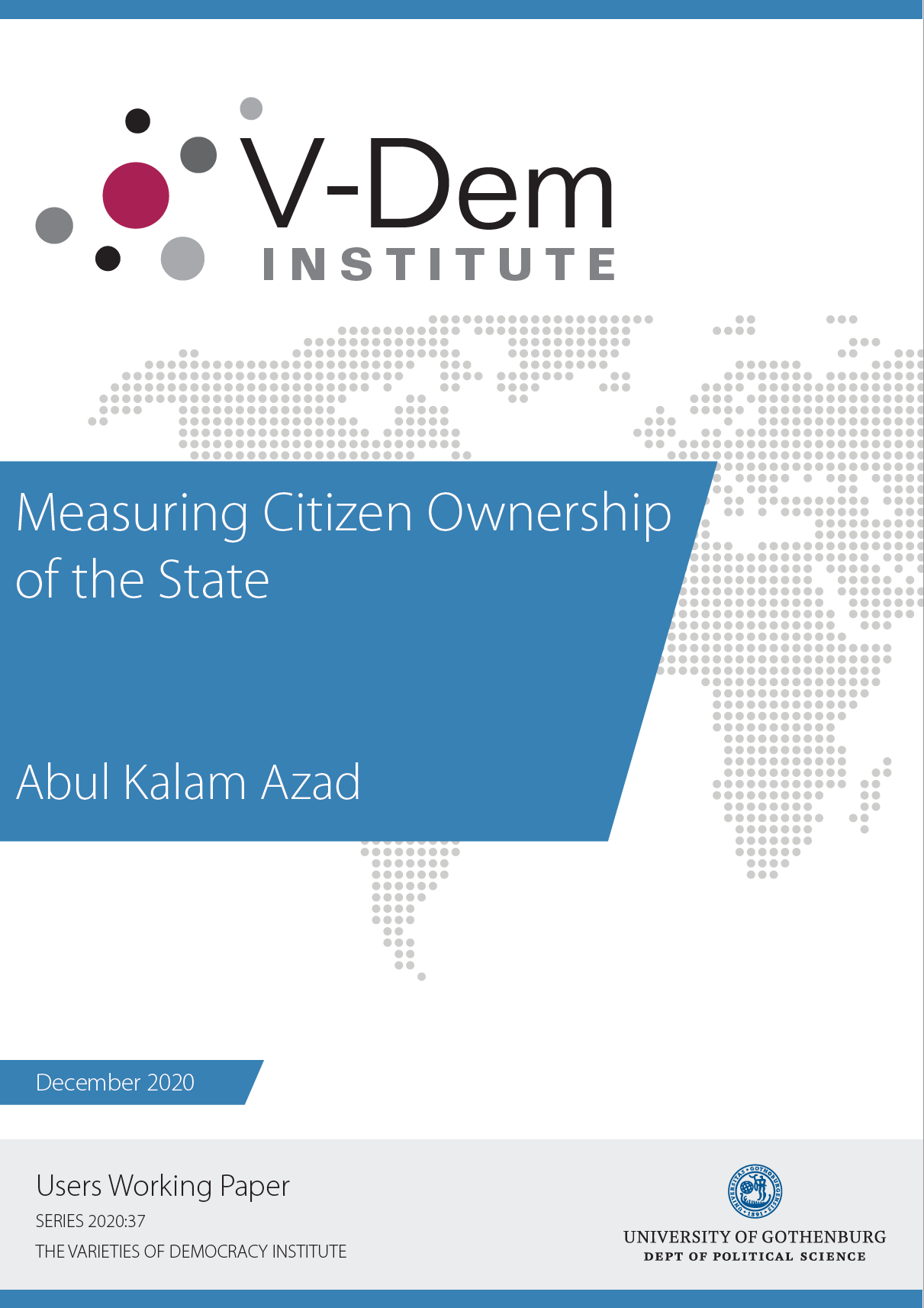
|
UWP #37 | This paper has been removed upon the author’s request. For any questions, please contact the author directly. | This paper has been removed upon the author’s request. For any questions, please contact the author directly. | ||
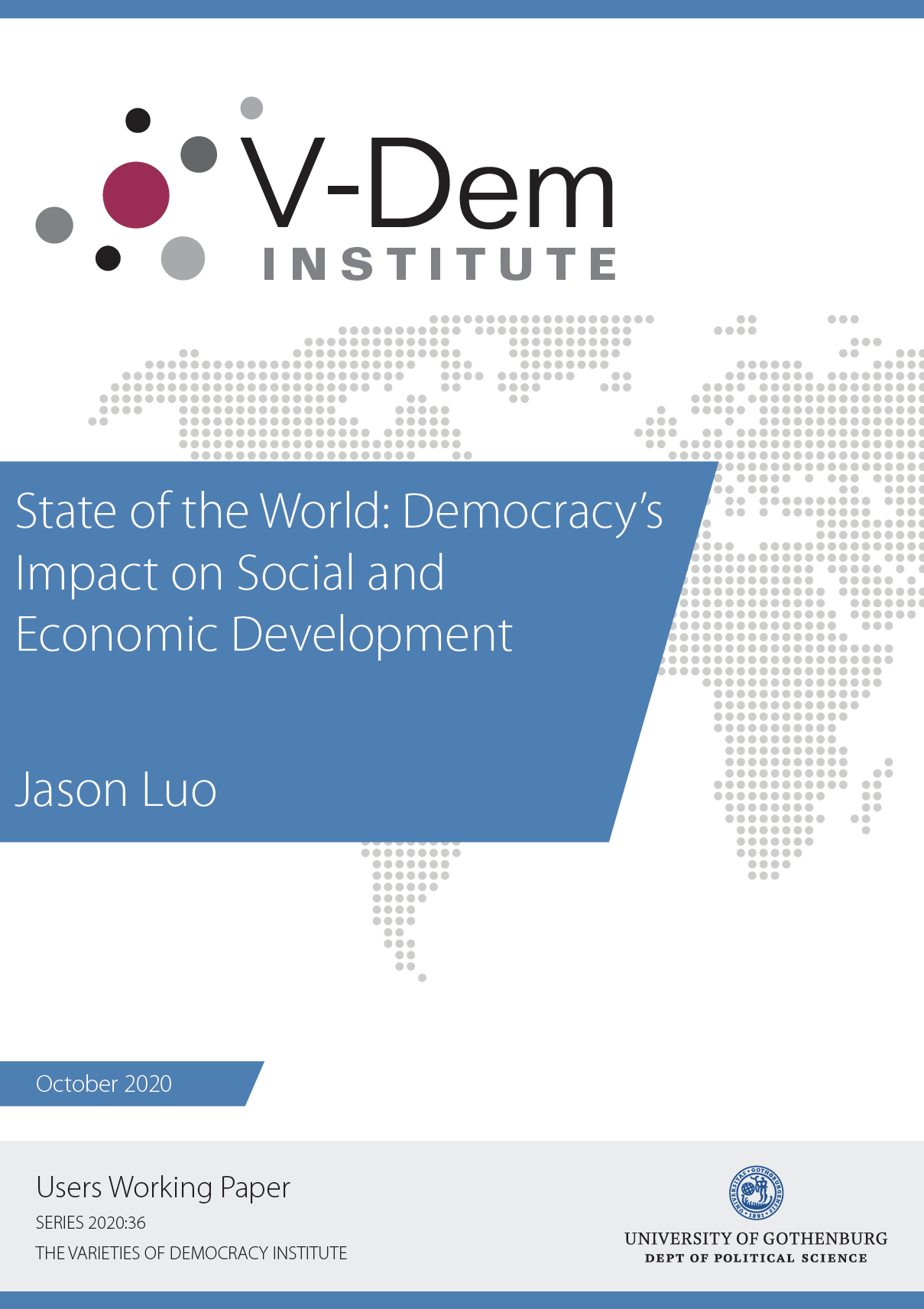
|
UWP #36 | State of the World: Democracy’s Impact on Social and Economic Development | Jason Luo | University of Gothenburg, Varieties of Democracy Institute: Users’ Working Paper No. 36. October 2020. |
There is an undisputed correlation between a country’s form of government and its social and economic growth. Unfortunately, government is difficult to measure categorically (e.g. simply Democracy vs Autocracy), and the relationship of causality between these factors is complex. Using multi-dimensional political and social-economic data, along with statistics and machine learning, this study analyzes the democracy and development of 48 countries around the world over the past 40 years. Highly democratic countries were strongly correlated with robust and forward-thinking economies. Countries with weaker democracies were less predictable in terms of social-economic outlook. A stable autocracy like China can sustain high growth into 2030 while a country trending towards democracy can stagnate. The highest rates of social-economic growth were most likely to occur during periods of political stability rather than democratization. Democracies may have higher social-economic ceilings, but stability has a greater impact on growth.<br/><br/> |
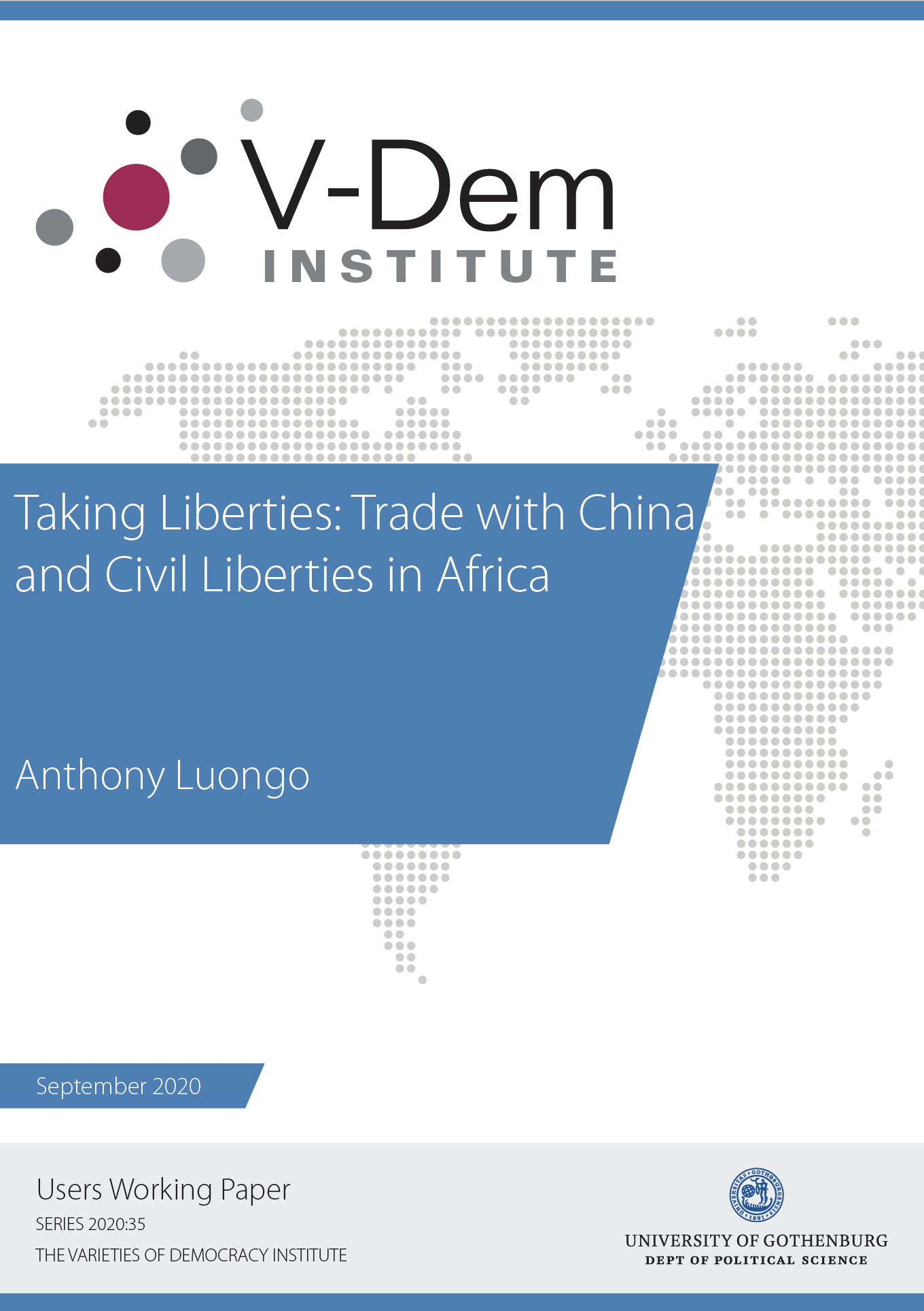
|
UWP #35 | Taking Liberties: Trade with China and Civil Liberties in Africa | Anthony Luongo | University of Gothenburg, Varieties of Democracy Institute: Users’ Working Paper No. 35. September 2020. |
In this paper, I address the impact of China’s trade on civil liberties in African states during the period 1992-2016. China’s growing economic involvement in African countries has drawn concern from Western policymakers and scholars, who contend that China’s activities threaten African democratization and political and economic independence. I argue that the unconditional nature of partnership with China (as opposed to the somewhat conditional nature of Western engagement) allows authoritarian leaders to avoid liberalizing civil liberties conditions in their country without concerns about access to funds. Using Time-Series-Cross-Section analysis, I find that countries more dependent on trade with China are less likely to improve their protect on of civil liberties, but no more likely to experience decline in civil liberties. This article contributes to the growing authoritarian diffusion literature and provides nuance to the typically oversimplified discussion of Chinese engagement with Africa.<br/><br/> |
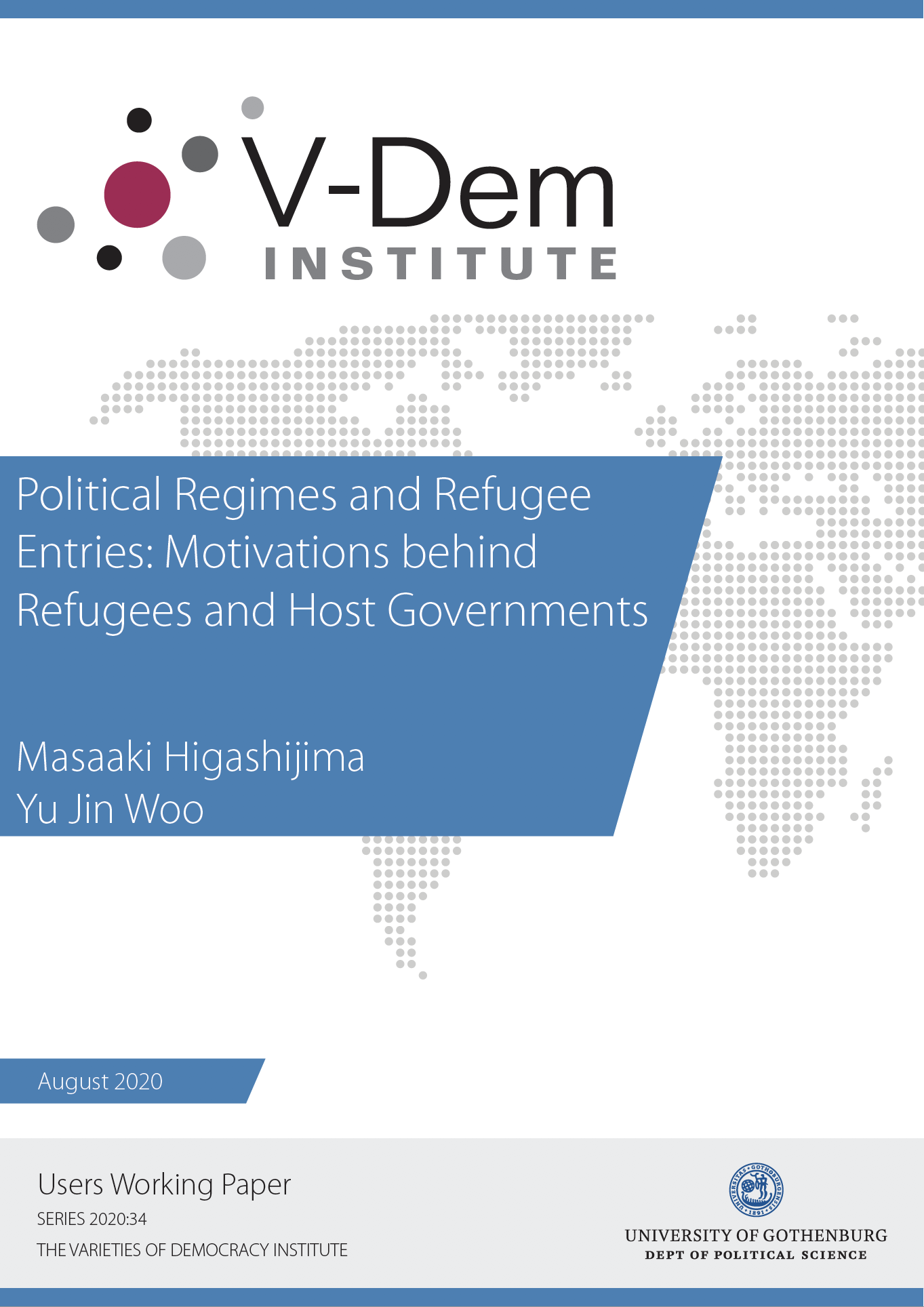
|
UWP #34 | Political Regimes and Refugee Entries: Motivations behind Refugees and Host Governments | Masaaki Higashijima, Yu Jin Woo | University of Gothenburg, Varieties of Democracy Institute: Users’ Working Paper No. 34. August 2020. |
What drives refugee movements? Focusing on host countries’ domestic conditions, we argue that refugee entry is determined by their political regimes that shape the incentives of both host governments and refugees. Specifically, we theorize that there is an inverted U-shaped relationship between political regimes and the volume of refugees. When a host country is highly autocratic, refugee volume turns small, because refugees are less willing to enter those countries due to uncertainty over post-entry treatment; when host countries are highly democratic, refugee volume decreases again, because democratic leaders are constrained by negative public opinion toward refugees. Using a global data set (143 countries, 1951-2016), we perform a series of statistical analyses and find strong evidence in support of our theoretical expectations. We also test implications on the preferences of both refugees and host governments, demonstrating that democracies attract a larger number of refugee-status applications, yet these countries are less likely to confer formal refugee status to asylum-seekers.<br/><br/> |
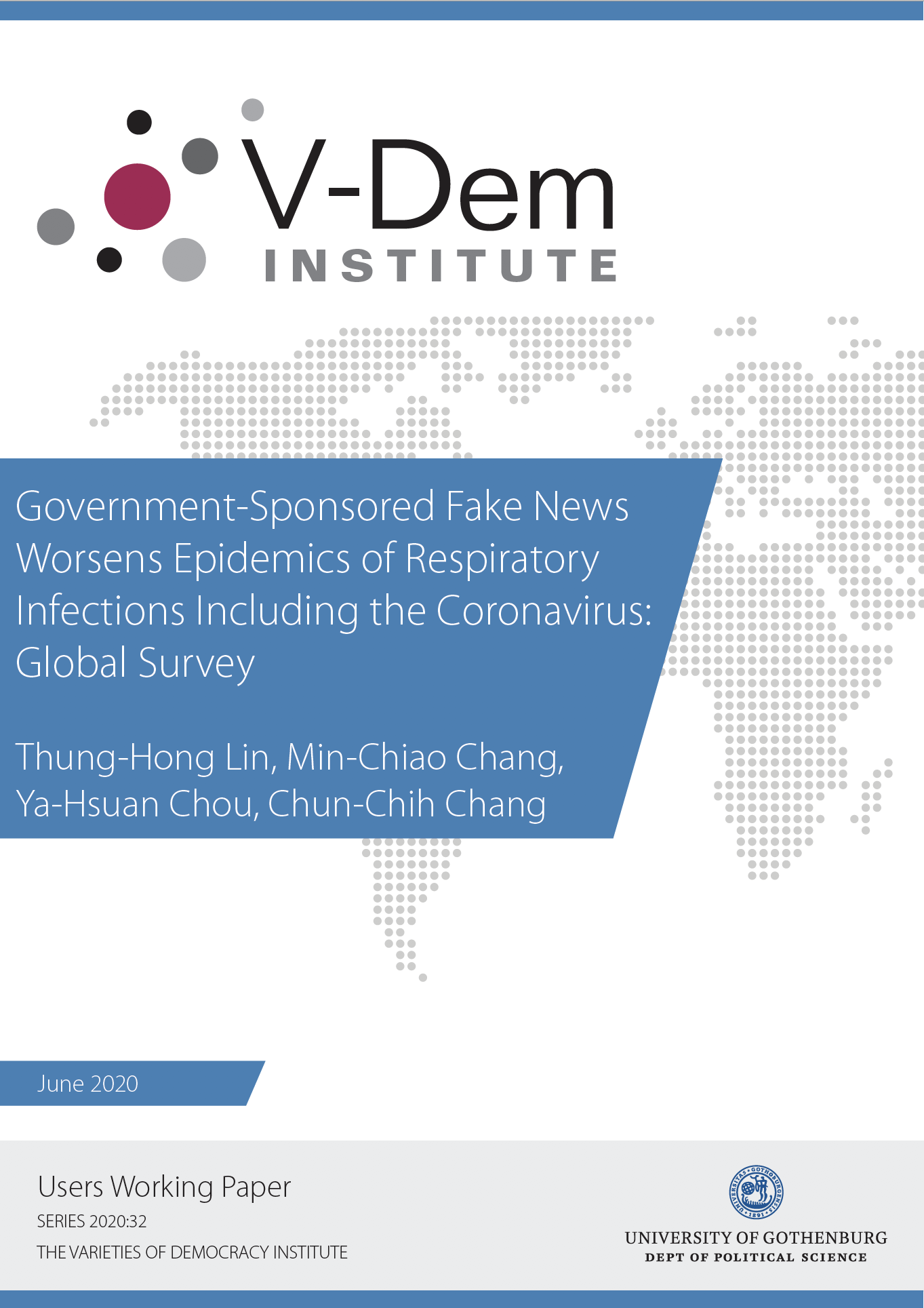
|
UWP #32 | Government-Sponsored Fake News Worsens Epidemics of Respiratory Infections Including the Coronavirus: Global Survey | Thung-Hong Lin, Min-Chiao Chang, Ya-Hsuan Chou, Chun-Chih Chang | University of Gothenburg, Varieties of Democracy Institute: Users’ Working Paper No. 32. June 2020. |
The growth of the coronavirus disease 2019 (COVID-19) pandemic has prompted some government-sponsored Internet disinformation campaigns. We assumed that government-sponsored disinformation may deteriorate infectious disease epidemics through three mechanisms: ineffective coping, institutional distrust, and stigma avoidances. By employing global surveys across 144 countries for the period 2000–2017, we examined the association between government-sponsored disinformation and the spread of respiratory infections before the COVID-19 outbreak. After controlling for climatic, public health, socioeconomic, and political factors, we observed that government-sponsored disinformation significantly increased the incidence, prevalence, and death percentages of respiratory infections in populations. These empirical results thus deliver a warning: To contain the damage from pandemics, governments must immediately stop sponsoring disinformation campaigns. Because these respiratory infections share a common transmission pathway with COVID-19, our findings shed light on the mechanisms through which information environments play a major role in the management of modern pandemics.<br/><br/> |
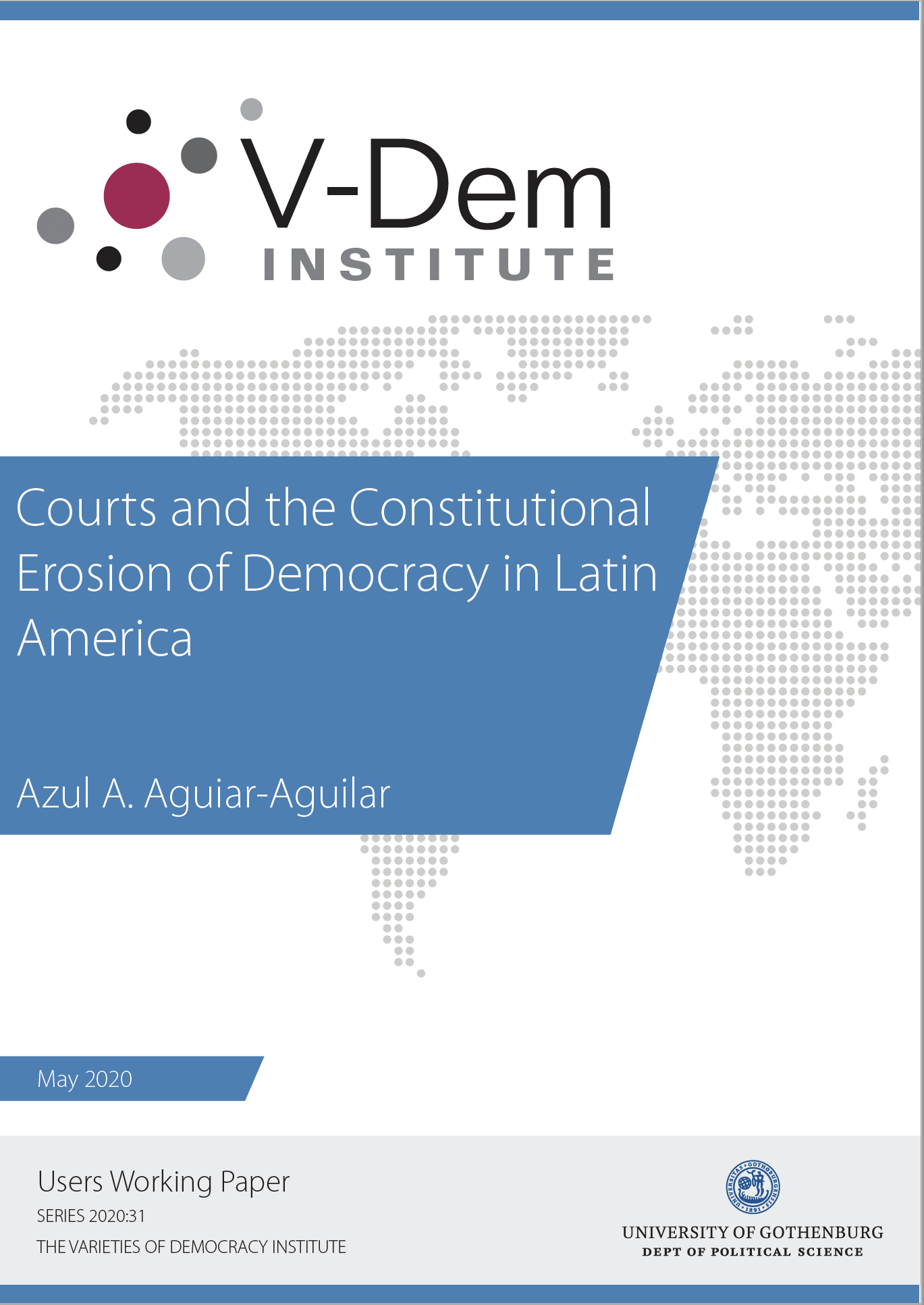
|
UWP #31 | Courts and the Constitutional Erosion of Democracy in Latin America | Azul A. Aguiar-Aguilar | University of Gothenburg, Varieties of Democracy Institute: Users’ Working Paper No. 31. May 2020. |
In constitutional democracies, courts are becoming a beloved device of incumbents to make their dream come true: remain unchecked in power. Playing by the rules set in the democratic game, elected anti-democrats use their power to erode democracy by capturing electoral management bodies, extending term limits, harassing journalism or shifting power from the legislative to the executive. What is the role of courts in this tale? Independent and empowered courts are a blockage to elected anti-democrats who seek to control other institutions with a veneer of legality. Thus, instead of unlawfully increasing their share of power, elected anti-democrats choose to capture high courts to pave their way in changing the rules of the game. With the court on their side, the constitutionality of their undemocratic moves is undisputed. Here starts democratic erosion.<br/><br/> |
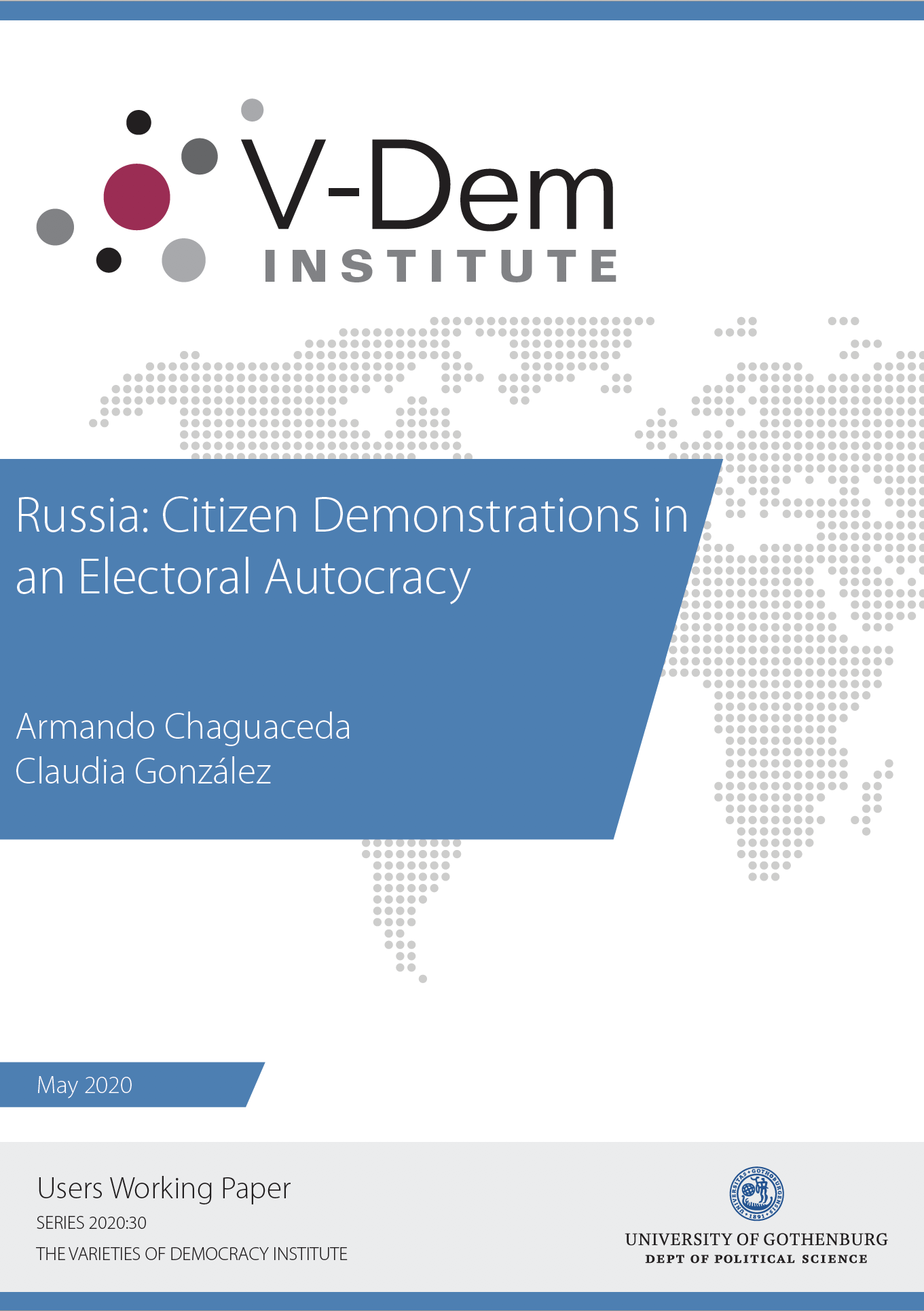
|
UWP #30 | Russia: Citizen Demonstrations in<br/><br/>an Electoral Autocracy | Armando Chaguaceda, Claudia González | University of Gothenburg, Varieties of Democracy Institute: Users’ Working Paper No. 30. May 2020. |
Last summer, Moscow was the scenario for the major political demonstrations ever since the broad circle of protests from 2011 to 2012. The mobilizations erupted from the blockade of the authorities to the registration of opposition candidates for the local elections in Moscow. As completion of a series of citizen protests, spread throughout the country for different causes –the project to build a church in a public park in Yekaterinburg, the settlement of a garbage dump in Arkhangelsk, the reform of the pension system, the imprisonment of journalist Ivan Golunov– these actions represented a modest but real challenge to the political regime. Which context, development and possible implications we propose to analyze below in closed relation with the nature of “managed democracy” methods within Russia’s regime of electoral autocracy, as well as the upgrading of technological tools towards both consequences: political pluralism and civic practice´s constrain.<br/><br/> |
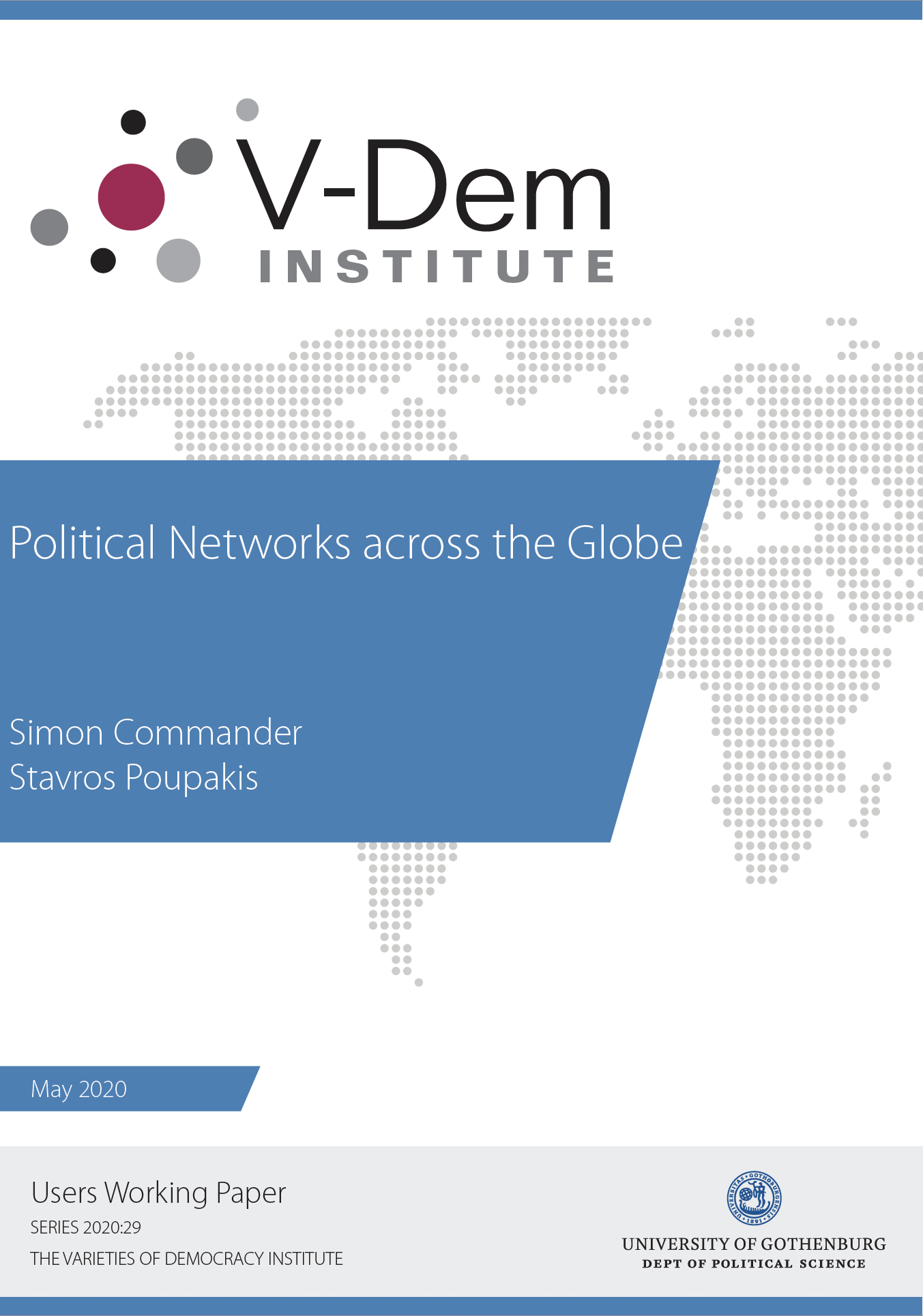
|
UWP #29 | Political Networks across the Globe | Simon Commander, Stavros Poupakis | University of Gothenburg, Varieties of Democracy Institute: Users’ Working Paper No. 29. May 2020. |
Political networks are an important feature of the political and economic landscape of countries. Despite their ubiquity and significance, information on such networks has proven hard to collect due to a pervasive lack of transparency. However, with the advent of big data and artificial intelligence, major financial services institutions are now actively collating publicly available information on politically exposed persons and their networks. In this study, we use one such data set to show how network characteristics vary across political systems. We provide results from more than 150 countries and show how the format of the network tends to reflect the extent of democratisation of each country. We also outline further avenues for research using such data.<br/><br/> |
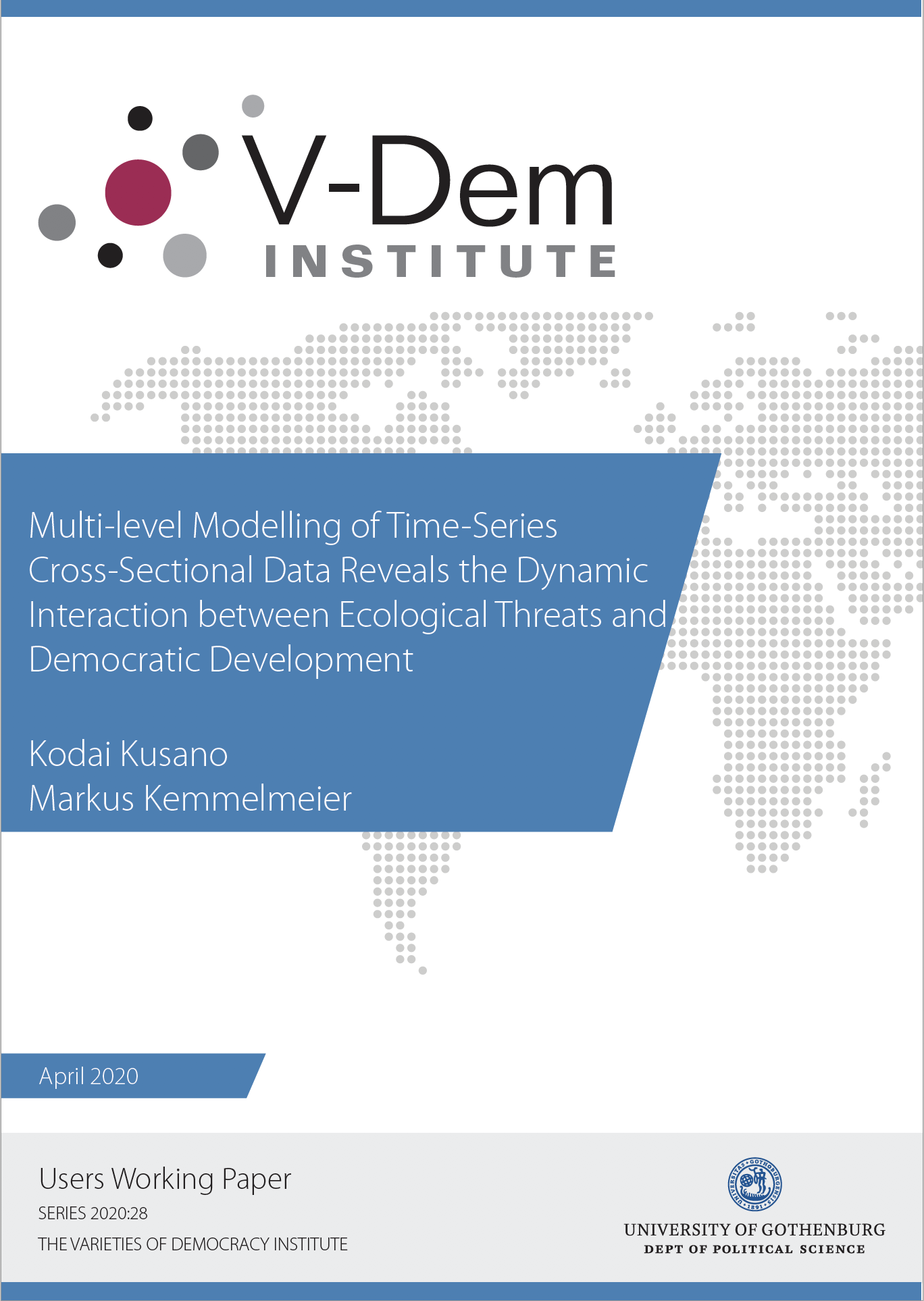
|
UWP #28 | Multi-level Modelling of Time-Series Cross-Sectional Data Reveals the Dynamic Interaction between Ecological Threats and Democratic Development | Kodai Kusano, Markus Kemmelmeier | University of Gothenburg, Varieties of Democracy Institute: Users’ Working Paper No. 28. April 2020. This paper has originally been published at Royal Society Open Science. |
What is the relationship between environment and democracy? The framework of cultural evolution suggests that societal development is an adaptation to ecological threats. Pertinent theories assume that democracy emerges as societies adapt to ecological factors such as higher economic wealth, lower pathogen threats, less demanding climates and fewer natural disasters. However, previous research confused within-country processes with between-country processes and erroneously interpreted between-country findings as if they generalize to within-country mechanisms. We analyse a time-series cross-sectional dataset to study the dynamic relationship between environment and democracy (1949–2016), accounting for previous misconceptions in levels of analysis. By separating within-country processes from between-country processes, we find that the relationship between environment and democracy not only differs by country but also depends on the level of analysis. Economic wealth predicts increasing levels of democracy in between-country comparisons, but within-country comparisons show that democracy declines in years when countries become wealthier. This relationship is only prevalent among historically wealthy countries but not among historically poor countries, whose wealth also increased over time. By contrast, pathogen prevalence predicts lower levels of democracy in both between country and within-country comparisons. Multi-level modelling also confirms that the within country effect of pathogen prevalence remains robust even after considering a region-level analysis. Longitudinal analyses identifying temporal precedence reveal that not only reductions in pathogen prevalence drive future democracy, but also democracy reduces future pathogen prevalence and increases future wealth. These nuanced results contrast with previous analyses using narrow, cross-sectional data. Overall, our findings illuminate the dynamic process by which environment and democracy shape each other.<br/><br/> |
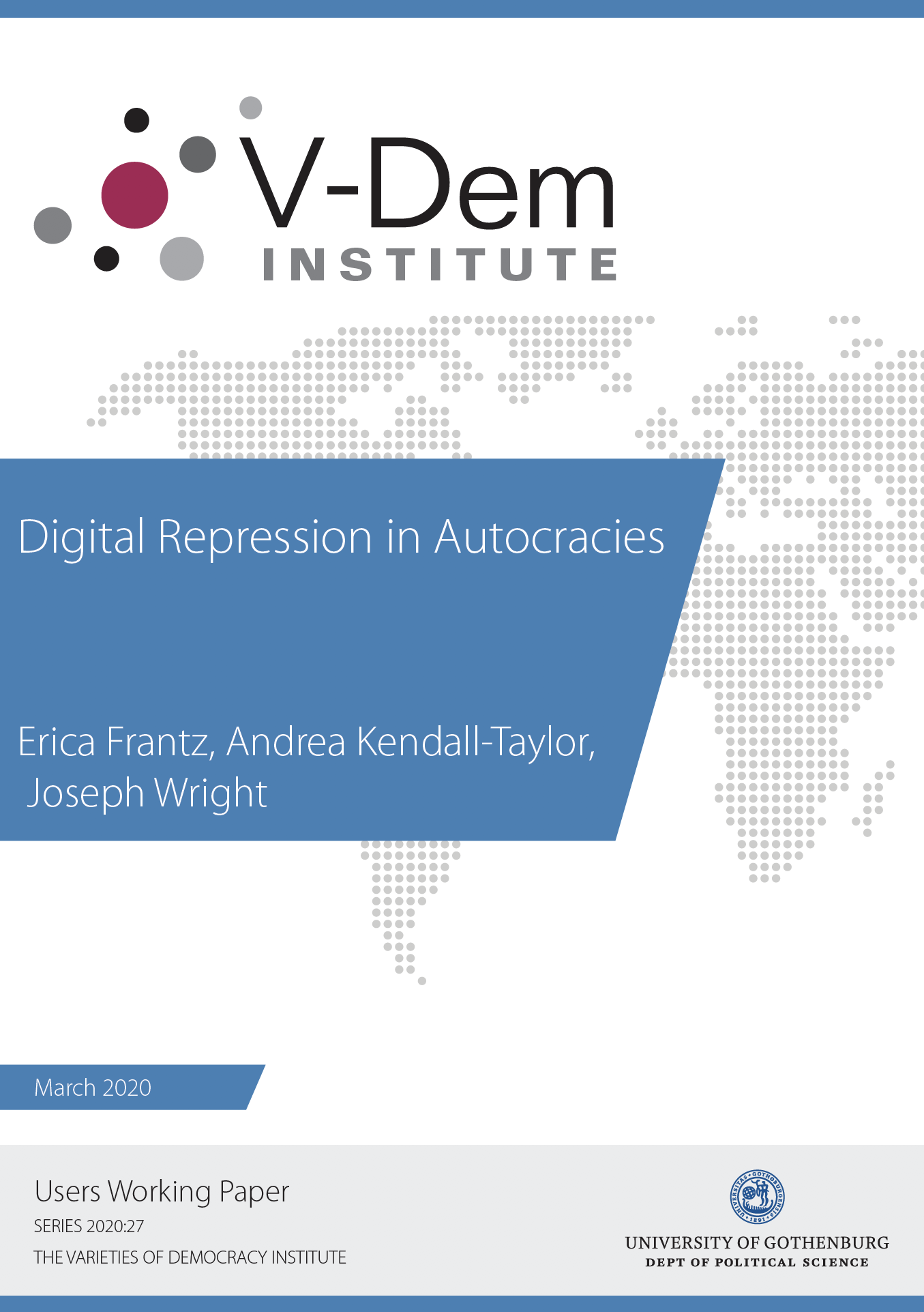
|
UWP #27 | Digital Repression in Autocracies | Erica Frantz, Andrea Kendall-Taylor, Joseph Wright | University of Gothenburg, Varieties of Democracy Institute: Users’ Working Paper No. 27. March 2020. |
The rise of the digital age initially spread optimism about the potential for democratic change. Those hopes were soon dashed, however, as autocracies learned how to use digital tools to further their interests. In this paper, we leverage data from the Digital Society Project to illustrate a number of important trends with respect to the use of digital repression in autocracies. First, and not surprisingly, we show that reliance on digital repression in dictatorships is on the rise; more dictatorships use digital repression than ever before. The evidence shows that they are wise to do so. We find that digital repression lowers the risk of protest in dictatorships. Importantly, we also find that dictatorships are using digital repression in tandem with more "high-intensity" forms of repression. This suggests that digital repression is not serving as a substitute for more brute repressive acts, but instead as a complement to them. Lastly, we find that some evidence that digital repression is associated with more durable dictatorship. This ending is both relatively small and statistically insigniffcant in the relatively short panel series, however.<br/><br/> |
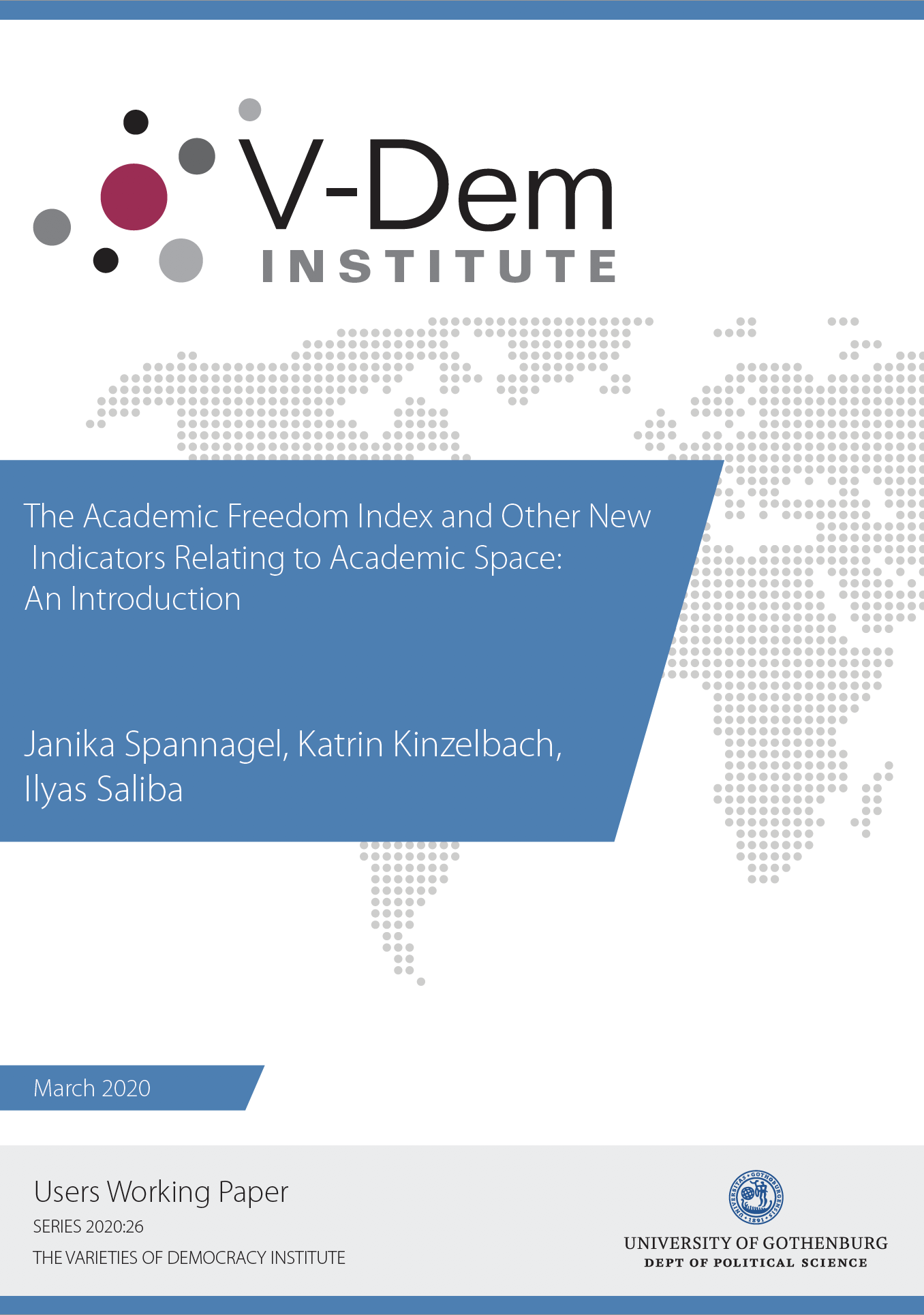
|
UWP #26 | The Academic Freedom Index and Other New Indicators Relating to Academic Space: An Introduction | Janika Spannagel, Katrin Kinzelbach, Ilyas Saliba | University of Gothenburg, Varieties of Democracy Institute: Users’ Working Paper No. 26. March 2020. A modified version of this paper is published as: Spannagel, J., Kinzelbach, K. The Academic Freedom Index and Its indicators: Introduction to new global time-series V-Dem data. Qual Quant 57, 3969–3989 (2023). https://doi.org/10.1007/s11135-022-01544-0 |
The Academic Freedom Index is the first conceptually thorough assessment of academic freedom worldwide and dates back to 1900. While some previous datasets exist, they are geographically limited and methodologically or conceptually insufficient to offer a comprehensive picture of the levels of academic freedom across time and space. This users’ working paper introduces the new dataset, including the Academic Freedom Index, discusses its advantages compared to other types of data, details the conceptualization of the new indicators, and offers a content and convergent validation of the results. The new dataset provides ample opportunities for policymakers, advocates and scholars to monitor and analyze patterns and trends of academic freedom around the world.<br/><br/> |
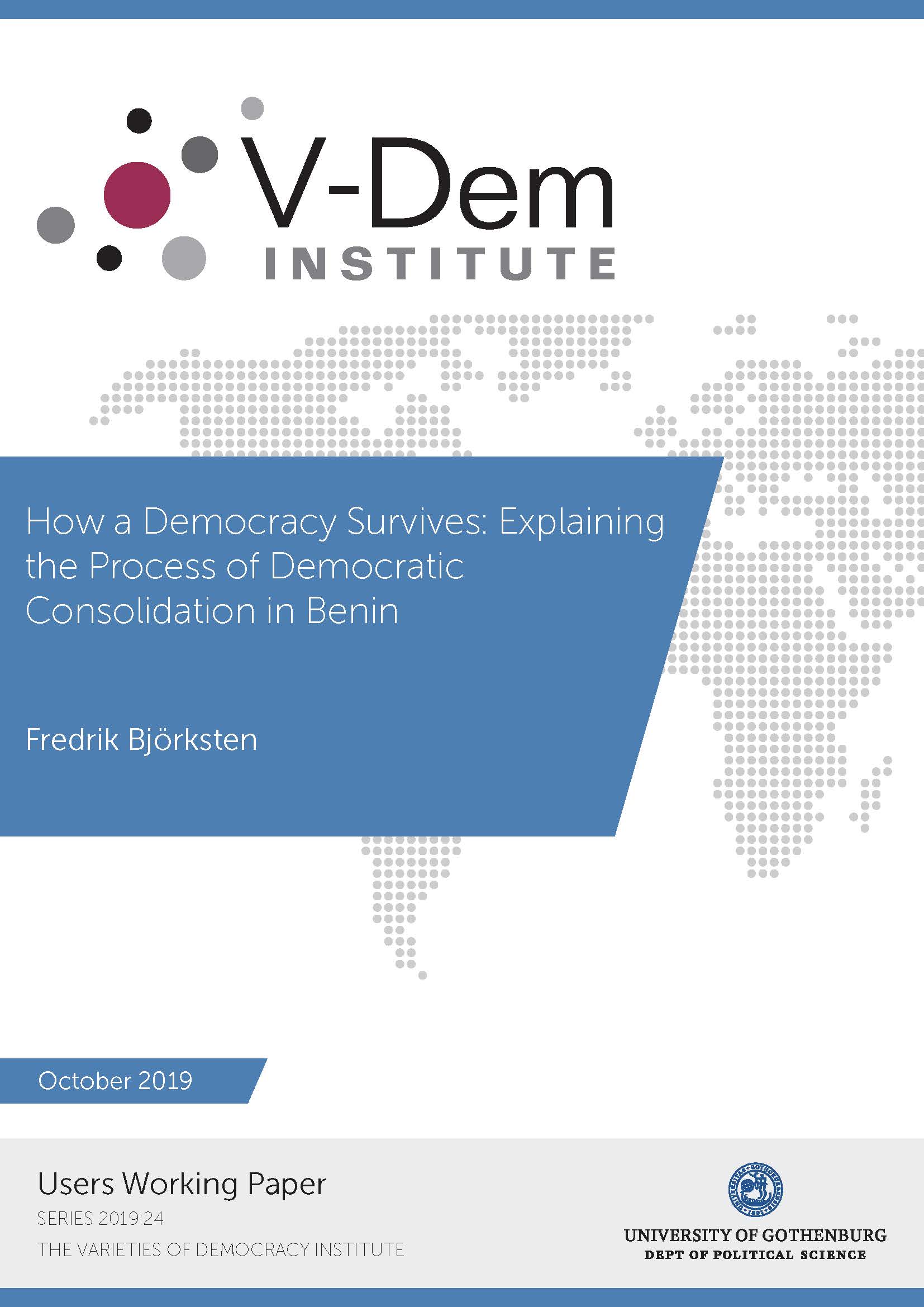
|
UWP #24 | How a Democracy Survives: Explaining the Process of Democratic Consolidation in Benin | Fredrik Björksten | University of Gothenburg, Varieties of Democracy Institute: Users’ Working Paper No. 24. October 2019 |
Benin, an impoverished nation in West Africa, has been consistently ranked as one of Africa’s best democracies. While countries in the region have seen major democratic backlashes, this study seeks to explain how it is that Benin’s democracy has survived since 1991. This paper operationalises a theoretical framework of democratic consolidation based on three approaches— structures, attitudes and behaviour — through 11 factors. In applying this framework to the case, the research analyses qualitative data longitudinally (through inter-country time comparisons) and cross-sectionally (with similar nations in the region). It then triangulates the findings with qualitative scholarly remarks and suggests the explanatory value for each factor. Based on the findings, I argue that Benin’s democratic survival, ultimately, is dependent on a lack of any major anti-democratic behaviour from its main political actors. This absence is likely attributed to strong institutional constraints on the presidency as well as a favourable prodemocracy attitudinal basis which have, likely, incentivised actors to behave democratically. However, the findings also indicate that several factors promoted in the field are not applicable to this case. Economic structures of income inequality and GDP per capita, as well as the institutionalisation of the party system, cannot account for the democratic survival in Benin.<br/><br/> |
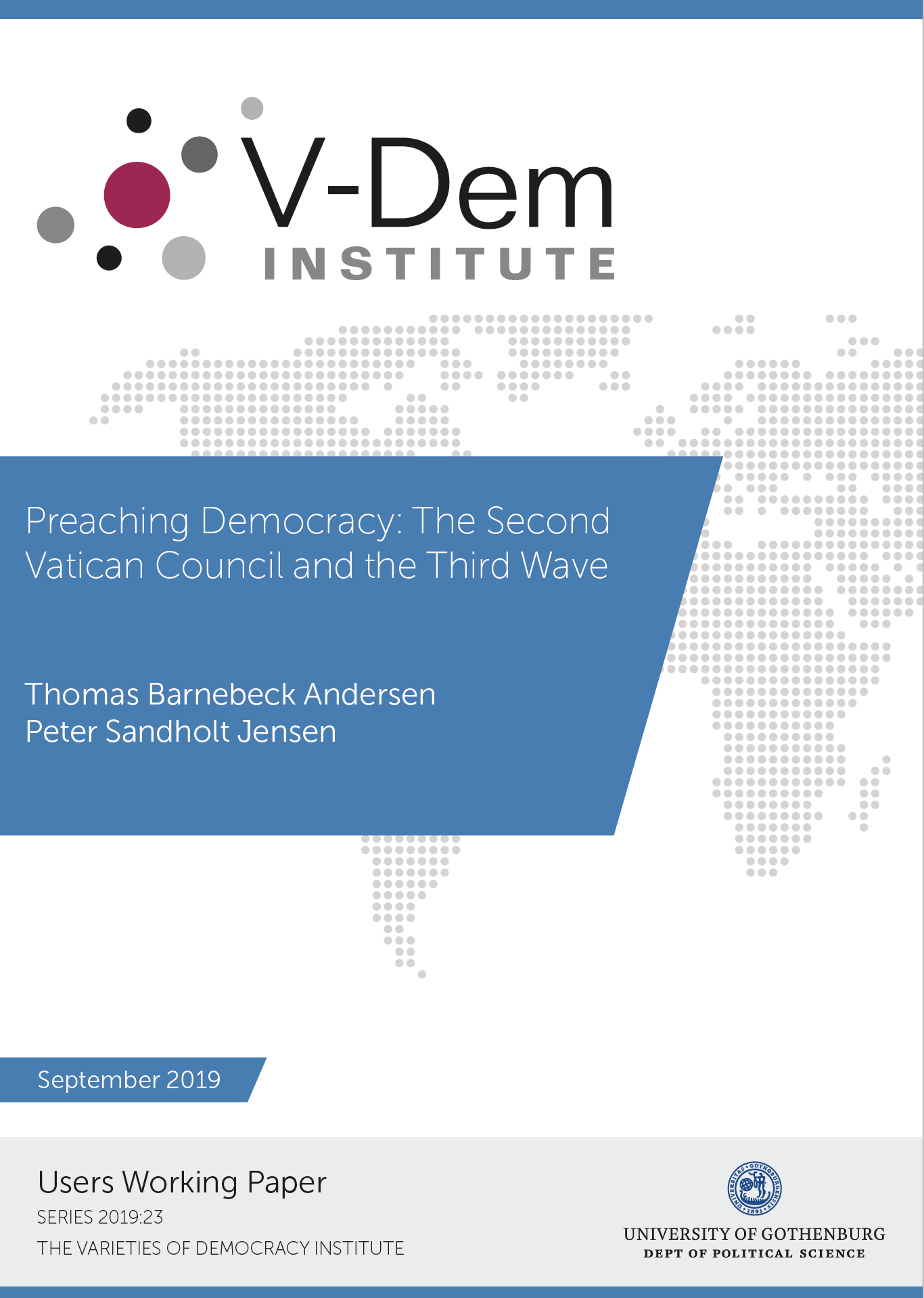
|
UWP #23 | Preaching Democracy: The Second Vatican Council and the Third Wave | Thomas Barnebeck, Andersen Peter Sandholt Jensen | University of Gothenburg, Varieties of Democracy Institute: Users’ Working Paper No. 23. September 2019 |
We use variation in religious doctrine produced by the unexpected Second Vatican Council (1962-65) to investigate the impact of religion on democratization. The Council, which transformed the Catholic Church from defender of the ancien régime into a leading apostle of religious freedom, human rights and democracy, represents the most significant example of institutionalized religious change since the Protestant Reformation. We adopt a difference-in-difference approach to estimate the Council’s impact on democracy. Furthermore, we provide historical narratives on how the post-conciliar Catholic Church influenced the democratization process in different national contexts. Our research substantiates that the Church played a decisive role in third wave democratization. <br/><br/> |
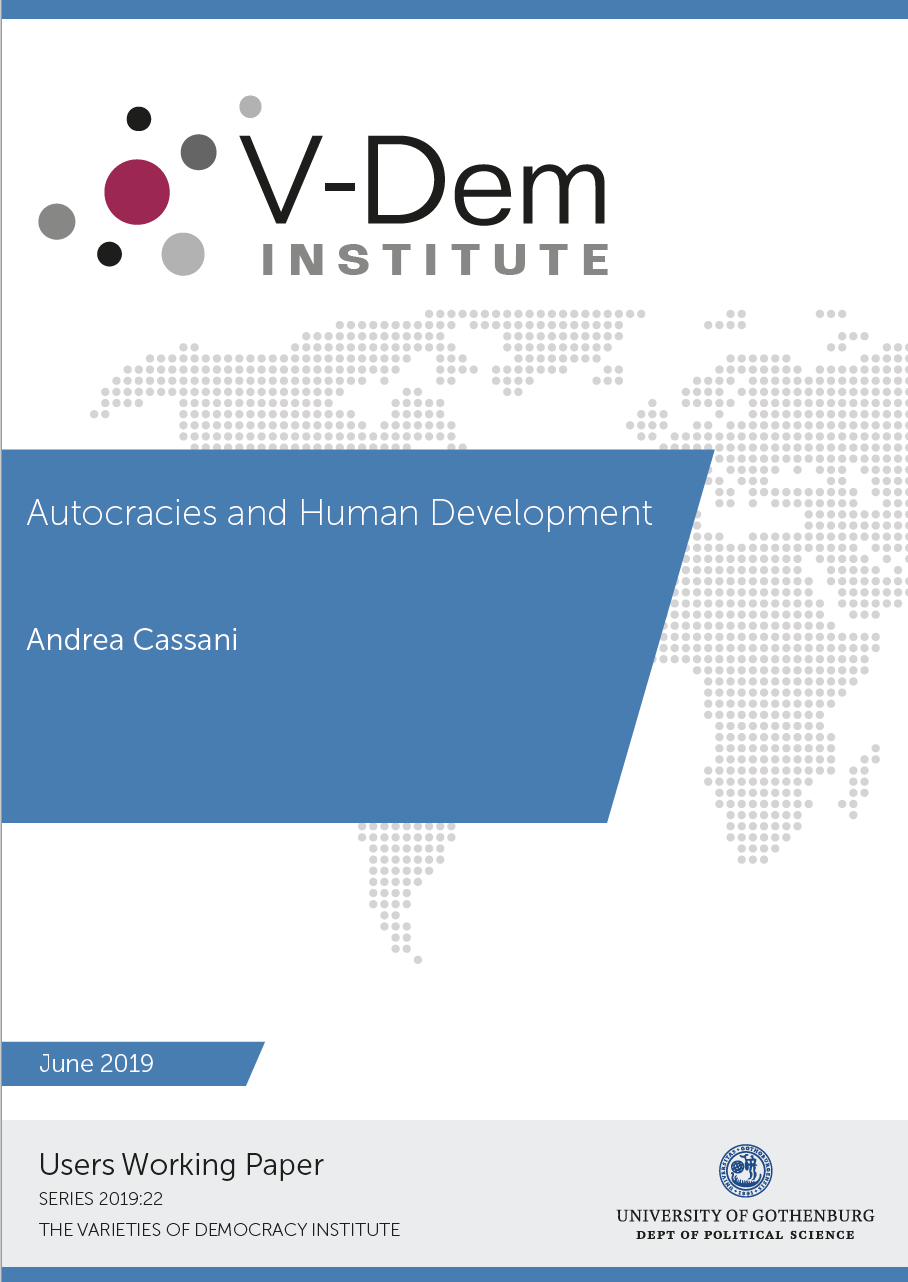
|
UWP #22 | Autocracies and Human Development | Andrea Cassani | University of Gothenburg, Varieties of Democracy Institute: Users’ Working Paper No. 22. June 2019 |
The idea of a connection between a country’s political institutions and its human development record is not new, but attention has mostly focused on comparing democratic and non-democratic regimes. The possible implications of the institutional differences characterizing the non-democratic universe have remained largely disregarded. Accordingly, this paper examines how different institutional environments could shape the importance that autocrats attach to improving citizens’ living conditions. The discussion suggests that so-called competitive autocracies, which hold elections and allow for some degree of contestation, face stronger pressures to improve citizen living conditions. Based on an updated version of the V-Dem Regimes of the World index that distinguishes competitive from hegemonic-party electoral autocracies and different forms of closed autocracy, and using data on school enrolment and child mortality for the 1971-2015 period, autocracy’s comparative human development performance is analysed. The main finding is that competitive autocracies outperform other non-democratic regimes, with the exception of hereditary regimes.<br/><br/> |
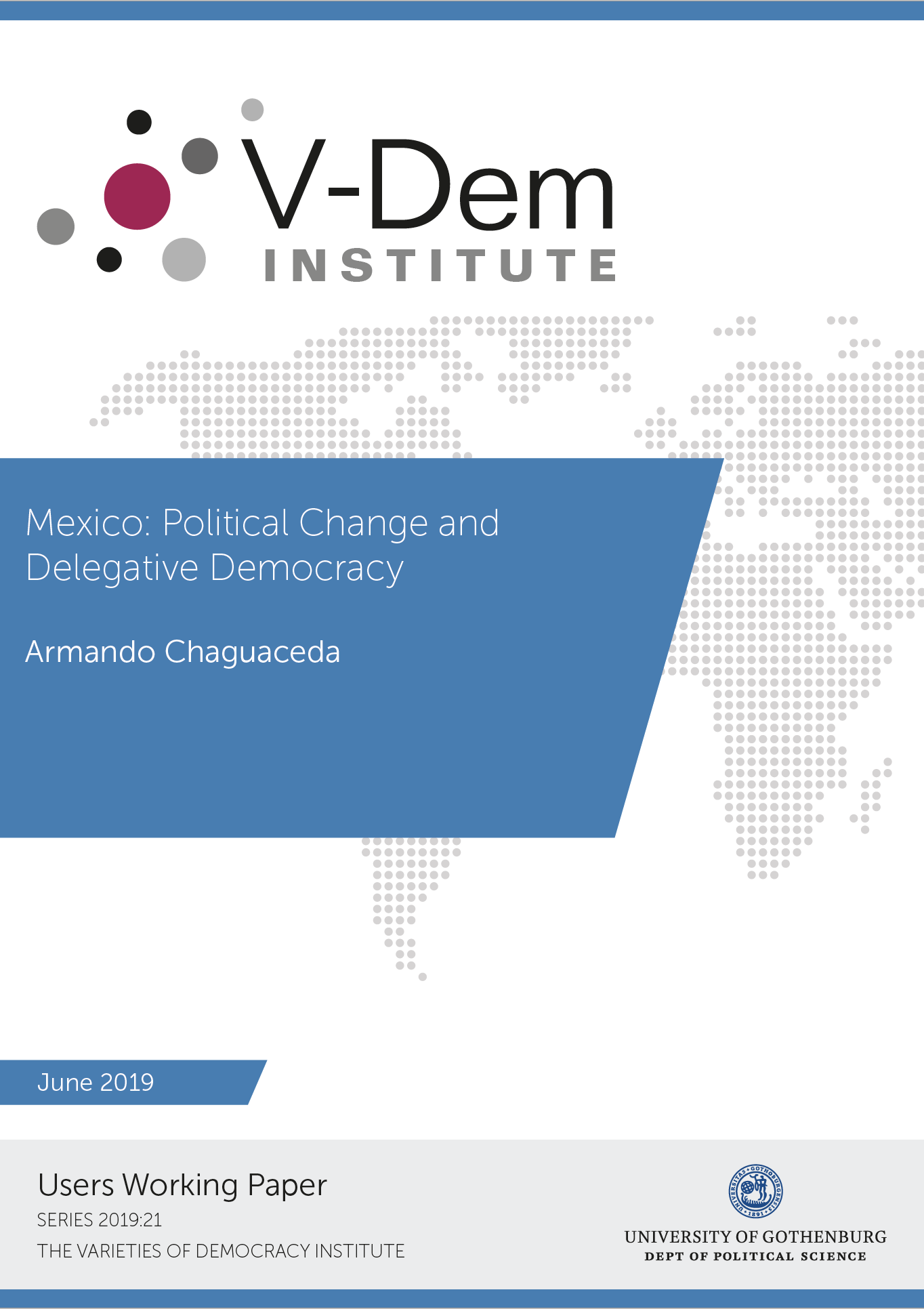
|
UWP #21 | Mexico: Political Change and Delegative Democracy | Armando Chaguaceda | University of Gothenburg, Varieties of Democracy Institute: Users’ Working Paper No. 21. June 2019 |
The scenario resulting from the 1 July 2018 presidential election is configuring in Mexico a delegative democracy with wide support for incumbant, rapid growth of hegemonic power and uncertain consequences for the nation’s sociopolitical life. <br/><br/> |
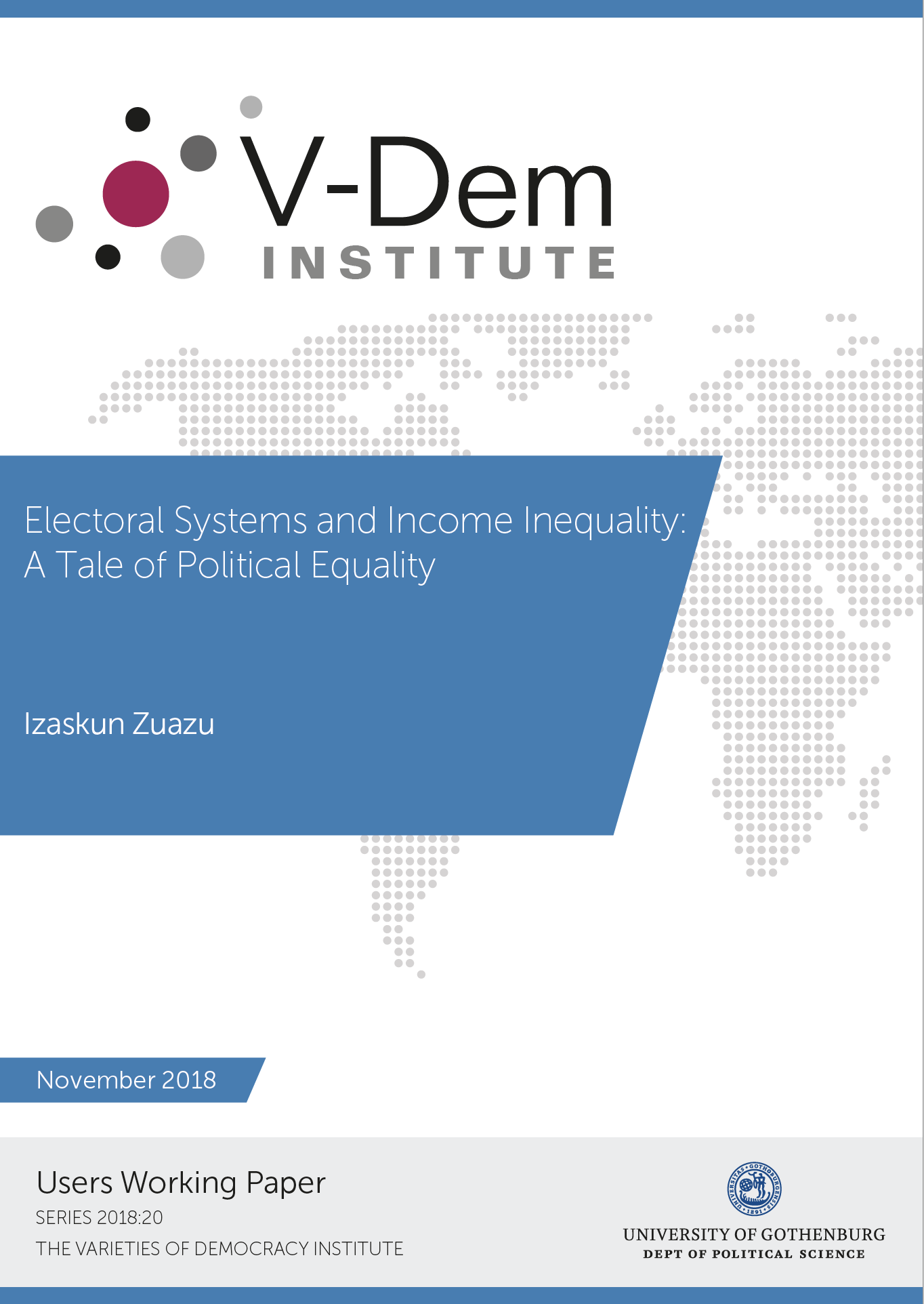
|
UWP #20 | Electoral Systems and Income Inequality: A Tale of Political Equality | Izaskun Zuazu | University of Gothenburg, Varieties of Democracy Institute: Users’ Working Paper No. 20. November 2018 |
Political economy literature has so far failed to offer a consensus on the effect of political institutions such as regime type (democracy vs. autocracy) and electoral systems (majoritarian vs. proportional representation) on within-country income inequality. Beyond the inequality effects of these de jure political institutions, this paper finds robust evidence that de facto distribution of political power crucially matters to income inequality. Based on a panel database of 121 countries for the period from 1960 to 2007, the results consistently associate even distributions of political power across socio-economic groups with lower levels of income inequality. The scale of this effect hinges upon the proportionality of electoral systems. However, regime type and electoral system are not consistently associated with a signicant impact on income inequality.<br/><br/> |
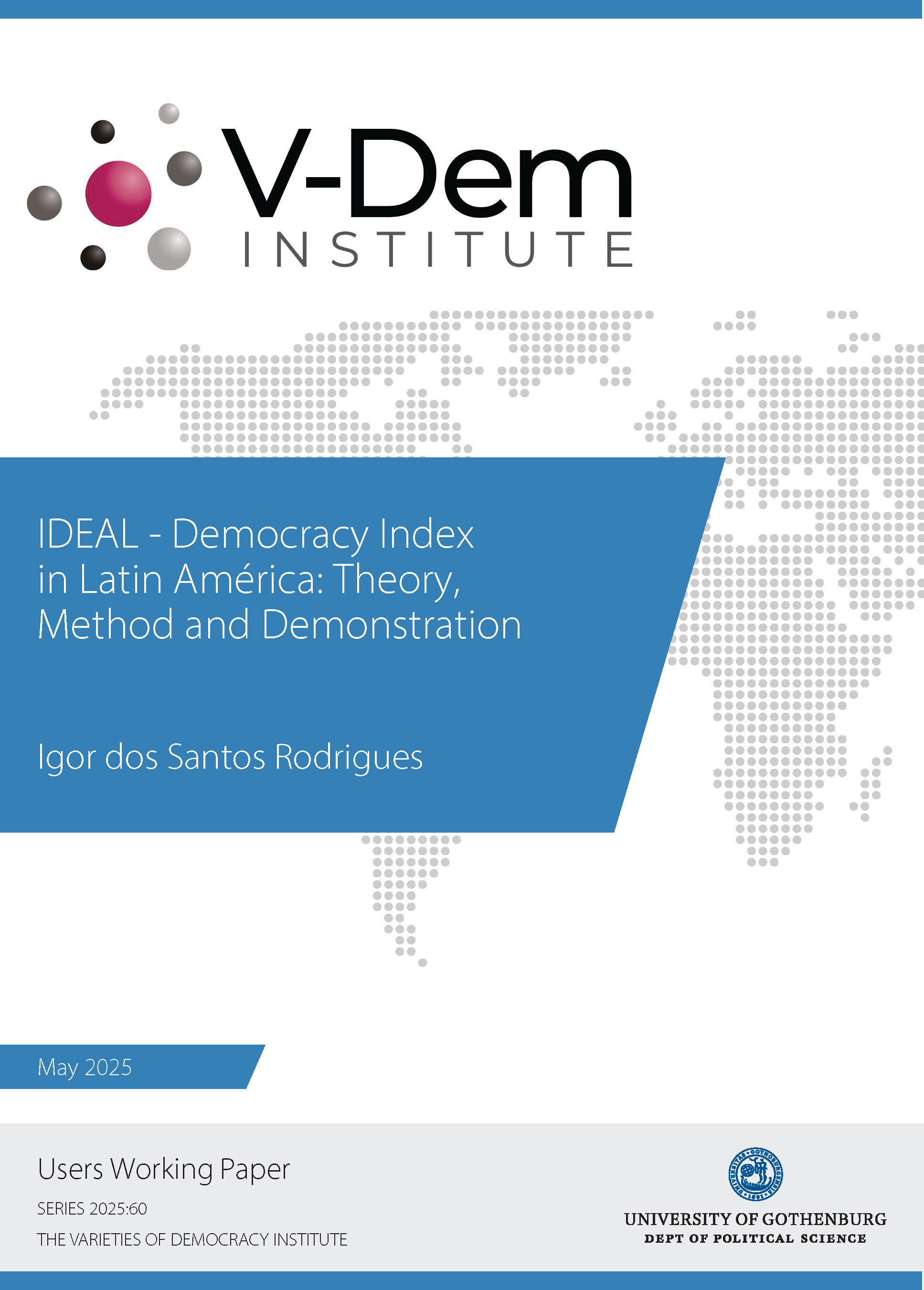
|
UWP #60 | IDEAL - Democracy Index in Latin América: Theory, Method and Demonstration | Igor dos Santos Rodrigues | University of Gothenburg, Varieties of Democracy Institute: Users’ Working Paper No. 60. May 2025. |
This article outlines the creation of a Democracy Index for 19 Latin American countries from 1900 to 2022, offering a comprehensive assessment of democratic trends over a century. By meticulously examining historical records, political systems, and socio-economic indicators, the index captures the complexities of democratic governance. It considers key factors like electoral processes, civil liberties, political participation, and government accountability. Employing diverse data sources and robust statistical methods, the index serves as a valuable tool for scholars, policymakers, and practitioners to analyze the evolution of democracy in Latin America. It enables comparative studies and provides insights into democratic consolidation, backsliding, and resilience. The findings underscore the multifaceted nature of democratic development, highlighting both progress and challenges in the region's pursuit of democratic ideals. Ultimately, the Democracy Index enhances understanding of the historical and contemporary realities of democracy in Latin America, informing efforts to strengthen democratic institutions and practices. |
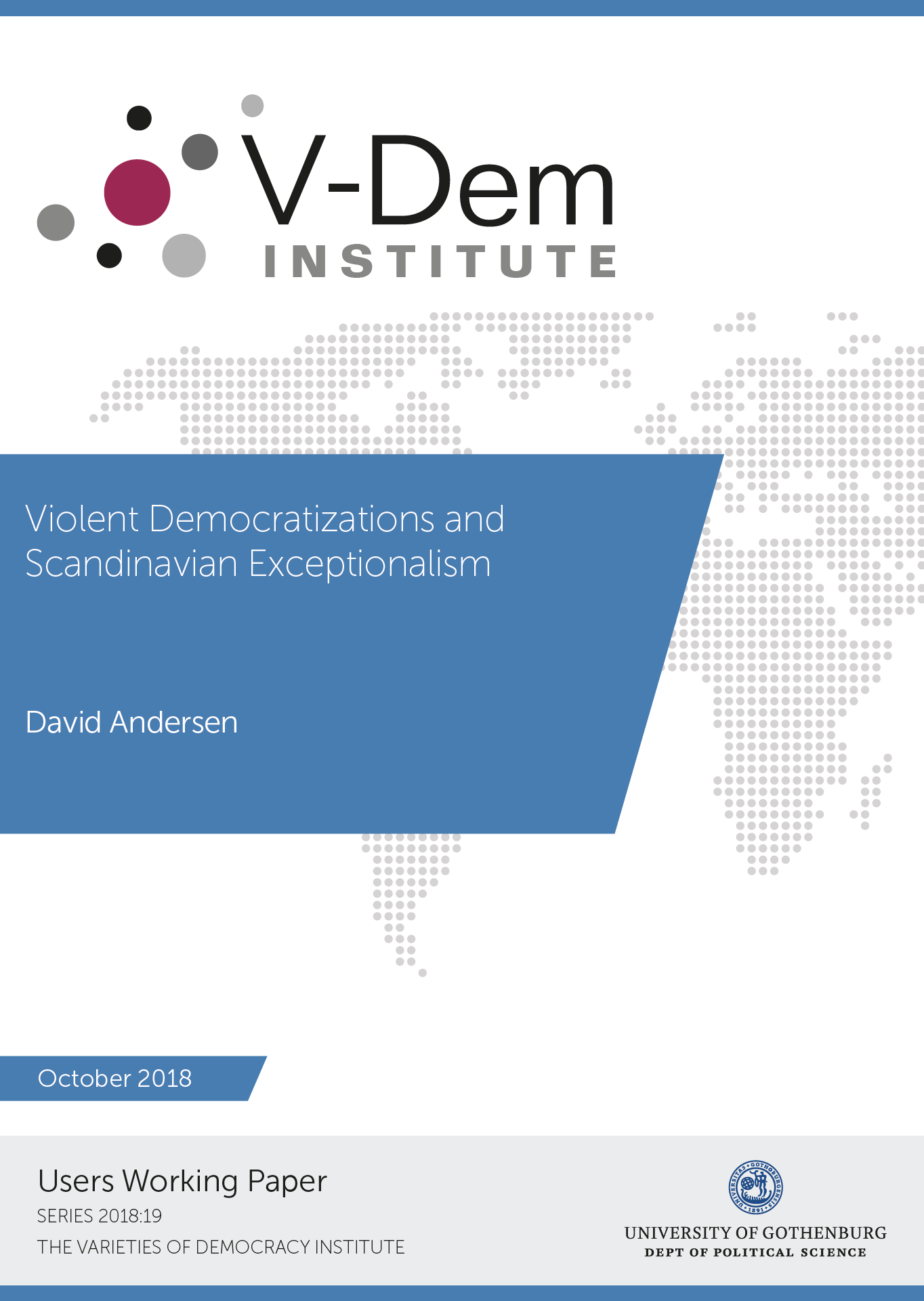
|
UWP #19 | Violent Democratizations and Scandinavian Exceptionalism | David Andersen | University of Gothenburg, Varieties of Democracy Institute: Users’ Working Paper No. 19. October 2018 |
Scholars increasingly look to Scandinavia for better formulas of sustainable democracy. One core feature of Scandinavian exceptionalism, they hold, is that the paths to democracy in Denmark, Norway, and Sweden were relatively peaceful. As a precondition for pursuing this agenda, I conduct the first systematic, empirical scrutiny of whether Scandinavian democratization periods were in fact exceptionally peaceful. By combining Varieties of Democracy and Historical Varieties of Democracy data, I construct a new measure of democratization, based on multiple dimensions of democracy and protracted periods before and shortened periods after democratization events, and a new measure of violent anti-systemic movements. Statistical analyses for a global sample of countries from 1789 to 2017 show that there was indeed a Scandinavian exception of peaceful democratization, but only consistently so when we compare Scandinavian democratizations of competitive elections and suffrage with the rest of Europe before 1946. The results are robust to different specifications of democratization periods, regional diffusion of democratization that instruments for the domestic democratization effect, the sequence theory of liberalization followed by extension of participation, and using extant measures of the dependent and independent variables. I argue that future research needs to reinvestigate the origins of peaceful democratization in Scandinavia from late 18<sup>th </sup>to early 20<sup>th </sup>century.<br/><br/> |
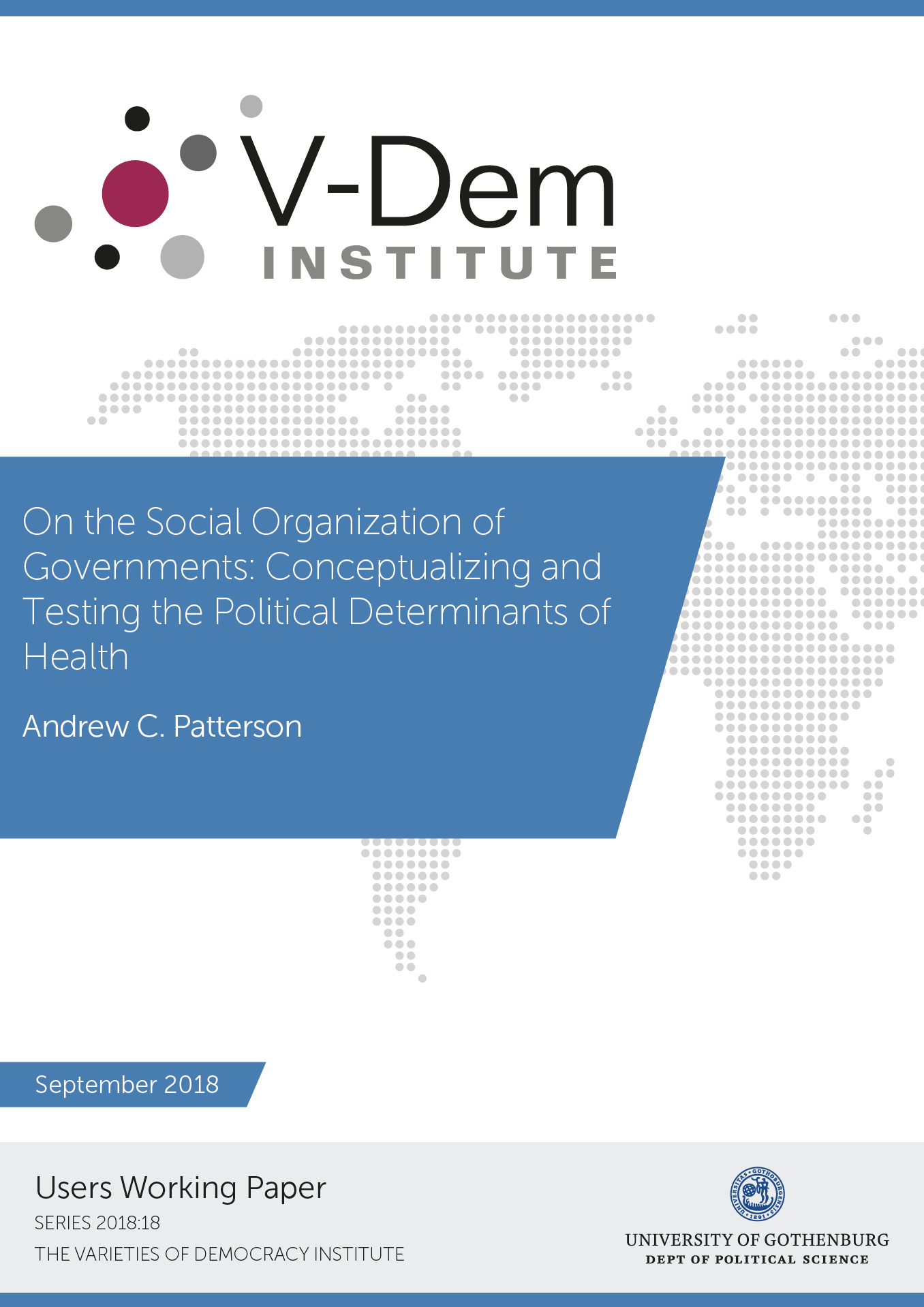
|
UWP #18 | On the Social Organization of Governments: Conceptualizing and Testing the Political Determinants of Health | Andrew C. Patterson | University of Gothenburg, Varieties of Democracy Institute: Users’ Working Paper No. 18. September 2018 |
A burgeoning research area asks whether political factors can affect population health. Risk of losing a forthcoming election, for instance, arguably motivates leaders in democracies to adopt policies that best promote health. However, less population health research considers more specific roles in democratic governments or other, unelected roles. To address these gaps, this study compares cross-national life expectancies and infant mortality rates across 167 countries according to political data drawn from the Varieties of Democracy Project. A series of regression models test whether population health is better in countries with 1) proportional and/or mixed-member electoral rules, 2) independence of the highest court from political interference, and 3) appointments of state administrators based on merit rather than nepotistic social ties. Subsequent models test, respectively, whether 4) deliberative consensus, 5) transparency / predictability of court behaviour, or 4) political corruption mediate relationships between political structures and population health. Findings most consistently suggest that meritocratic recruitment of state administrators may promote stronger life expectancy and infant health by curbing corruption. The independence of a country’s highest court from political interference also appears to promote population health, although this finding is most consistent with respect to infant mortality. Proportional and mixed-member electoral rules relate to these outcomes only when tested separately, while deliberative consensus is at best a modest mediator thereof. Findings altogether suggest population health may be traceable to institutional protocols that shape the roles of government actors. Further work is needed to corroborate this view.<br/><br/> |
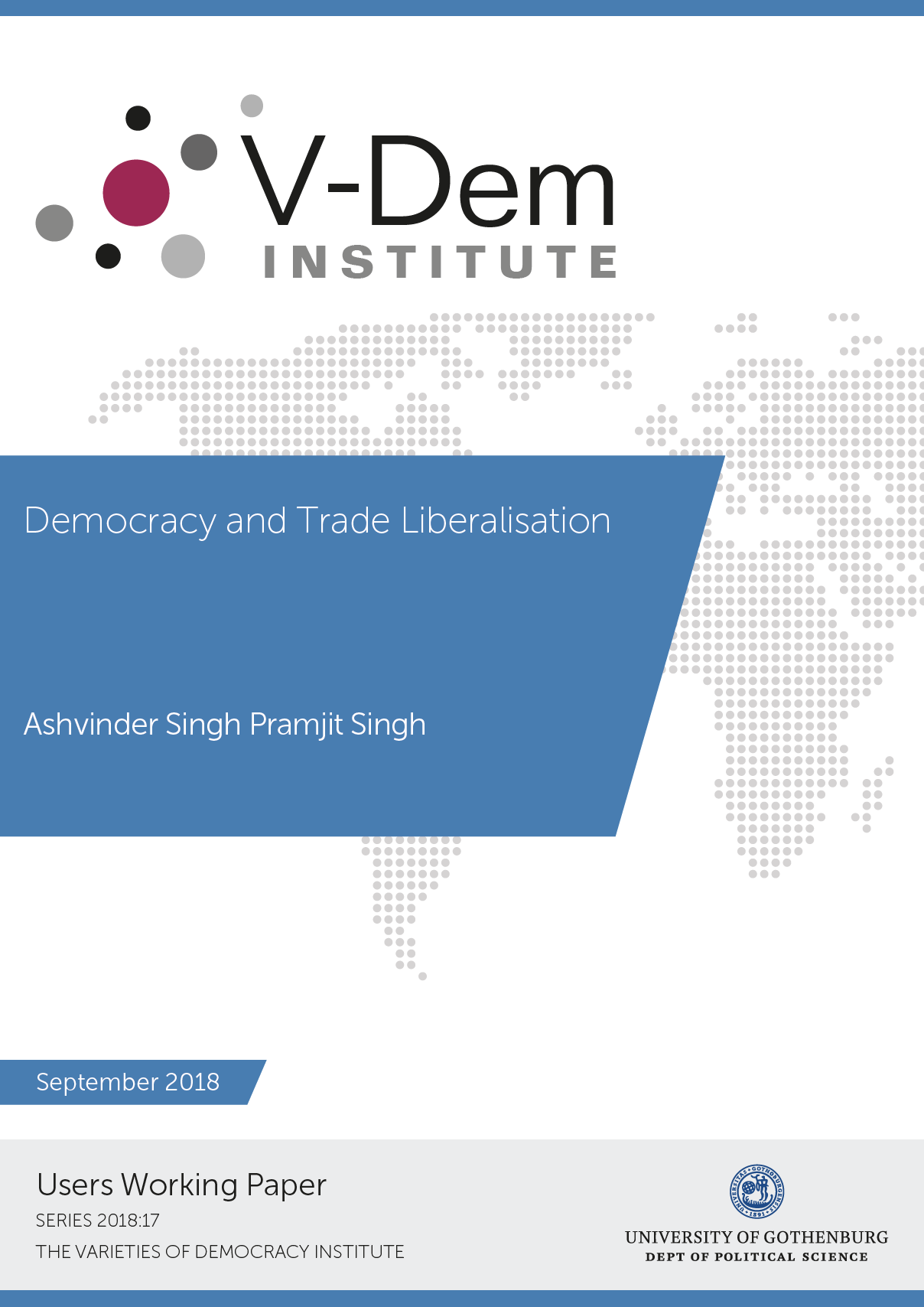
|
UWP #17 | Democracy and Trade Liberalisation | Ashvinder Singh Pramjit Singh | University of Gothenburg, Varieties of Democracy Institute: Users’ Working Paper No. 17. September 2018 |
In the 20thcentury, waves of democratisation and the concurrent rush to free trade worldwide prompted many scholars to research the link between democracy and trade liberalisation. Despite scholars agreeing that democratisation positively affects trade liberalisation, no consensus prevails on which specific aspect of democracy matters most and through which mechanism that it affects trade liberalisation. By building on Mayer’s (1984) application of the Median Voter Theorem, this dissertation argues that democratisation affects trade liberalisation by allowing the preferences of the owners of abundant factors to be represented in the decision/policy-making process. In other words, electoral democratic institutions mediate the representation of preferences. This argument is tested in two ways. First, by relying on a new dataset from the Varieties of Democracy project for the period 1974 to 2014 and using country-level panel data regression, preliminary analysis shows that electoral democracy matters most for trade liberalisation. Next, a Difference-in-Difference analysis finds that the extension of suffrage lowers tariffs and results in a more open trade policy for developing countries. These findings provide fresh support for the application of the Median Voter Theorem to the link between democratisation and trade liberalisation. <br/><br/> |
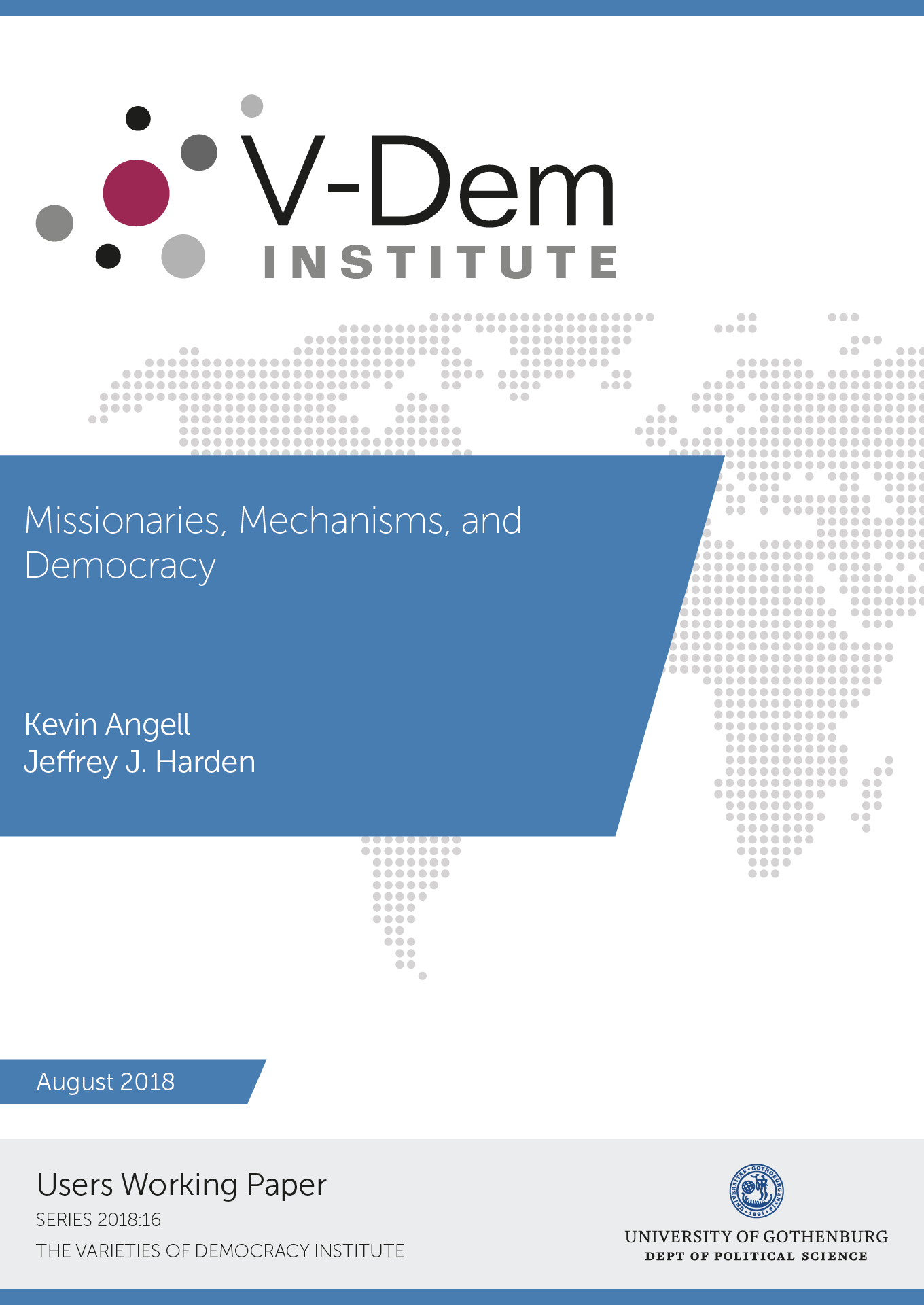
|
UWP #16 | Missionaries, Mechanisms, and Democracy | Kevin Angell, Jeffrey J. Harden | University of Gothenburg, Varieties of Democracy Institute: Users’ Working Paper No. 16. August 2018 |
What causal pathways link Protestant missionaries to the spread of liberal democracy? Woodberry’s (2012) theoretical explanation includes three central mechanisms: the development of mass printing, the expansion of education and literacy, and the growth of civil society. However, his quantitative analyses of non-Western countries focus exclusively on the positive total effect of conversionary Protestants (CPs) on democracy. Here, we conduct a direct empirical evaluation of the mechanisms he proposes using causal mediation methods. Our results corroborate the positive total effect, but show limited support for its causal pathways. We find minimal evidence to suggest that CPs’ impact operated via mass printing or civil society. There is more support for education as a mediator, although at best it only accounted for a minority share of the total effect. We conclude that further theorizing about causal processes is necessary to strengthen the claim that Protestant missionaries contributed to democracy’s rise.<br/><br/> |
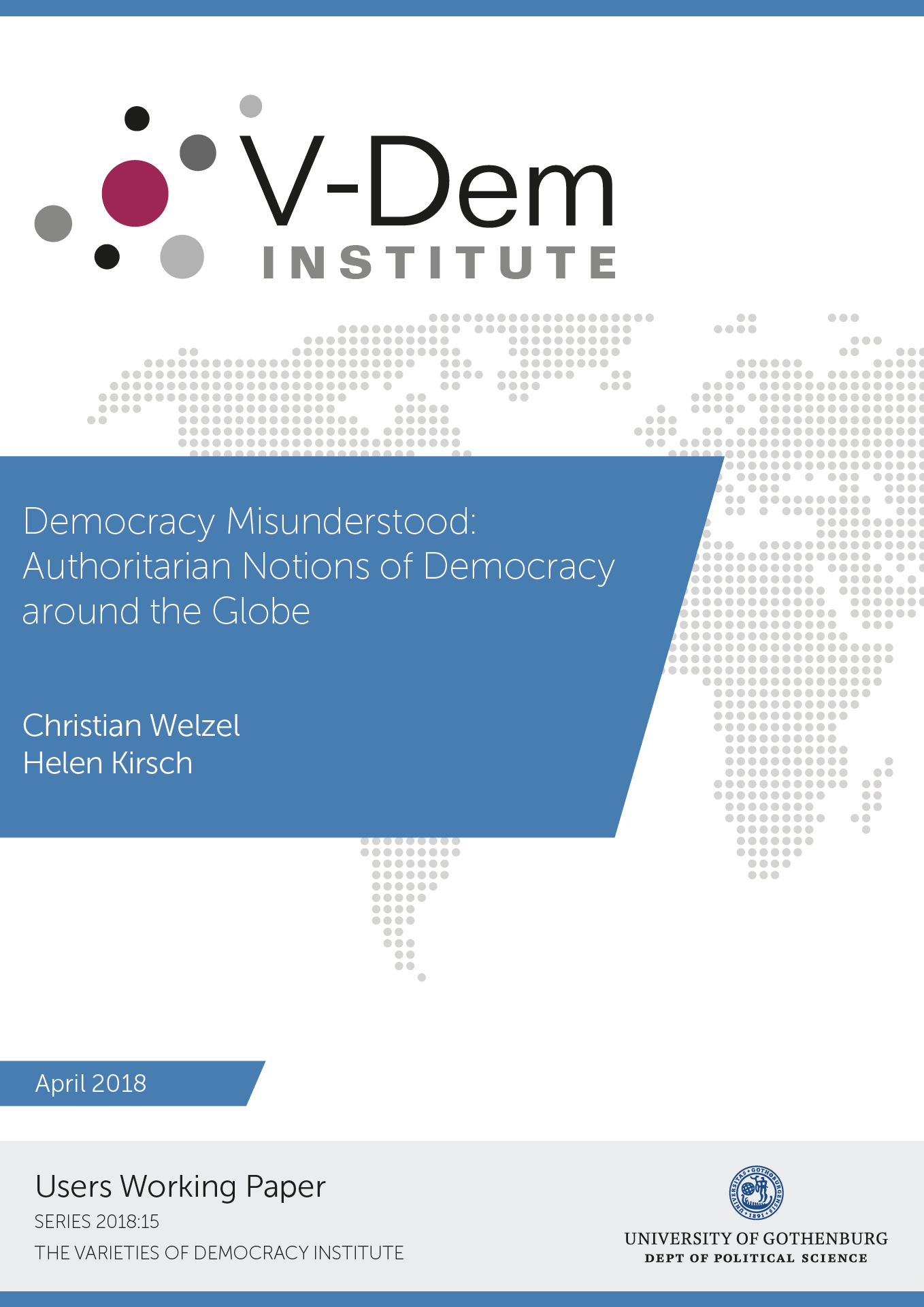
|
UWP #15 | Democracy Misunderstood: Authoritarian Notions of Democracy around the Globe | Christian Welzel, Helen Kirsch | University of Gothenburg, Varieties of Democracy Institute: Users’ Working Paper No. 15. April 2018 |
An intriguing observation consists in the fact that widespread support for democracy coexists in many countries with the persistent absence of democracy. Addressing this phenomenon, we show that in most places where it exists people understand democracy in ambiguous ways in which authoritarian notions mix into—and even overshadow—liberal notions, in spite of the contradiction between these two notions. In light of this contradiction, we present evidence suggesting that authoritarian notions of democracy question the authenticity of liberal ones when both are endorsed conjointly. Worse, the evidence further suggests that authoritarian notions even revert the meaning of support for democracy itself, indeed indicating support for autocracy. Arguably, this reversal in the meaning of support for democracy lends legitimacy to authoritarian rule, which helps to explain where it endures. Testing alternative explanations of authoritarian notions of democracy, we find that emancipative values are most influential, exerting a two-fold “enlightening” effect in (a) making people recognize the contradiction between liberal and authoritarian notions of democracy and (b) turning them against authoritarian notions.<br/><br/> |
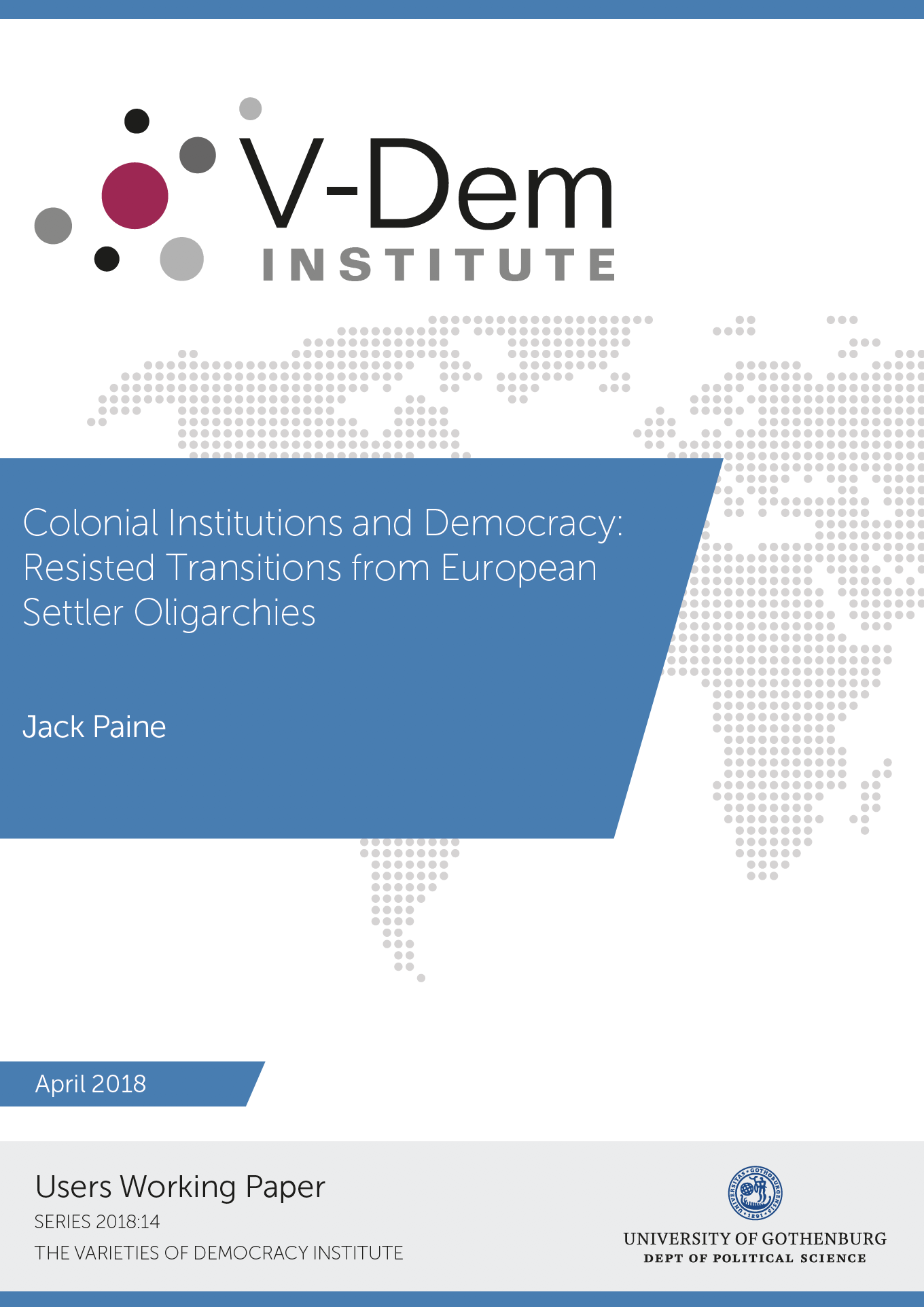
|
UWP #14 | Colonial Institutions and Democracy: Resisted Transitions from European Settler Oligarchies | Jack Paine | University of Gothenburg, Varieties of Democracy Institute: Users’ Working Paper No. 14. April 2018 |
What explains the emergence and evolution of political institutions under colonial rule? Existing research implies that European settlers engendered democracy by (1) establishing oligarchic representation and (2) later expanding the franchise. This paper rethinks the origins and evolution of colonial institutions by providing a new explanation for both sequencing steps focused on impediments to democratizing oligarchies. First, creating representative institutions required European settlers to have a representative tradition on which to draw. This paper introduces new data on colonial legislatures from the 17th through 20th centuries and shows that early promotion of elected legislatures was mostly limited to British colonies—a metropole with a representative tradition. Second, extending class-based theories of democracy predicts perverse institutional evolution—resisted enfranchisement and contestation backsliding—because sizable European settler minorities usually composed an extractive landed class. Evidence on franchise size and on legislature disbandment from Africa, the British Caribbean, and Iberian America supports these implications.<br/><br/> |
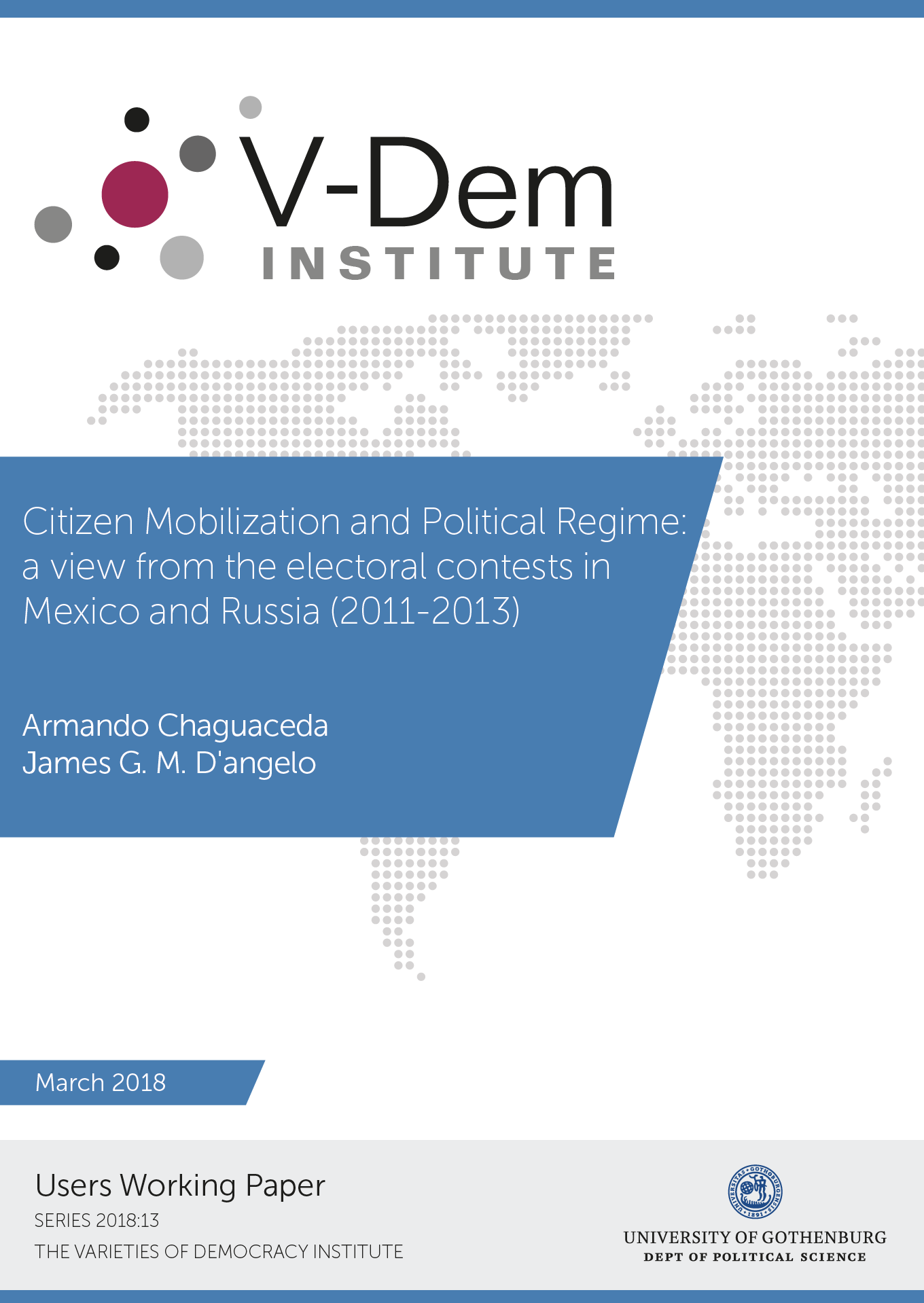
|
UWP #13 | Citizen Mobilization and Political Regime: a view from the electoral contests in Mexico and Russia (2011-2013) | Armando Chaguaceda, James G. M. D’angelo | University of Gothenburg, Varieties of Democracy Institute: Users’ Working Paper No. 13. March 2018 |
This paper analyzes the protests that occurred in Mexico and Russia during the elections of 2011 and 2012. Starting from the political context of both countries, it describes the mobilizations, using contentious politics studies as a reference and a political process approach, while taking into account the various effects that reciprocal interaction between collective action and institutional policy had for both political regimes, given the different structures of opportunities and state capacities of both countries.<br/> |
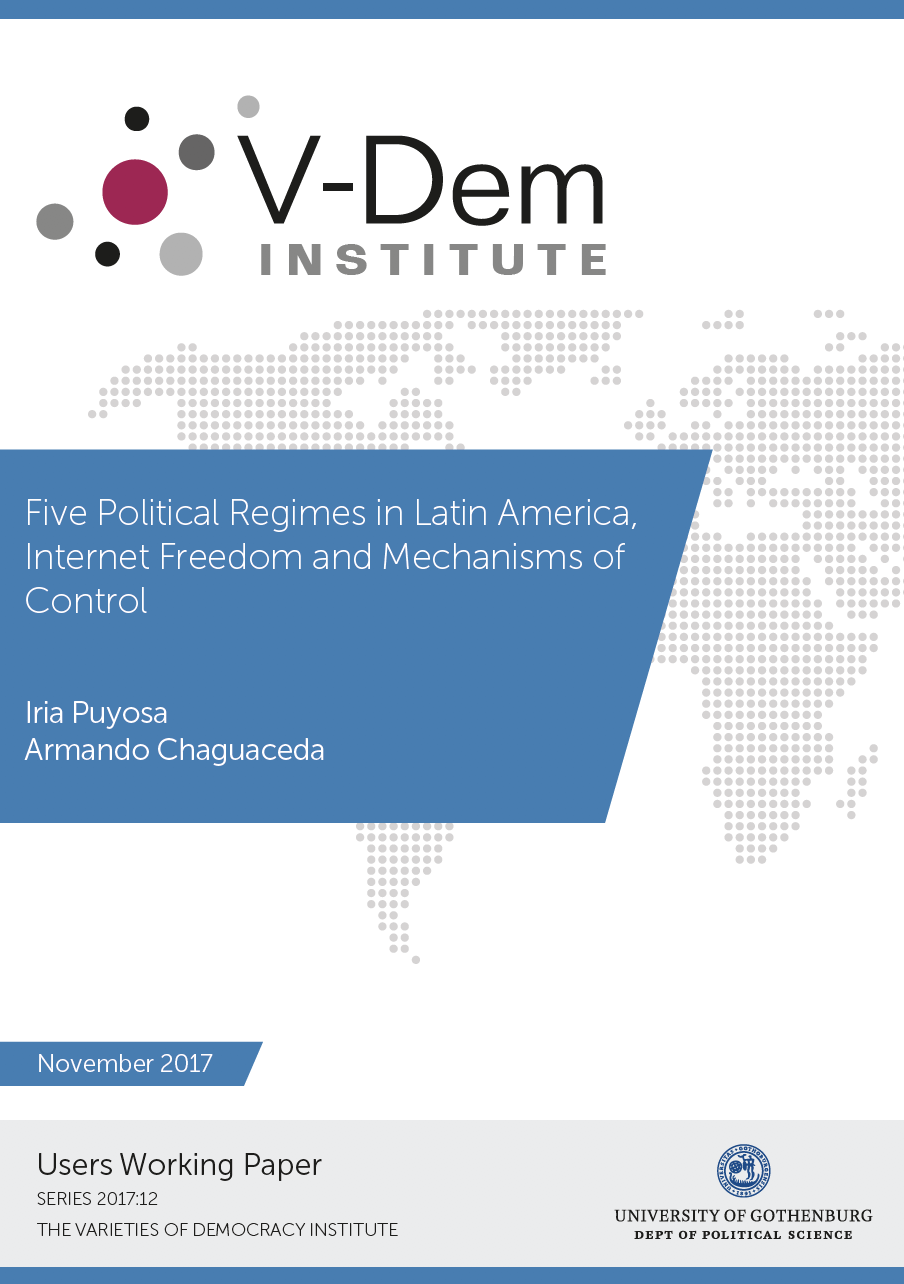
|
UWP #12 | Five Political Regimes in Latin America, Internet Freedom and Mechanisms of Control | Iria Puyosa, Armando Chaguaceda | University of Gothenburg, Varieties of Democracy Institute: Users’ Working Paper No. 12. November 2017 |
Since 2010, there has been a trend towards establishing internet control and securitization policies (Freedom House, 2016). The literature on the subject indicates that the mechanisms of internet control vary according to the type of political regimes. The objective of this work is to verify if the policies of control of internet in Latin America vary according to the type of prevailing political regime. For the study were selected five Latin American countries that are categorized as examples of different political regimes: Chile, Mexico, Ecuador, Venezuela and Cuba. For each case, the indicators related to freedom of expression on the internet are reported in accordance with the data provided by «Varieties of Democracy». «Freedom on the Net» categorizations are used as a complement. The results indicate that there is a correlation between political regime (measured by polyarchy index) and internet freedom. Indeed, the more autocratic the regime is, the more first-generation internet controls are observed, with censorship of contents and violations of users’ rights. While in hybrid regimes second-generation controls are more commonly observed, which involve obstacles to access, without customary content blocking and network outages.<br/><br/> |
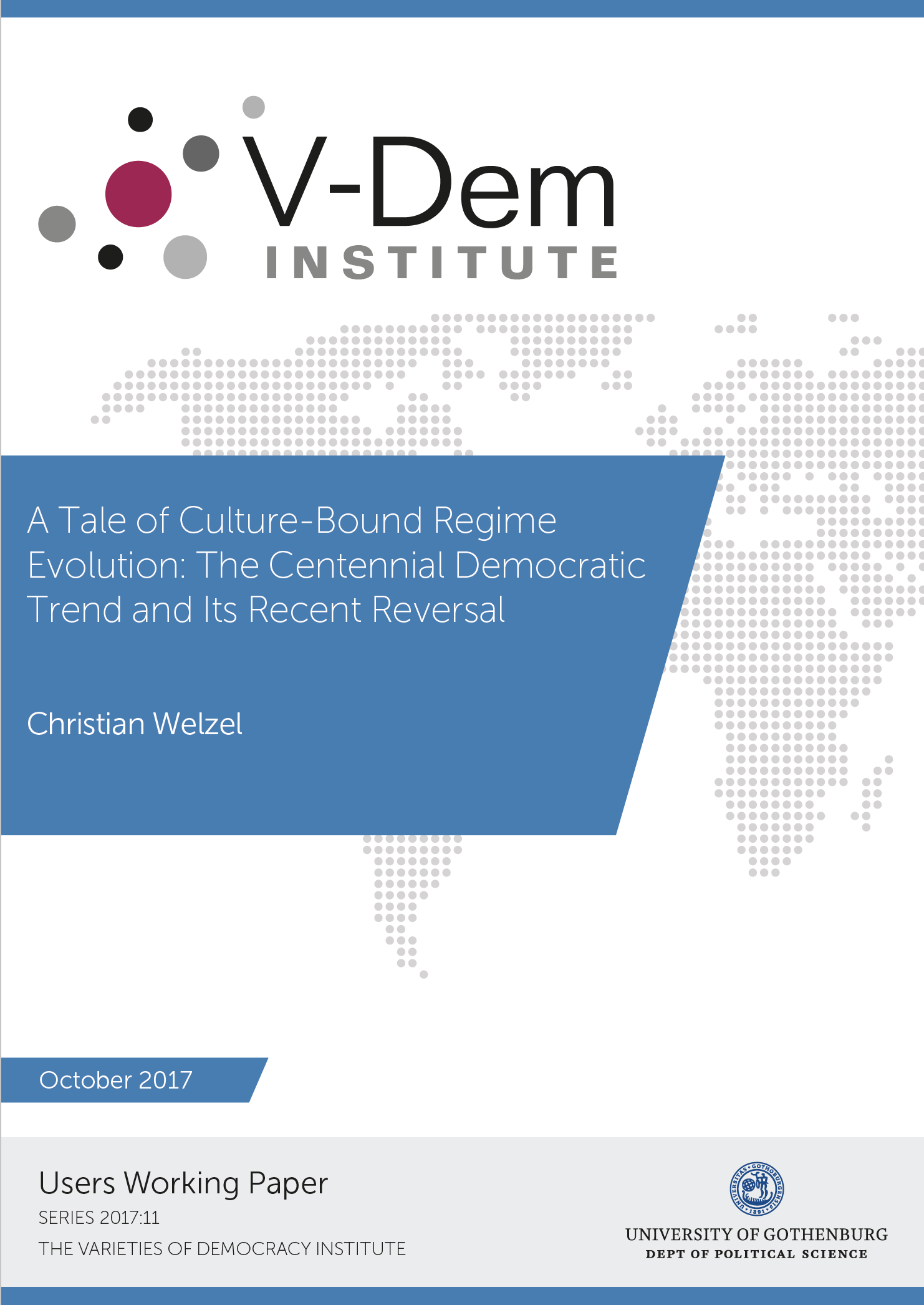
|
UWP #11 | A Tale of Culture-Bound Regime Evolution: The Centennial Democratic Trend and Its Recent Reversal | Christian Welzel | University of Gothenburg, Varieties of Democracy Institute: Users’ Working Paper No. 11. October 2017 |
Using a new measure of “comprehensive democracy” derived from V-Dem (www.v-dem.net), my analysis traces the global democratic trend over the last 116 years, from 1900 till 2016, looking in particular at the centennial trend’s cultural zoning. Despite a burgeoning literature on resurgent authoritarianism, I find no evidence for a wholesale reversal of the centennial democratic trend, although indications for a decennial stagnation and a very recent downswing are undeniable. Whether this downswing will turn into a lasting erosion of democracy remains to be seen but seems unlikely in light of the fact that previous reverse waves have always only temporarily halted democracy’s long-term ascension. At the same time, democracy has been proceeding and continues to differentiate political regimes in a strongly culture-bound manner: high levels of democracy remain a distinctive feature of countries in which emancipative values have grown strong over the generations. By the same token, backsliding and autocratization are limited to cultures with under-developed emancipative values. In line with this finding, public support for democracy neither favors democratization, nor does it prevent autocratization in disjunction from emancipative values. On the contrary, public support for democracy shows such pro-democratic effects if—and only if—it co-exists in close association with emancipative values. The reason is that—in disconnect from emancipative values—support for democracy frequently reverts its meaning, indicating the exact opposite of what intuition suggests: namely, support for autocracy. In conclusion, the prospects for democracy are bleak where emancipative values remain weak.<br/><br/> |
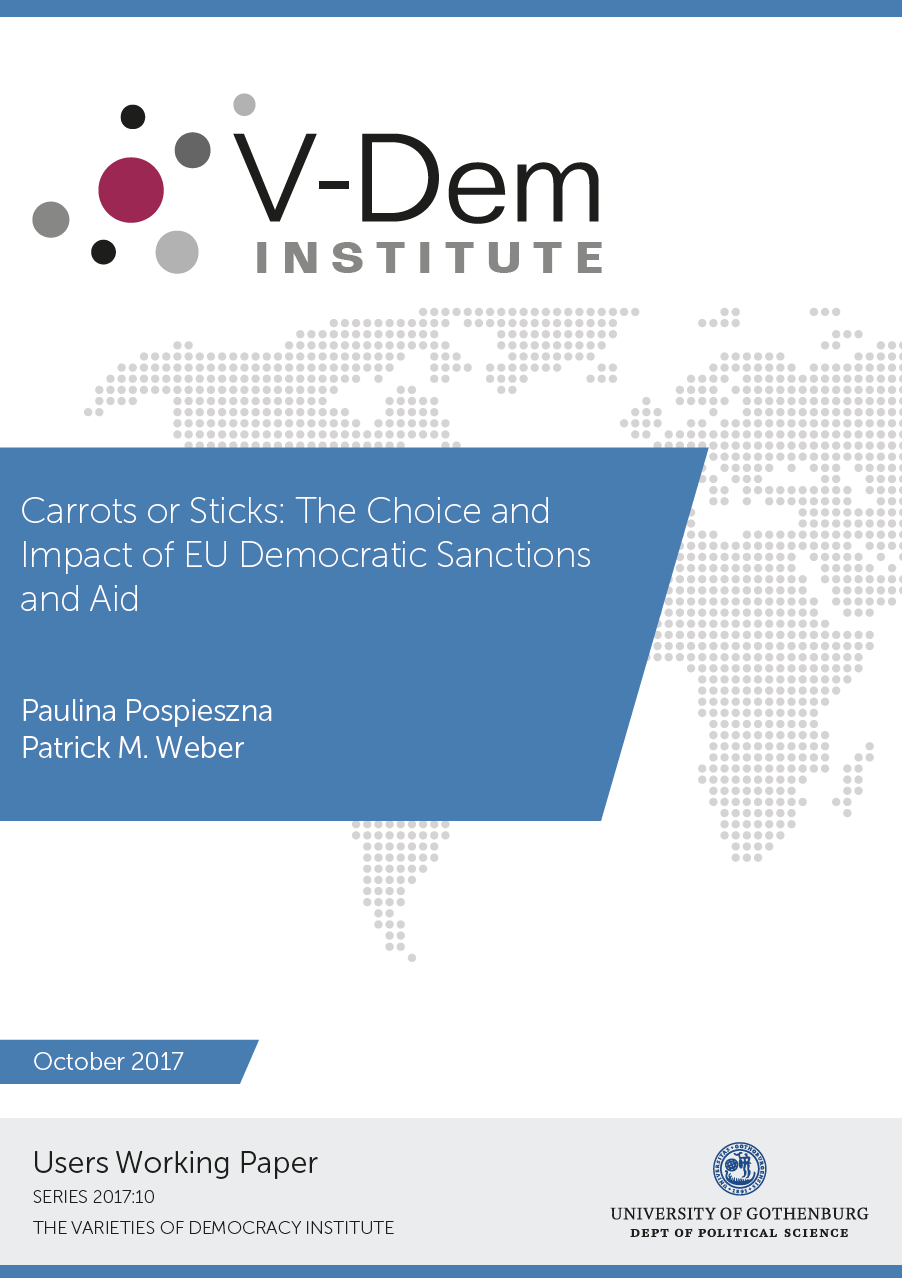
|
UWP #10 | Carrots or Sticks: The Choice and Impact of EU Democratic Sanctions and Aid | Paulina Pospieszna, Patrick M. Weber | University of Gothenburg, Varieties of Democracy Institute: Users’ Working Paper No. 10. October 2017 |
Both the provision of democracy aid and the imposition of sanctions are tools to promote democracy. Yet, it is unclear under which conditions states choose to set positive or negative incentives. In order to answer which tool—democracy aid or democratic sanctions—is more effective, one has to analyse the actual form of the provision of aid. Sanctions and democracy aid can also be employed at the same time. The goal of this study is to determine their joint effect on democratization in recipient countries. We argue that sending civil society aid or democracy aid channeled through NGOs and the civil society when sanctions are in place, enhances the effectiveness of sanctions as a democracy promotion tool because the civil society can be empowered to introduce democratic changes in its country—so additionally to the top-down pressure created by sanctions, there is bottom-up pressure exerted by the civil society. Our results suggest that democratic sanctions are more likely to be successful if democracy aid bypasses the government in a target state. Conversely, other forms of aid provision tend to decrease the effectiveness of sanctions. In order to precisely explain the joint impact of positive and negative incentives on democratization, we employ a new comprehensive dataset on economic sanctions for the period between 1989 and 2015 which integrates and updates the Threats and Imposition of Economic Sanctions and the GIGA sanctions data sets, merged with disaggregated OECD aid data and V-Dem as well as PolityIV democracy scores.<br/><br/> |
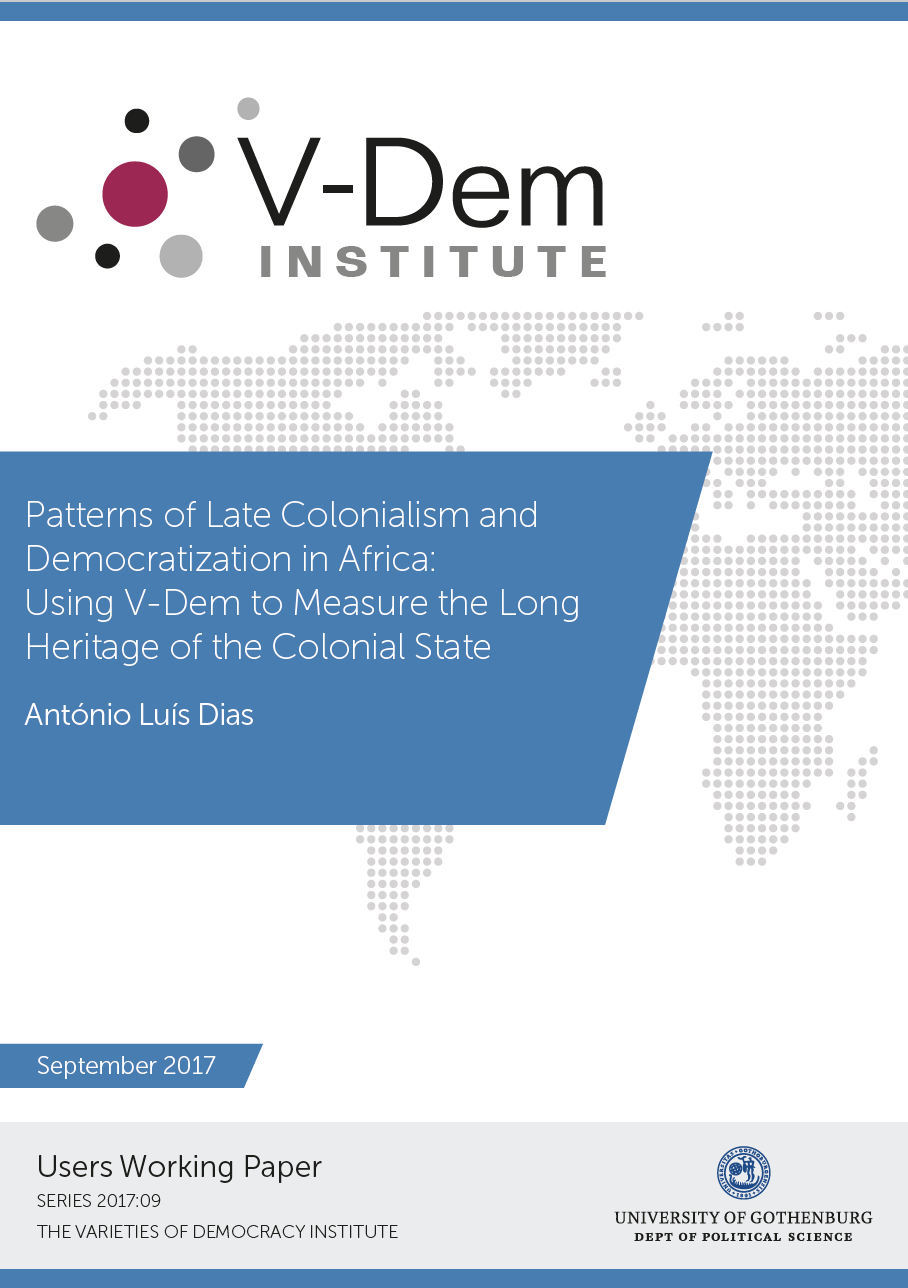
|
UWP #09 | Patterns of Late Colonialism and Democratization in Africa: Using V-Dem to Measure the Long Heritage of the Colonial State | António Luís Dias | University of Gothenburg, Varieties of Democracy Institute: Users’ Working Paper No. 9. September 2017 |
Between 1989 and 1995 the third (or fourth?) wave of democratization hit Sub-Saharan Africa, with mixed results. These different outcomes pose a challenge for most contemporary theories of democratization as they fail to explain this variation. So how can we explain democratization in this region? This paper will readdress this problem by re-introducing a variable that has not been fully explored: the late colonial period. During this period, that lasted from the 1930s through independence, colonial empires had to reform their rule, introducing elections with universal suffrage and local parliaments in some cases. We argue that this legacy of democratic experience in the absence of repression is a crucial factor determining a successful democratization by the end of the 20th century. Two different routes will be taken to test our hypothesis. First, we will sketch a brief historical comparison of different cases from the British and French colonial empire. Through this exercise we seek to understand if these differences did occur, how significant they were and what mechanisms might link them to a process that occurred almost three decades later. In a second moment we will use the Varieties of Democracy (V-Dem) database and see how it shows the differences during late colonialism and we will use it to test statistically our hypothesis.<br/><br/> |
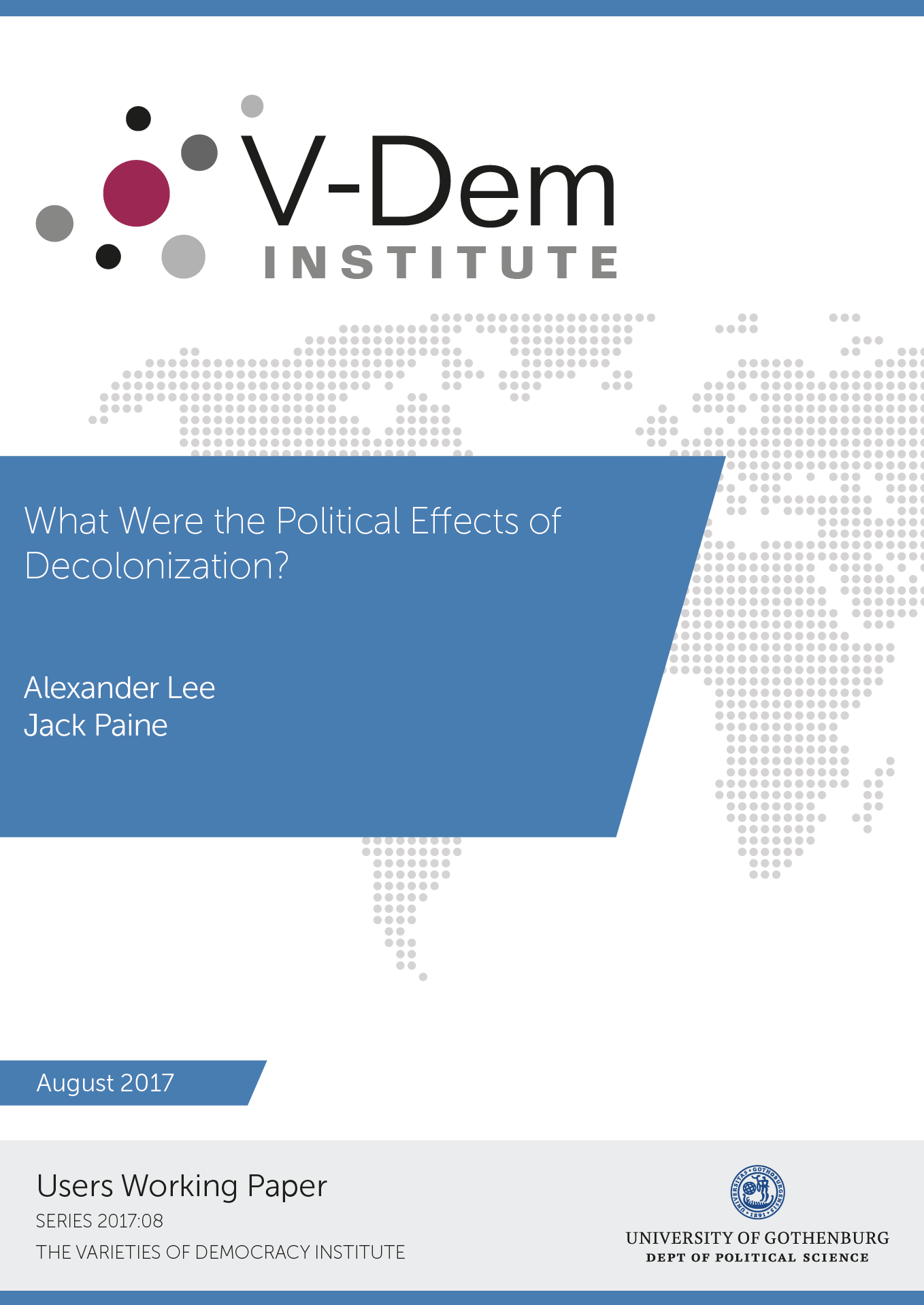
|
UWP #08 | What Were the Political Effects of Decolonization? | Alexander Lee, Jack Paine | University of Gothenburg, Varieties of Democracy Institute: Users’ Working Paper No. 8. August 2017 |
Considerable research argues that European colonial rule profoundly in political and economic outcomes. One potential implication of this argument is that territories should exhibit different outcomes during and after colonial rule. We test this hypothesis for four outcomes - democracy, internal conflict, government revenues, and economic development - using unit fixed effects models. Democracy levels increased sharply in colonial autonomy years immediately prior to independence. However, conflict, revenue, and income levels exhibit no systematic differences before or after independence. The results are similar when taking into account varieties of colonial institutions and the endogenous timing of independence. Except for a novel result on the timing of democratic gains, the overall findings suggest that gaining independence was less politically consequential than heterogeneous long-term effects of colonial rule on institutions and social patterns.<br/><br/> |
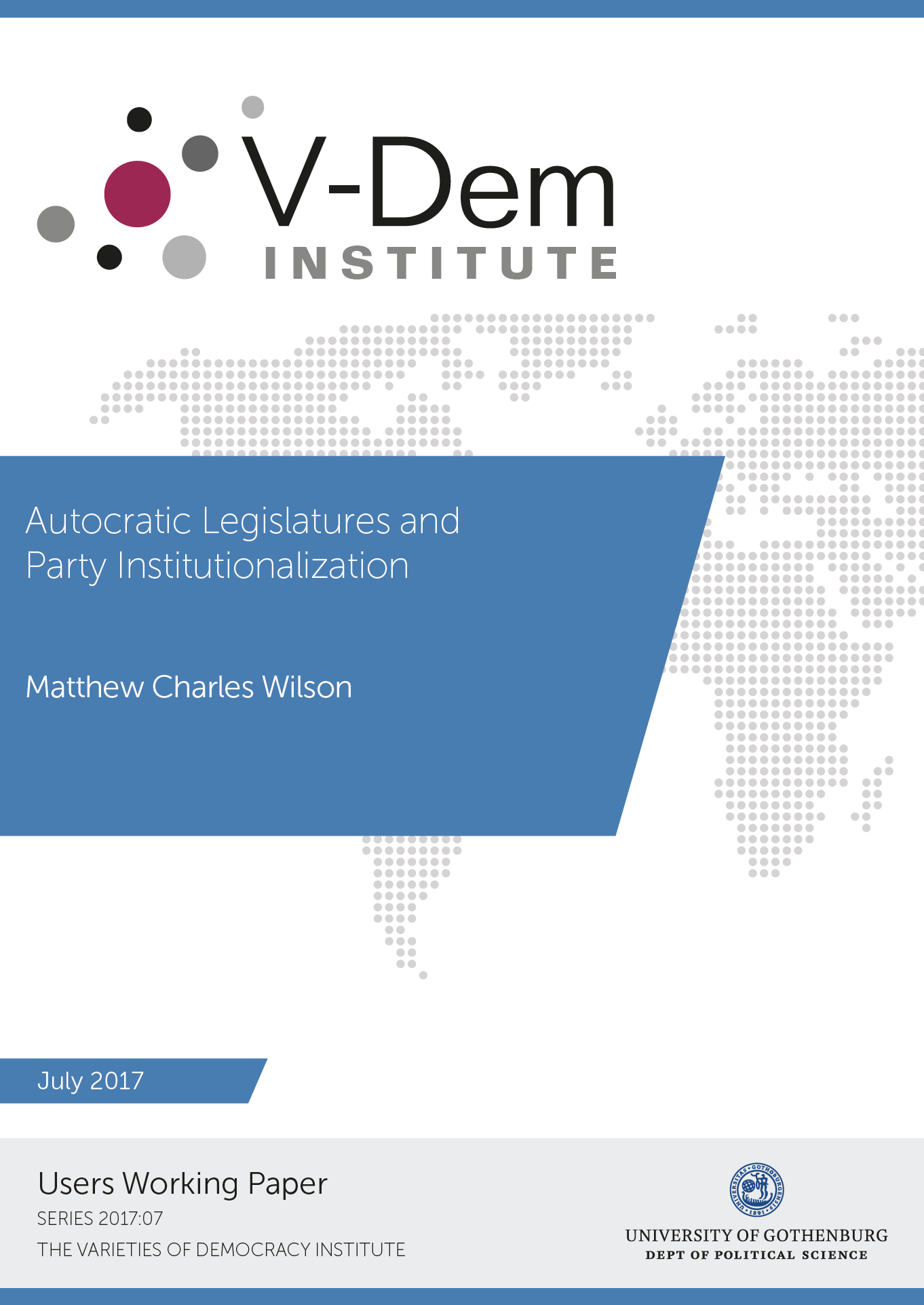
|
UWP #07 | Autocratic Legislatures and Party Institutionalization | Matthew Charles Wilson | University of Gothenburg, Varieties of Democracy Institute: Users’ Working Paper No. 7. July 2017 |
What explains the institutionalization of political parties in non-democratic settings? Drawing on the work of scholars who portray institutions as a response to credible regime threats, I argue that institutional choice in non-democracies depends in large part on the extent to which the masses are mobilized. In countries in which citizens posed little threat to state formation, regimes were significantly less likely to rely on party institutionalization to gain legitimacy—instead, they focused on building institutions that co-opted individual elites, which is accomplished in part through nonpartisan legislatures. In contrast, the credibility of threats presented by mass groups prompted the emergence and strengthening of party-based rule, which did not necessarily connote democratization. Using newly released data from the Varieties of Democracy Project (V-Dem) I evaluate the determinants of party institutionalization, showing that internal armed conflict is a positive predictor of greater party institutionalization in less democratic states. The same is not true of the most intense conflicts, however, underscoring the difference between the threat versus the realization of large-scale revolution. By focusing on mass opposition and party institutionalization, this study supports policymakers’ endeavors to better understand the relationship between power asymmetries, commitments, and institutions.<br/><br/> |
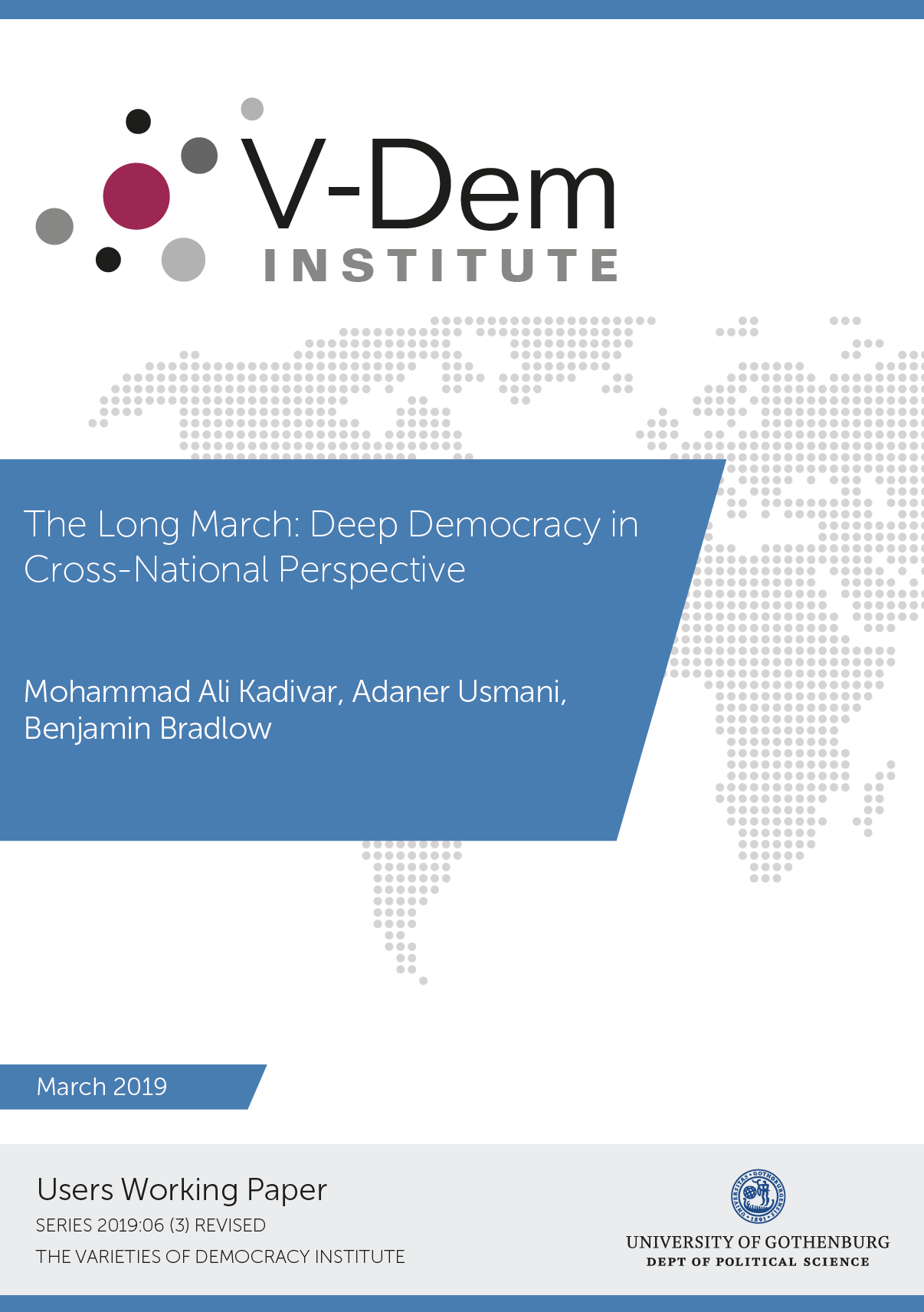
|
UWP #06 | The Long March: Deep Democracy in Cross-National Perspective | Mohammad Ali Kadivar, Adaner Usmani, Benjamin H. Bradlow | University of Gothenburg, Varieties of Democracy Institute: Users’ Working Paper No. 6 (3) Revised. March 2019 |
Over the last several decades, dozens of dictatorships have become democracies. Yet while each has held free and fair elections, they have varied in the extent to which their citizens realize the ideal of self-rule. Why do some democracies distribute power to citizens while other democracies withhold it? Existing research is suggestive, but its implications are ambiguous. Cross-national studies have focused on democracy’s formal dimensions, while work on substantive democracy is case-based. We find that one of the most consistent and powerful explanations of substantive democratization is the length of unarmed pro-democratic mobilization prior to a transition. Through a case study of Brazil, we illustrate that these movements matter in three ways: first, because practices of self-organizing model and enable democratic reforms; second, because movement veterans use state office to deepen democracy; and third, because long movements yield civil societies with the capacity to demand the continuous deepening of democracy.<br/><br/> |
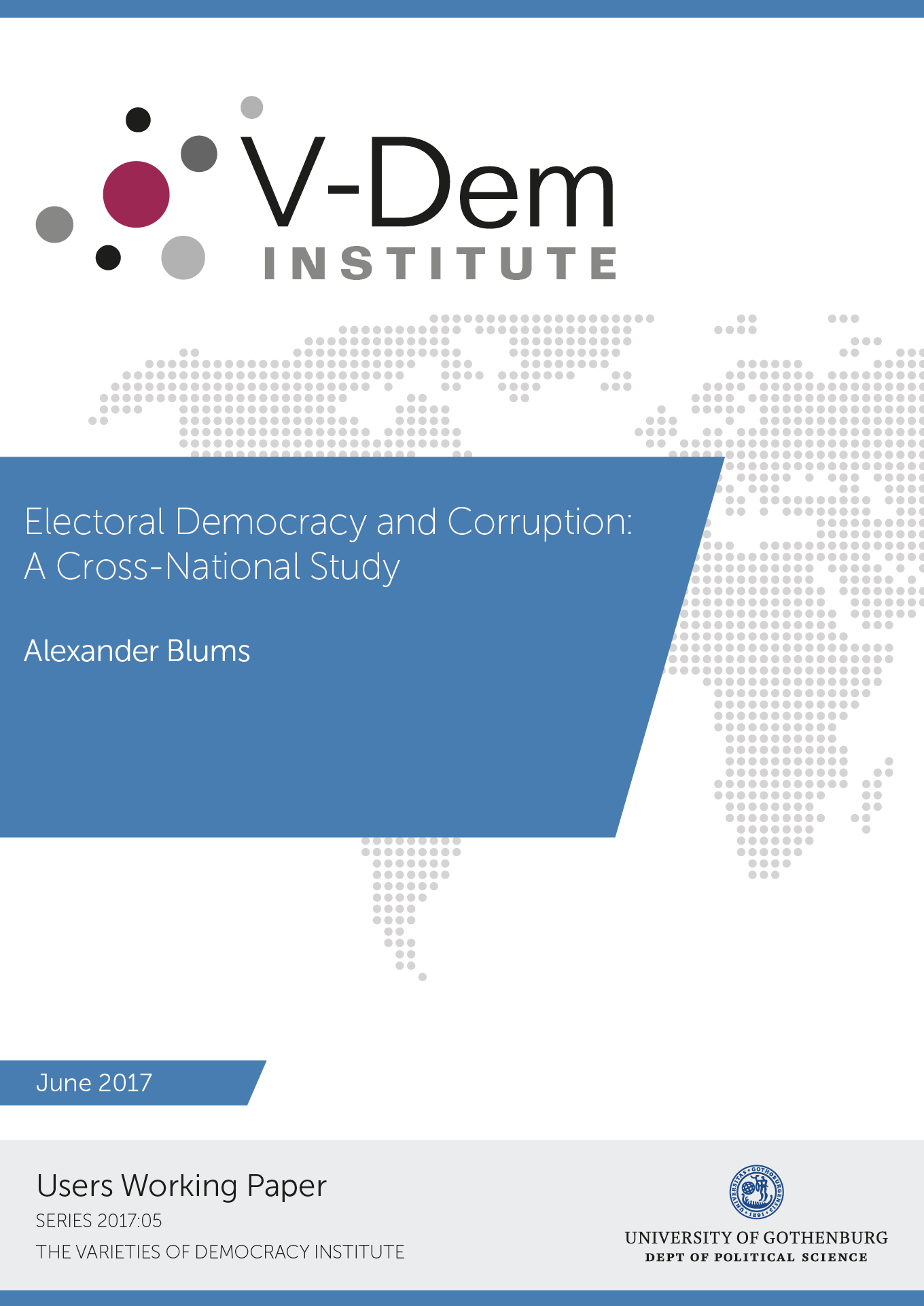
|
UWP #05 | Electoral Democracy and Corruption: A Cross-National Study | Alexander Blums | University of Gothenburg, Varieties of Democracy Institute: Users’ Working Paper No. 5. June 2017 |
This paper adds to the academic debate on if and how corruption levels vary with changing levels of democracy. I begin by positioning my work among existing academic research, identifying causal mechanisms for the relationship and addressing some of the concerns associated with defining and measuring corruption and democracy. I then propose two hypotheses: (H1) that democracy levels affect perceived corruption levels in the short-term (institutional explanation) and (H2) that democracy levels affect perceived corruption in the long-term (cultural explanation). I control for other variables commonly cited in the literature, such as economic development, levels of Protestantism and colonial heritage. This is the first comparative research paper exploring the relationship between democracy and corruption to utilize the recently published “Varieties of Democracy v6.2” dataset, which contains high-quality data on historical democracy levels for most countries around the world. To test the hypotheses, I build 6 OLS regression models containing data on 173 countries, utilizing 1436 data points. Contrary to much of the academic literature, this study finds that when controlling for economic development, levels of Protestantism and colonial heritage, democracy levels remain a statistically significant predictor of corruption in both the short and long term. The results of this study suggest a need to re-visit previously popular short-term institutional explanations of corruption. The study also notes some interesting observations and identifies gaps in the literature where future research would be needed to develop a more holistic explanation of corruption.<br/><br/> |
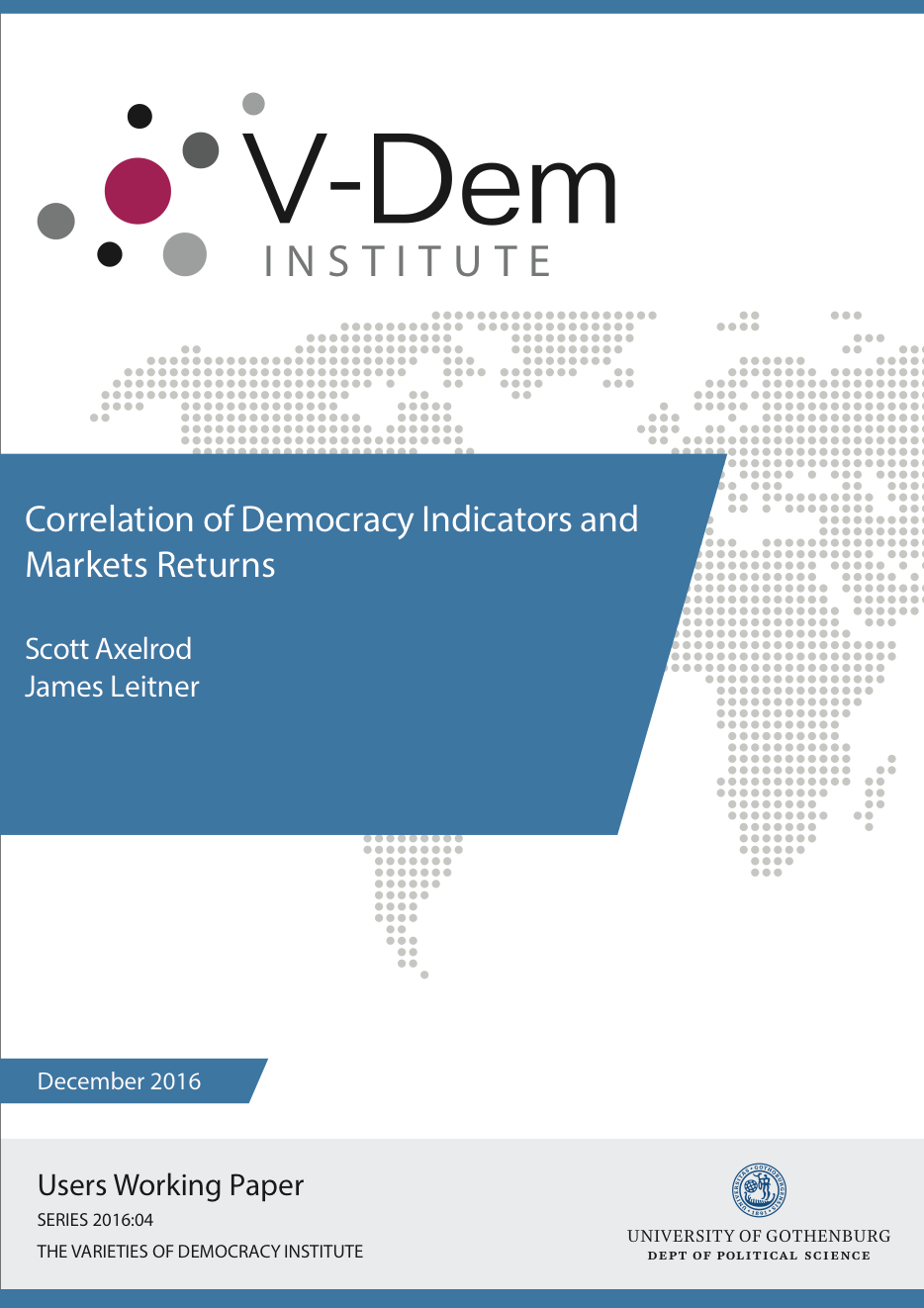
|
UWP #04 | Correlation of Democracy Indicators and Markets Returns | Scott Axelrod, James Leitner | University of Gothenburg, Varieties of Democracy Institute: Users’ Working Paper No. 4. December 2016 |
We perform various experiments correlating past changes of social indicators about a country with future stock market returns for that country. The 169 social indicators we use, which go back as far as the year 1900, are available from the Varieties of Democracy Project. We use two sets of data for country-wide stock market returns: data compiled by Dimson, Marsh, and Staunton covers 17 countries going back to 1900, and data from the MSCI data analytics and index service covering 45 countries going back as far as 1970. We consider five and ten year time windows. This gives us four different “studies”: MSCI 10 year, DMS 10 year, MSCI 5 year, and DMS 5 year.<br/><br/><br/><br/>We find the striking result that good changes of the social indicators have a positive mean (averaged over studies) total correlation (correlation of change vectors indexed by country-year pairs) with future stock market returns in 157 out of 158 cases in which the indicator measures something good or bad for society. We obtain a result almost as strong when the correlation is aggregated differently using the separate country and year groupings. We perform statistical hypothesis testing to show that, even though the social indicators are not all independent, these result are exceedingly unlikely to be the result of random (white noise) stock market returns.<br/><br/><br/><br/>We also perform “positive linear regression” of stock market return on all 158 indicators, which means that the sign of the regression coefficient for an indicator is constrained to be positive or negative according to whether a positive change of the indicator is good or bad. The fraction of data explained by positive regression is shown to be extremely statistical significant. We calculate a confidence interval for the percentage of data genuinely explained by regression, not just by fitting to noise. The lower end of the confidence window for the four studies is 11%, 14%, 6%, and 9%.<br/><br/><br/><br/>We include a long appendix on the statistical theory of correlation and (unconstrained) regression. This provides background to the novel applications of hypothesis testing and confidence interval calculation in the body of the paper. |
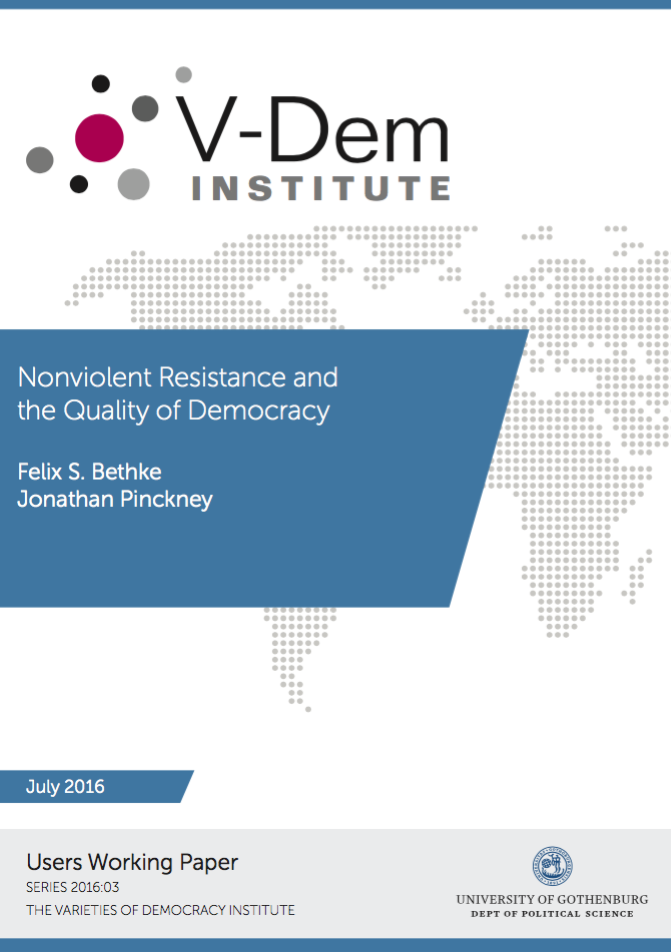
|
UWP #03 | Nonviolent Resistance and the Quality of Democracy | Felix S. Bethke, Jonathan Pinckney | University of Gothenburg, Varieties of Democracy Institute: Users Working Paper No. 3. July 2016 |
Previous research has shown that successful nonviolent resistance (NVR) campaigns are more likely to promote the growth of democratic political systems compared to violent revolutions. The decentralized organizational structure and pluralistic practices of nonviolent campaigns serve as a template for future political arrangements during and after the initial democratic transition. However, research to date has not disaggregated this finding to address the mechanisms and pathways that produce these effects on democratic quality. In this paper we address this gap by analyzing the effect of NVR on the quality of democracy for a sample of 101 regimes between 1945 and 2010, using an index of polyarchy and its sub-components: (1) elected executive, (2) free and fair elections, (3) freedom of expression, (4) associational autonomy, and (5) inclusive citizenship. Using local linear matching and differences-in- differences estimation, we find that initiating a democratic transition through NVR improves democratic quality after transition significantly and substantially relative to cases without this characteristic. Our analysis of the sub-components of polyarchy reveals that this positive effect comes about primarily due to improvements in freedom of expression, with no significant difference along the other dimensions of polyarchy. |
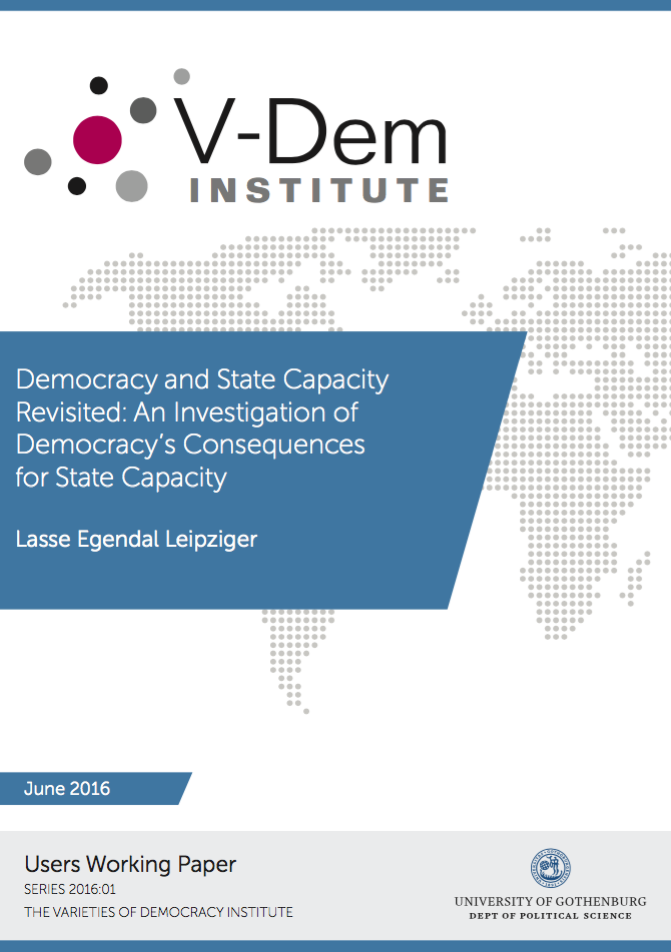
|
UWP #01 | Democracy and State Capacity Revisited: An Investigation of Democracy’s Consequences for State Capacity | Lasse Egendal Leipziger | University of Gothenburg, Varieties of Democracy Institute: Users Working Paper No. 1. June 2016 |
Does democracy foster increased state capacity? An answer to this question has crucial implications for many countries that have democratized during the Third Wave of Democratization but demonstrate serious shortcomings in terms of state capacity. In this paper, I critically examine existing theoretical work on the topic, in particular the notion of J-shaped relationship, and subsequently develop three causal pathways through which democracy might enhance the administrative capacity of the state. Two hypotheses are derived expecting a) that a country’s level of democracy affects its administrative capacity, and b) that the duration of the democratic regime affects its administrative capacity. The hypotheses are subjected to empirical assessment trough a statistical, time-series cross-sectional analysis of 122 countries during the third wave. For this purpose, I use V-Dem data1 which is arguably better suited for the empirical assessment compared to existing indicators. The results from the empirical evaluation suggest that the contemporary level of democracy has no robust impact whereas the extent of experience with democracy appears to have a positive and substantively interesting effect. I conclude that democracy does advance state administrative capacity, but only when considered as a cumulative, historical phenomenon. |
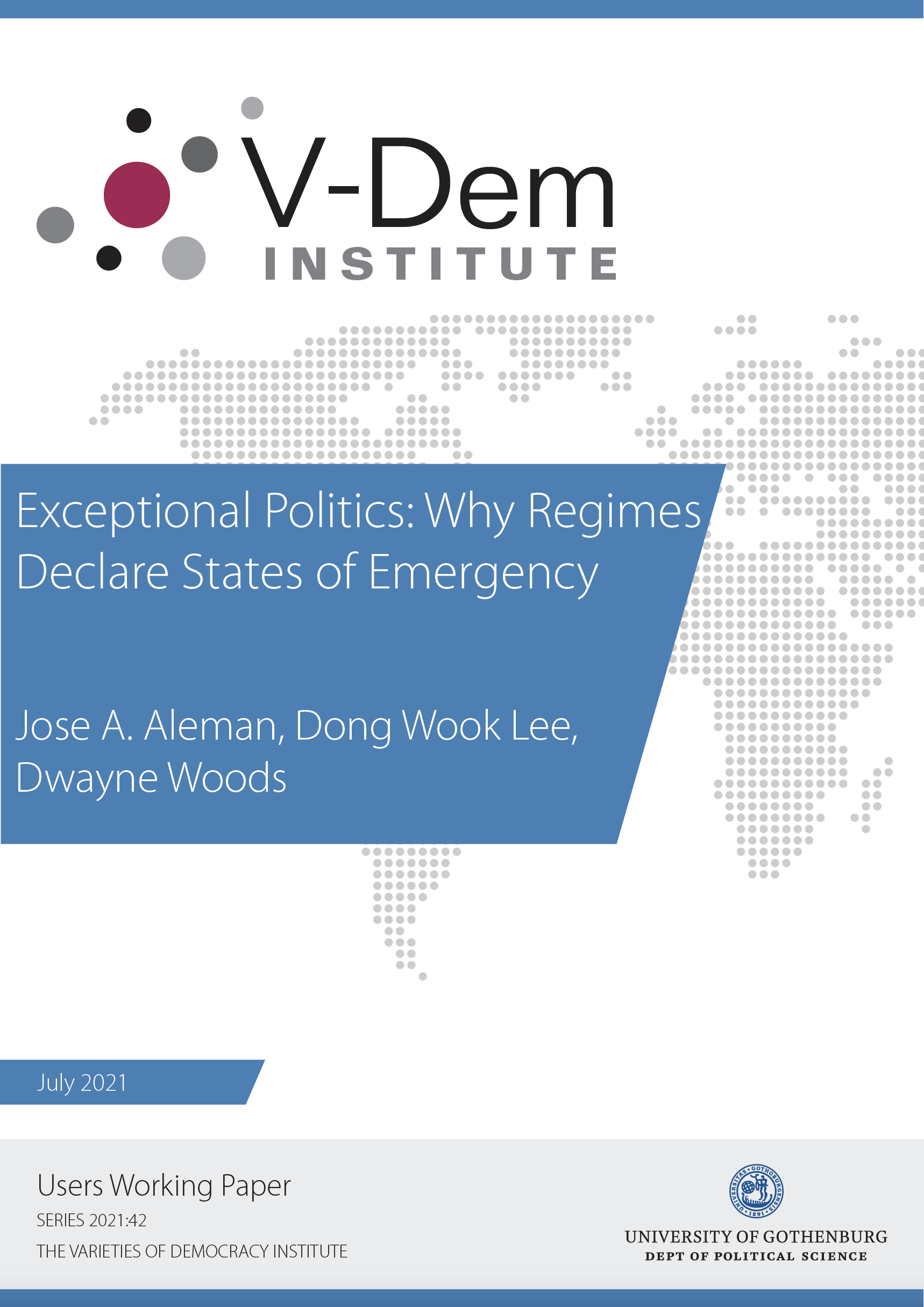
|
UWP #42 | Exceptional Politics: Why Regimes Declare States of Emergency | Jose A. Aleman, Dong Wook Lee, Dwayne Woods | This paper has been removed upon the authors' request. For any questions, please directly contact the authors. |
The political world is full of heterogeneity. The relationship between regime type and the enactment of a state of emergency is indicative of such heterogeneity. Almost all political regimes have enacted states of emergency at some point but presumably for different reasons. Exploring such heterogeneity requires conceptual and empirical models that incorporate micro-level strategic decisions, institutional factors, as well as spatial and temporal non-linearities. The effect of regimes in determining the timing and purpose of states of emergency is examined in this article. We distinguish between the onset of a state of emergency and its continuation. This yields the novel finding that executive constraints primarily affect the second phenomenon but not the first. We also observe that because they experience more internal conflict, multiparty dictatorships more frequently declare emergencies. However, personalism – or the quest by an incumbent to make power less collegial and more concentrated – interacts significantly with multiparty autocracies to delay the onset of (and decrease the incidence of) emergency governance.<br/> |
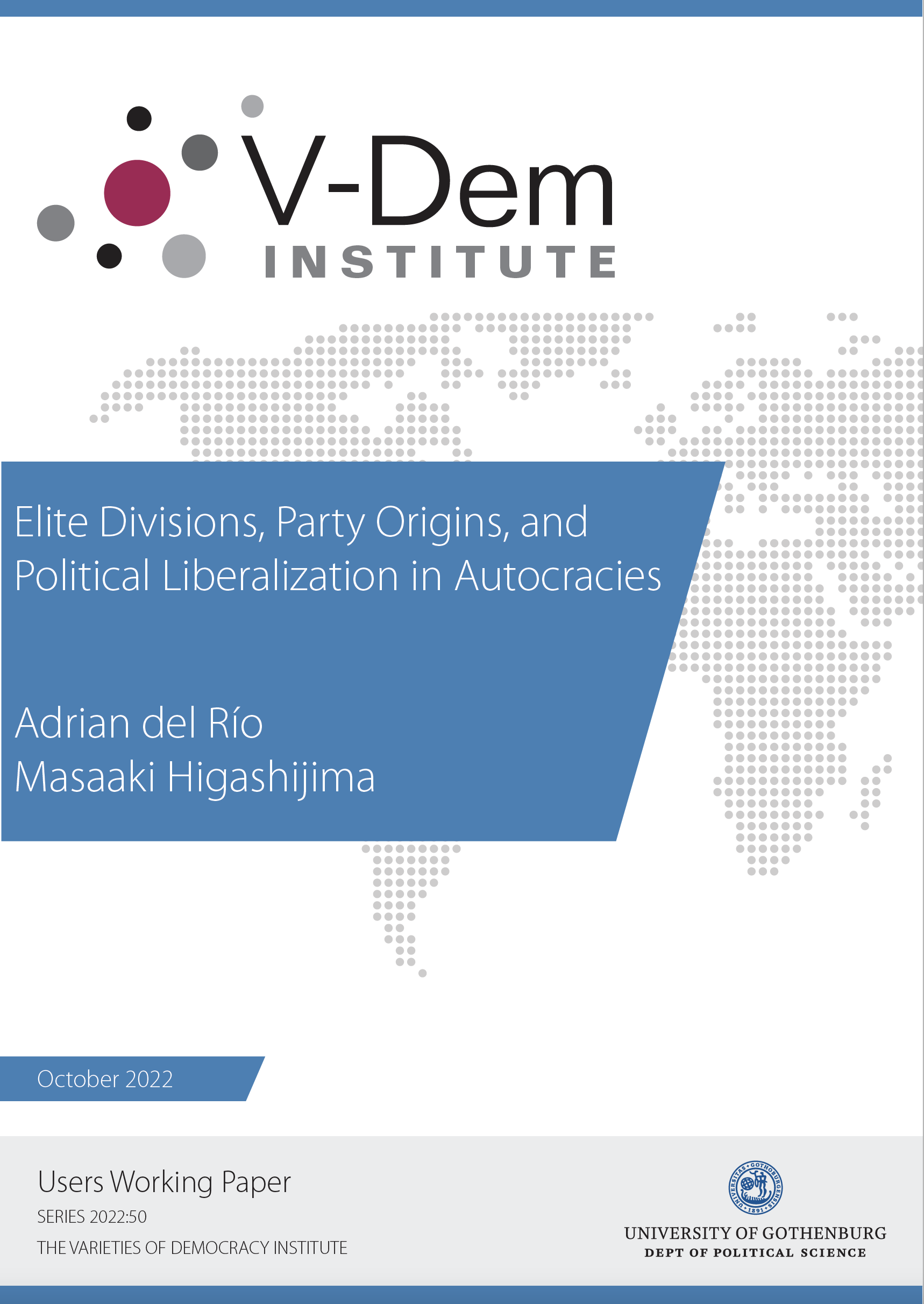
|
UWP #50 | Elite Divisions, Party Origins, and Political Liberalization in Autocracies | Adrian del Río, Masaaki Higashijima | University of Gothenburg, Varieties of Democracy Institute: Users’ Working Paper No. 50. October 2022. |
Internal elite divisions in autocracies are an important step toward political liberalization and democratic transitions. Yet, we know little about when and how such divisions contribute to initiating democratic reforms. We argue that whether elite divisions lead to political liberalization depends on authoritarian parties’ origins. Dictators with parties emerging from violent conflicts can effectively prevent elite divisions from pushing for democratic reforms through organized violence and eliminating alternative power centers. Dealing with endogeneity threats by employing the panel data matching estimator, cross-national statistical analyses demonstrate that internal elite divisions open up the prospect of political liberalization. However, such effects diminish when ruling parties were built during violent struggles such as through revolutions, independence movements, and insurgencies. Our findings also suggest that in the face of internal divisions dictators armed with such parties do not provide concessions to the opposition and are more likely to react with blatant repression and tighten political control, contributing to deterring the threats of internal divisions. |
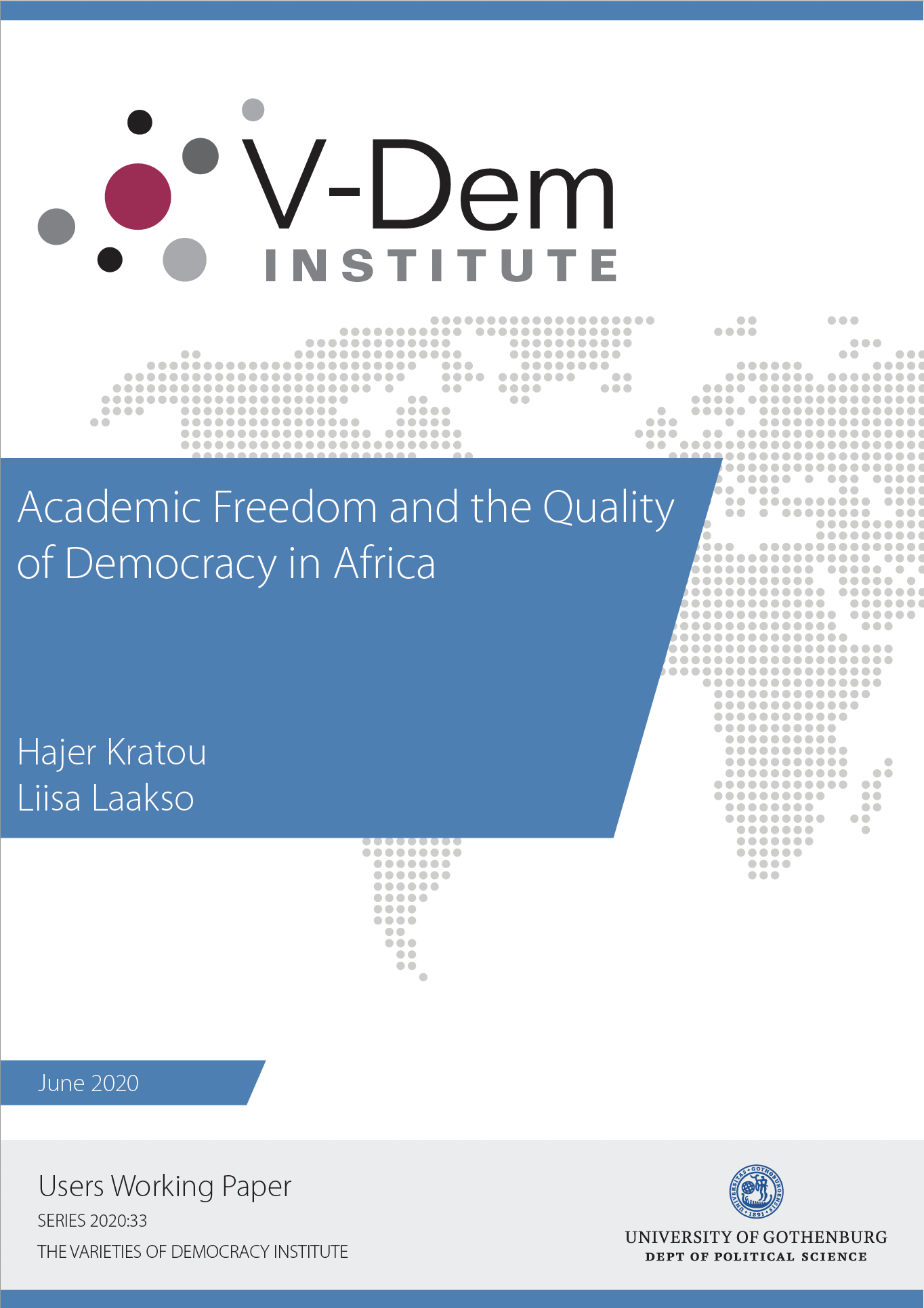
|
UWP #33 | Academic Freedom and the Quality of Democracy in Africa | Hajer Kratou, Liisa Laakso | University of Gothenburg, Varieties of Democracy Institute: Users’ Working Paper No. 33. June 2020. |
This paper analyzes the relationship between academic freedom and democracy, more precisely the impact of past experience of politically active scholars on subsequent quality of elections and the accountability of the executive. The empirical analysis covers Africa in the period 1980-2018. As a politically heterogeneous and changing continent, Africa provides adequate variety to investigate the role of scholars in democratic consolidation after democratic transitions in the early 1990s. Using the Varieties of Democracy (V-Dem) database and the Generalized method of moments (GMM system) technique to estimate a dynamic panel model, our study finds a positive impact of academic freedom on democracy for a sample of 52 countries. We look in more detail at deviant cases with a counterintuitive relationship. The key finding is that this result is robust when we check the reversal causality and country-specific effects such as the initial level of democracy or the dependence on oil exportation. The study highlights the significance of scholars as a channel through which high levels of education supports democratic consolidation.<br/><br/> |
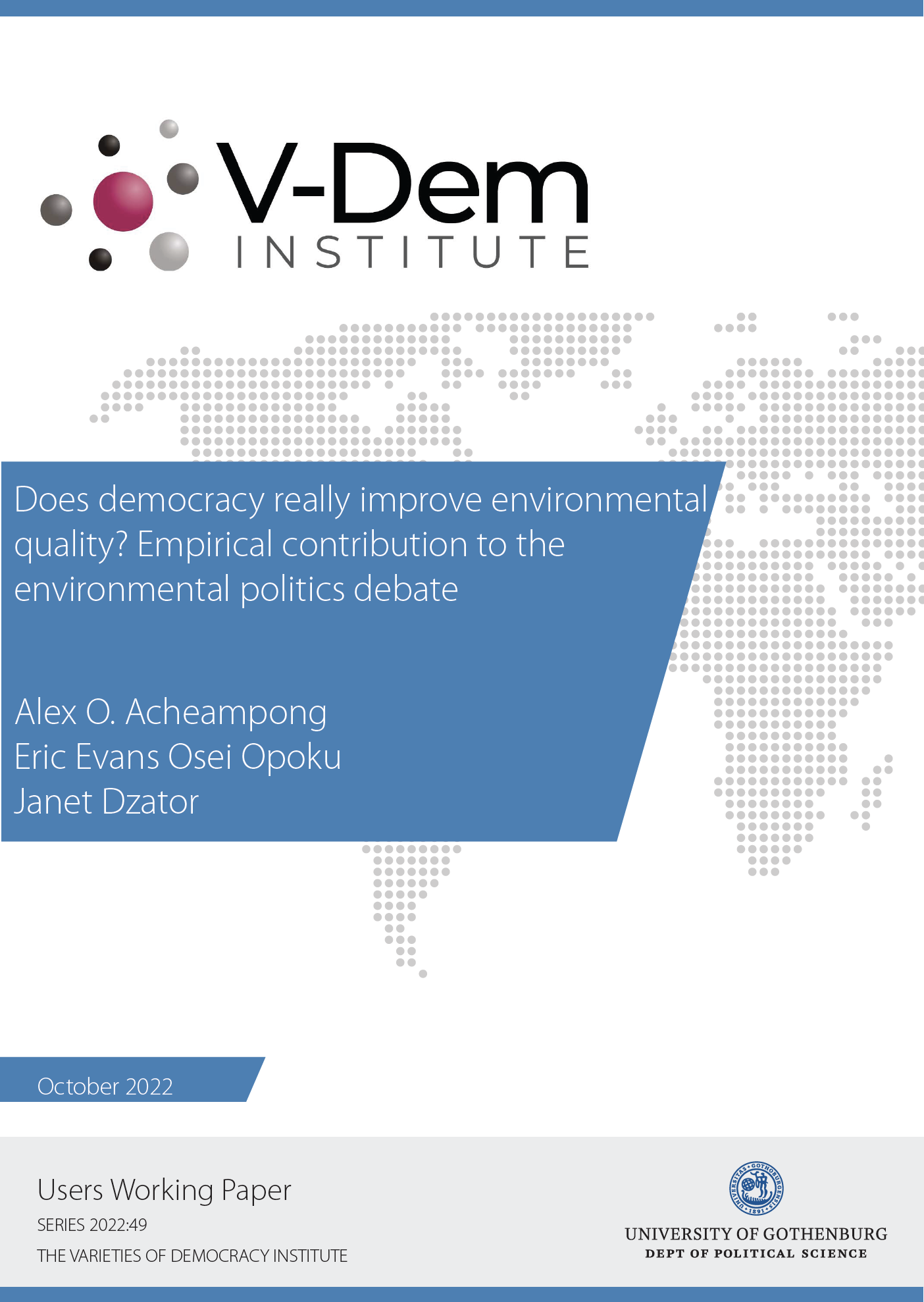
|
UWP #49 | Does democracy really improve environmental quality? Empirical contribution to the environmental politics debate | Alex O. Acheampong, Eric Evans Osei Opoku, Janet Dzator | University of Gothenburg, Varieties of Democracy Institute: Users’ Working Paper No. 49. October 2022. A modified version of this paper is published as Acheampong, A.O., Opoku, E.E.O., and Dzator, J., 2022. Does democracy really improve environmental quality? Empirical contribution to the environmental politics debate. Energy Economics, 109, p.105942. doi: https://doi.org/10.1016/j.eneco.2022.105942 |
The theoretical debate on democracy—environment remains contentious in the environmental politics literature. The existing empirical studies have attempted to explore the effect of democracy on environmental degradation. However, there are limitations in these studies regarding how democracy is measured. Also, the prior empirical studies have been silent on how democracy moderates the effect of economic growth and energy consumption on the environment. In this study, we employed dynamic and static econometric techniques to explore the effect of democracy on the environment using comprehensive data for 46 sub-Saharan African countries (SSA). As institutionalised democracy is a multi-faceted concept, we follow the political science literature to use high-level democracy indices such as electoral, liberal, participatory, deliberative, and egalitarian democracy to examine their respective effect on environmental degradation. Using the dynamic system-GMM and Lewbel two-stage least squares technique to control endogeneity, our empirical results indicate that the high-level democracy indicators drive CO2 emissions in SSA. We also observed that the high-level democracy indicators moderate GDP per capita to reduce CO2 emissions in SSA. The regional analysis reveals that the high-level democracy indicators spur CO2 emissions in West Africa while reducing CO2 emissions in Southern and Central-Eastern Africa. Further, the high-level democracy indicators moderate GDP per capita to reduce CO2 emissions in West Africa while increasing CO2 emissions in Southern and Central-Eastern Africa. The findings also indicate that the high-level democracy indicators moderate energy consumption to increase CO2 emissions in West Africa and Central-Eastern Africa, not SSA and Southern Africa. These results are robust to using ecological footprint as a broader measure of environmental degradation. The policy implications of these findings for SSA and the sub-regions are discussed. |
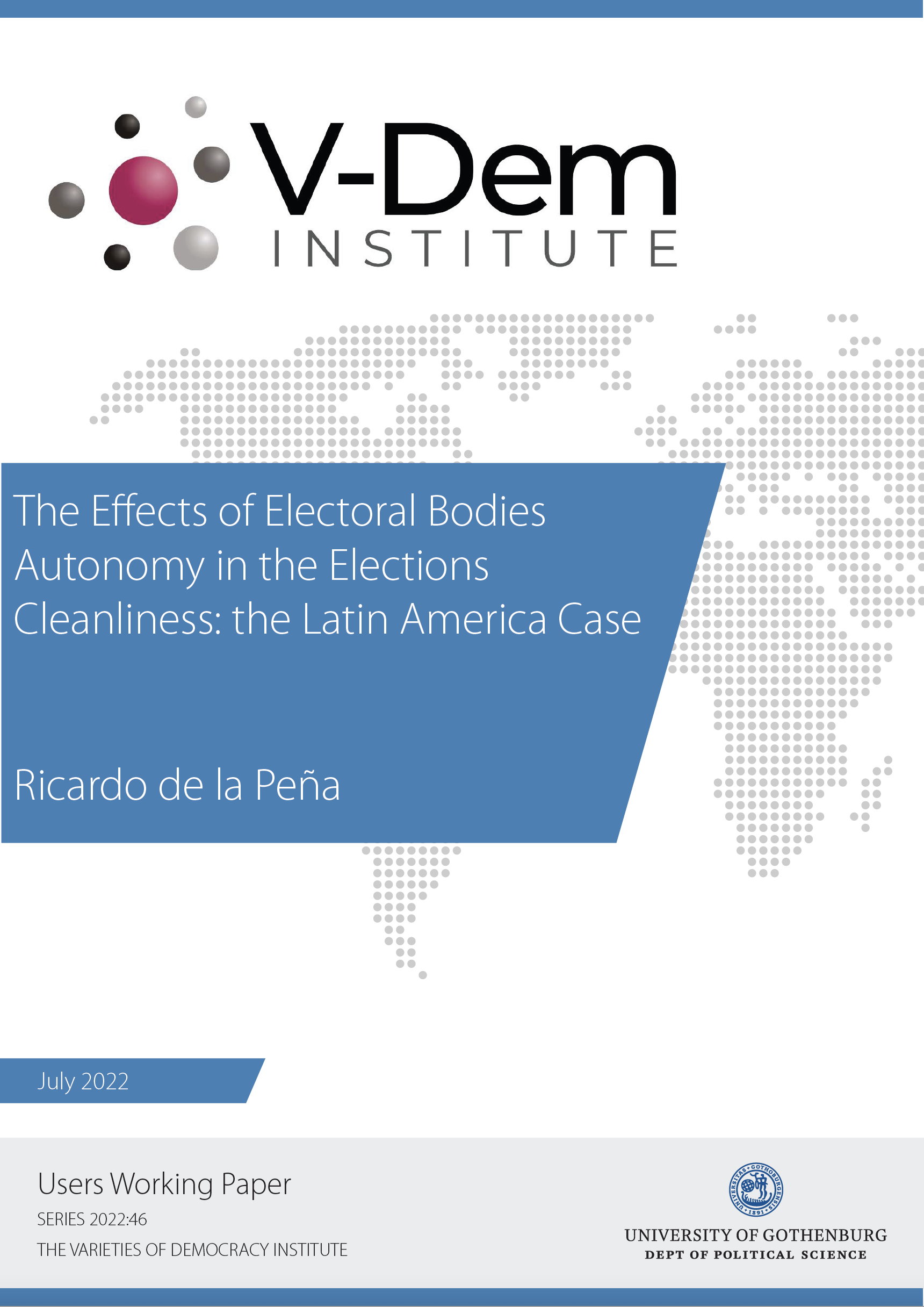
|
UWP #46 | The Effects of Electoral Bodies Autonomy in the Elections Cleanliness: the Latin America Case | Ricardo de la Peña | University of Gothenburg, Varieties of Democracy Institute: Users’ Working Paper No. 46. July 2022. |
Democratic systems have regular elections, which supposes the existence of one or more organisms in each nation in charge of organizing the elections. Electoral governance is supposed to have an impact on the quality of the processes and democracy itself. Formally, the integration and composition of the electoral bodies generate differences due to the number of management bodies, the duration of their mandates, the way in which their members are selected, their level of professionalization and links with parties and the government, their condition of autonomy and financial sufficiency, their capacity for legislative initiative and the level of involvement of the political parties in their decisions for the organization of the elections. In practice, it is essential to review and verify the effective existence, meaning and magnitude of the impact of electoral bodies and their autonomy regarding issues related to the quality of processes and democracy in Latin American nations. For this, it is necessary to resort to one of the most complete sources of information to conceptualize and measure democracy in the countries of the world through the compilation of a multidimensional and disaggregated set of data that aims to reflect the complexity of the phenomenon: the Varieties of Democracy (V-Dem) project, which provides indices on democracy and electoral cleanliness and indicators on the autonomy and sufficiency of electoral bodies by country and year, which can be crossed with indicators for each election on electoral participation, vote buying and other irregularities, government intimidation and other forms of violence, as well as acceptance of defeat, in addition to an estimator of cleanliness and perceived freedom in each process. The exploitation of these data and the analysis of the relationship between the indicators by election and the annual estimators for the region will be the task that we will address in this paper. |
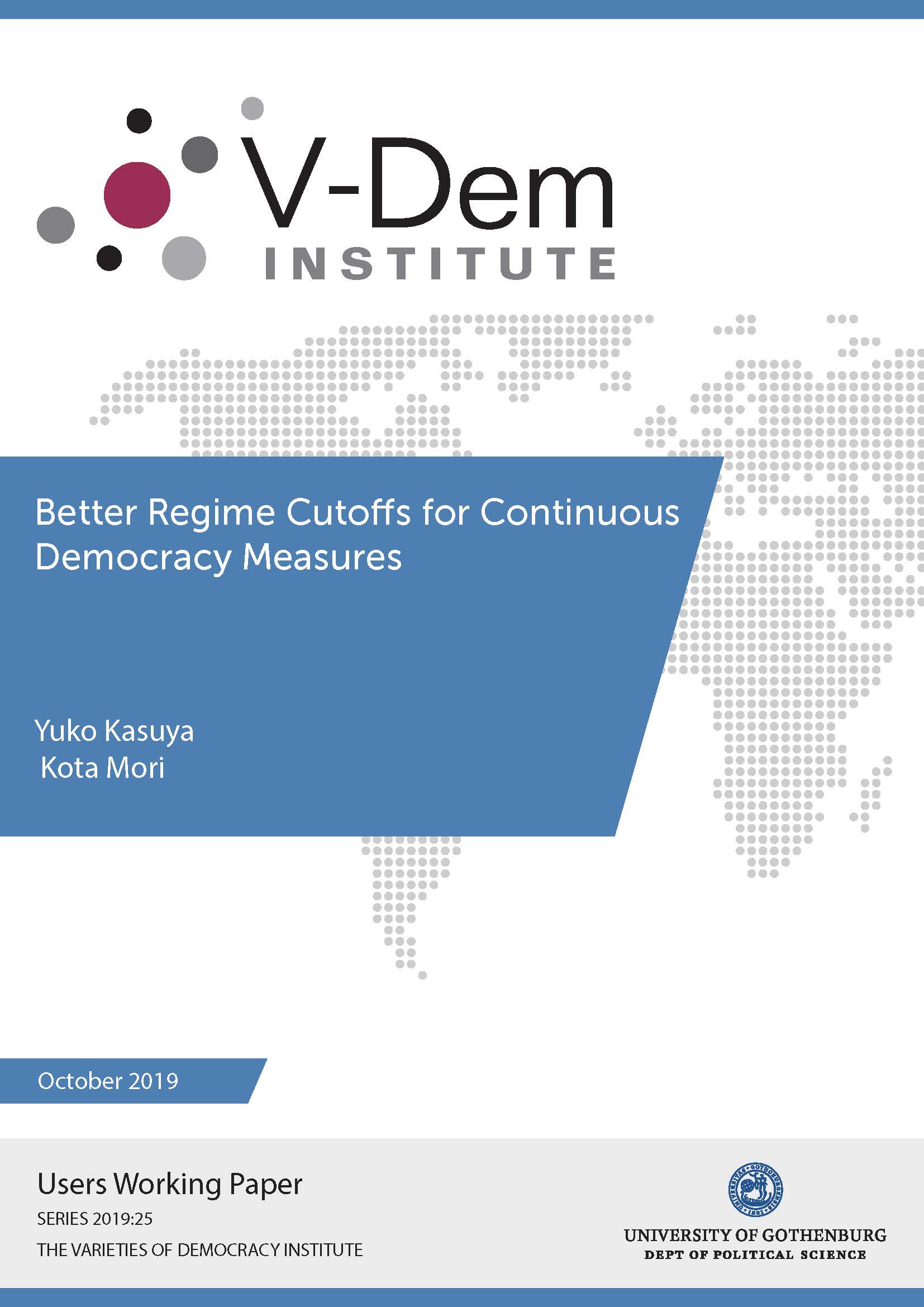
|
UWP #25 | Better Regime Cutoffs for Continuous Democracy Measures | Yuko Kasuya, Kota Mori | University of Gothenburg, Varieties of Democracy Institute: Users’ Working Paper No. 25. October 2019 |
Many vital questions in comparative politics and international relations concern the transition to and from democracy. This tradition makes the measurement of democracy, in particular, the threshold between democracy and non-democracy, a crucial issue. However, the field is filled with arbitrary and inconsistent uses of democracy cutos. We examine the validity of the cut points suggested by the most frequently used continuous measures of democracy, namely, Freedom House (FH), Polity, and the Varieties of Democracy (V-Dem). Our analyses use the binary measures of democracy as the reference because they reflect a theoretically informed set of conditions of democracy, a feature that is lacking in the continuous measures’ cut points. In particular, we presume that the preferred threshold should achieve the highest consistency with the binary measures’ coding when the regime is defined based on that threshold. Our analyses find that such cutos are 3.7 for FH, 4.5 for Polity, and 0.42 for V-Dem, rather than those suggested by the providers of these measures (2.5, 6, and 0.5 respectively). This finding implies that three continuous measures of democracy set standards for democracy higher than the binary measures.<br/><br/> |
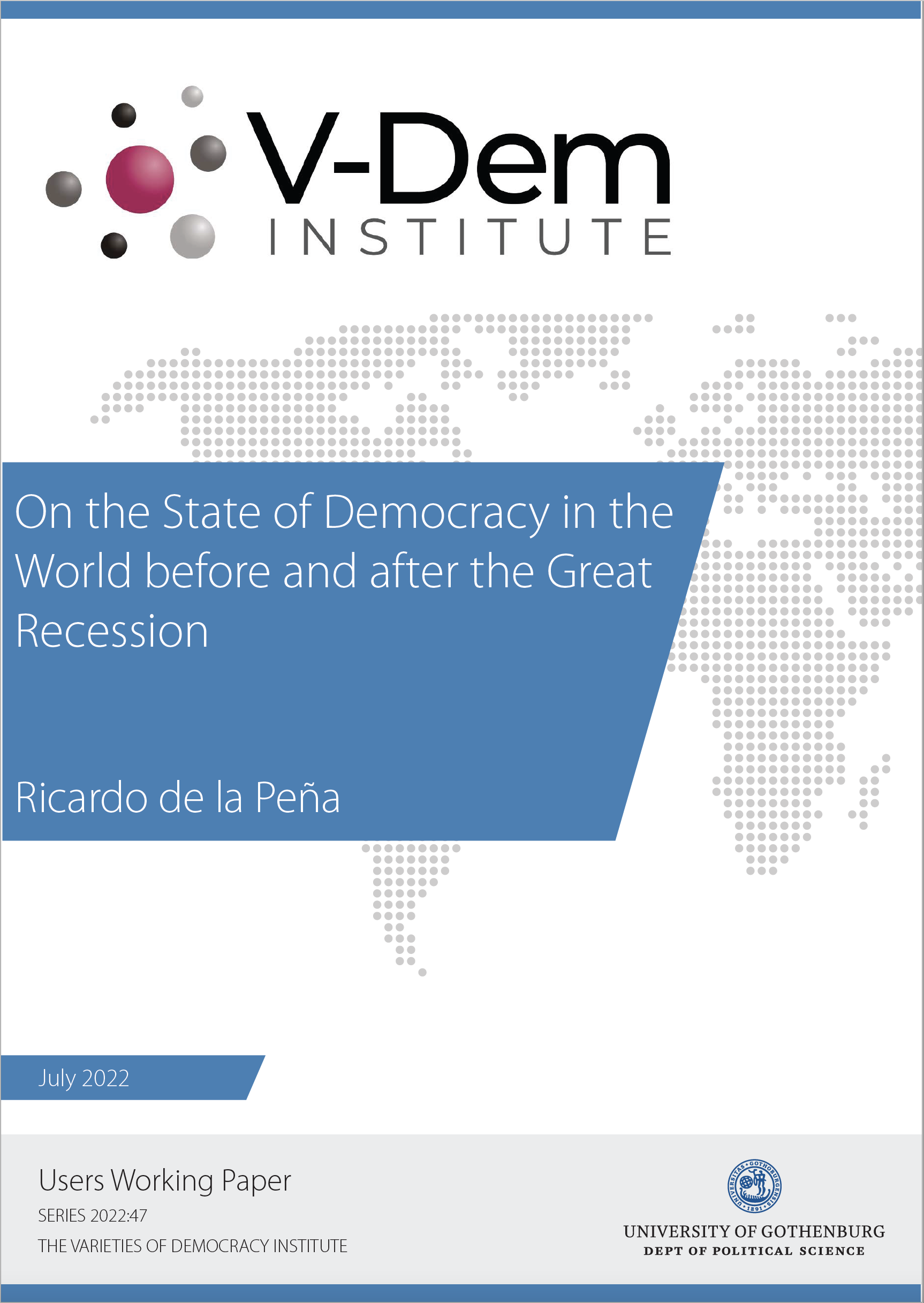
|
UWP #47 | On the State of Democracy in the World before and after the Great Recession | Ricardo de la Peña | University of Gothenburg, Varieties of Democracy Institute: Users’ Working Paper No. 47. July 2022. Published in Spanish as "Sobre el estado de la democracia antes y después de la Gran Recesión", in: Los dilemas de la democracia en México en el contexto de América Latina, 13-31. México: Sociedad Mexicana de Estudios Electorales, 2022. |
Much has been said about the impact of the Great Recession (2008-2009) on the conditions and foundations of democracy, especially in the Western world. But has it really been like this? Today we have various options to approach the comparative study of the state of democracy in the world through wide-ranging cross-sectional and longitudinal sections. Perhaps one of the most successful is that of Varieties of Democracy (V-Dem), whose approach to conceptualizing and measuring democracy is to provide a data set that attempts to reflect the complexity of the concept of democracy as a system of government that includes, but it goes beyond the simple presence of elections. For this reason, the V-Dem project collects data to measure different principles of democracy, one of which is the electoral one. In principle, the main finding of this documentary effort leads its authors to affirm that “autocratization”, a word with which they call the decrease in democratic features, has accelerated in the world, particularly when the existing state at the time of The Great Recession will occur with the present situation in 2019. This has to be reflected in the state of the principles in the electoral question. Detailing the scope and characteristics of this loss of democratic features in general and its manifestation in the electoral sphere throughout this century and between two ten-year cuts (2000-2009 and 2010-2019) is the task that we propose to carry out in this paper. . This, knowing that 2020 will represent a new watershed in the conditions for the development of democracy and elections in the world, given the experience of the Great Confinement, with a practice and hopefully temporary suspension of electoral exercises in the world and a return uncertain at the polls in which the repercussions of this event will gradually be seen in the spirit of the electoral bodies of the world. |
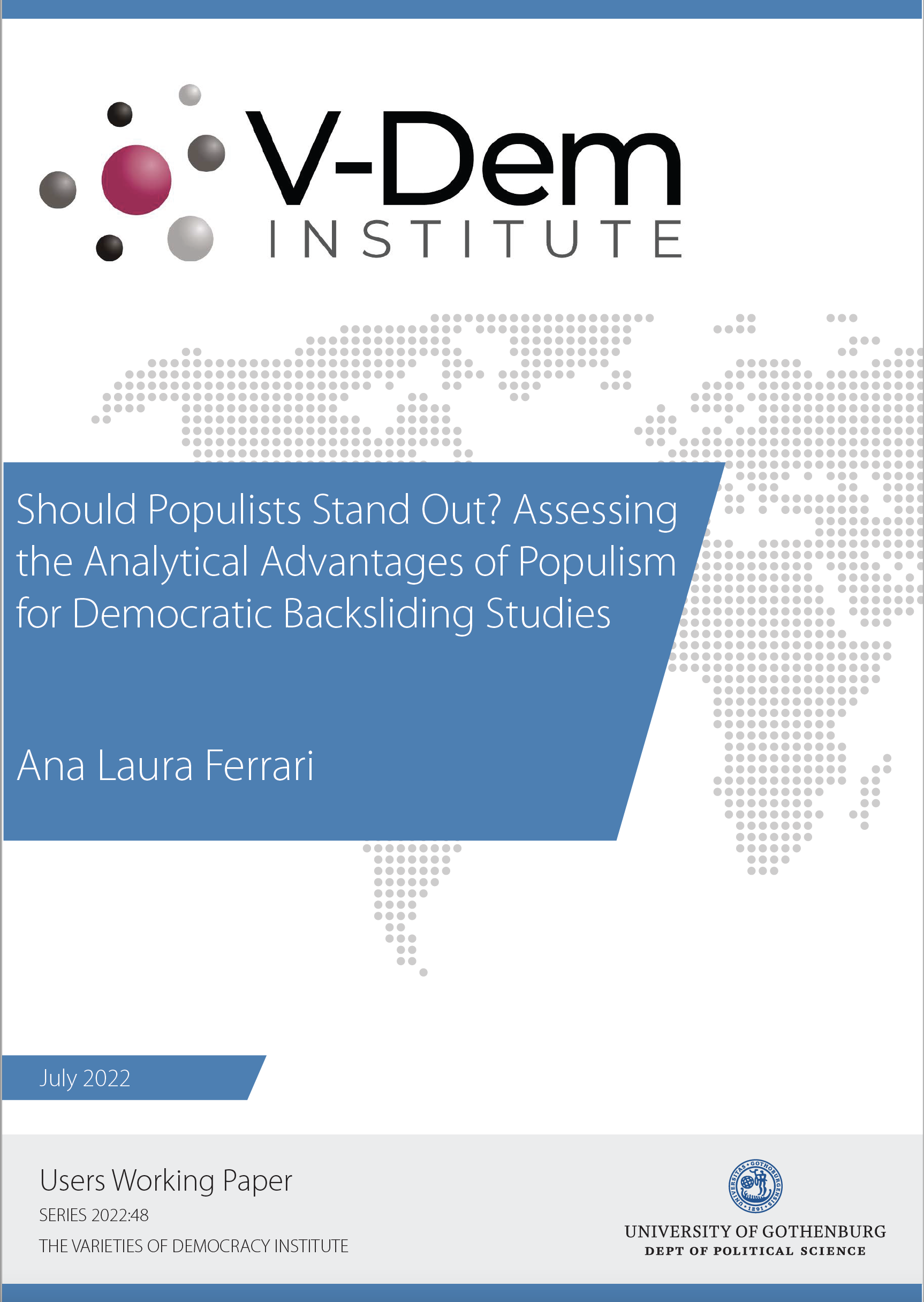
|
UWP #48 | Should Populists Stand Out? Assessing the Analytical Advantages of Populism for Democratic Backsliding Studies | Ana Laura Ferrari | University of Gothenburg, Varieties of Democracy Institute: Users’ Working Paper No. 48. July 2022. |
Scholars interested in democratic backsliding often highlight the presence of populism and call attention to populist cases. However, populism attracts controversy to research due to a lack of conceptual clarity. Against this backdrop, this paper questions whether populism brings more gains than disadvantages to democratic backsliding studies. To assess possible gains, I discuss two conceptual functions that could possibly offer analytical advantages to this research agenda, supporting scholars in explaining backsliding processes. First, I evaluate whether populism could address the influence of authoritarian preferences on backsliding processes. I argue that, although populism can be considered an anti-pluralist ideology that conveys political actors’ authoritarian-leaning inclinations, the concept embraces only a subset of authoritarian preferences’ manifestations. Therefore, this conceptual function brings a distortion to research that nullifies possible gains. Second, I investigate whether populism could distinguish a pattern of institutional change in backsliding processes. Through a case-comparison study between a populist (Hungary, 2010-2015) and a non-populist (Bulgaria, 2016-2019) episodes of democratic backsliding, I find that populism does not differentiate the strategies chief executives take to undermine democracy or the democratic dimensions under attack. Therefore, I conclude that populism does not offer analytical advantages but adds greater disadvantages to democratic backsliding studies. |
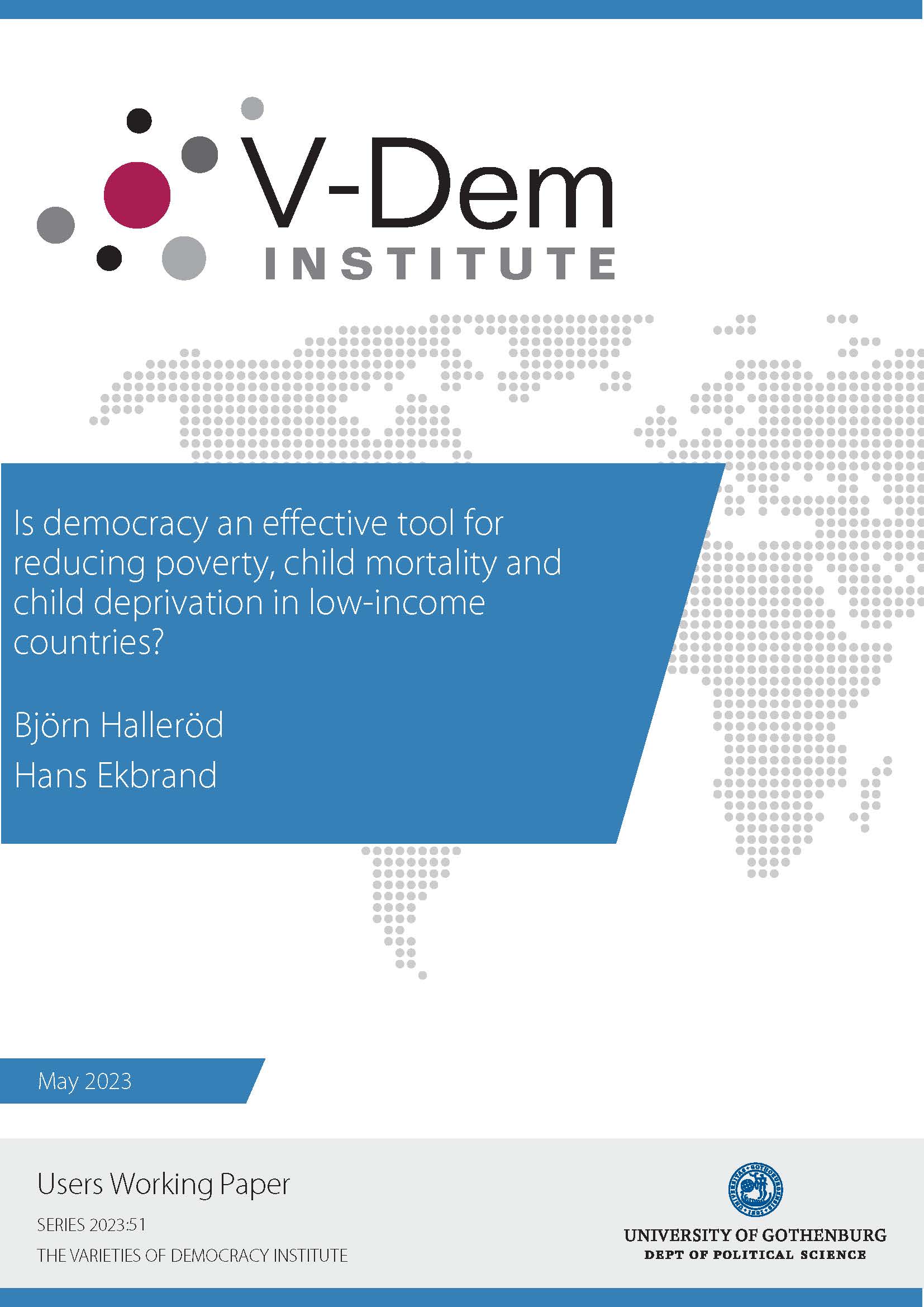
|
UWP #51 | Is democracy an effective tool for reducing poverty, child mortality and child deprivation in low-income countries? | Björn Halleröd and Hans Ekbrand | University of Gothenburg, Varieties of Democracy Institute: Users’ Working Paper No. 51. May 2023. |
Is democracy related to lower poverty rates and better living conditions for children in developing countries? Multiple sources have confirmed that living conditions in low- and middle-income countries have improved significantly during the past decade. This development coincides with a period of economic growth and, until recently, a trend towards increasing democratization of many of the world’s political systems. In the present paper, we use data from 51 low- and lower-middle income countries covering the period 1995-2019 to analyse: poverty ($1.90/day), child mortality as well as the degree to which children are malnourished, deprived of immunization, and lack education. The central aim is to test whether democracy contributes to the decrease in poverty and improvement of children’s living conditions. We also test whether the impact of democratization is conditional on political ideology, GDP, and corruption, i.e., whether democratization only is beneficial if combined with policies influenced by socialistic ideology, economic growth, or low corruption. Using data on living conditions from the World Bank, Demographic and Health Surveys (DHS), V-Dem project on democratization, and Global Leader Ideology database, we draw the following conclusions: Democratization does contribute to the decrease in poverty, child mortality, malnutrition and lack of immunization among children. However, the impact of democracy is conditioned on previous experience of leftist governments; democracy only improves living conditions in countries with a history of leftist governments. Least beneficial are leftist autocracies. We also conclude that democracy counterbalances the detrimental effects of corruption on children’s school attendance. |
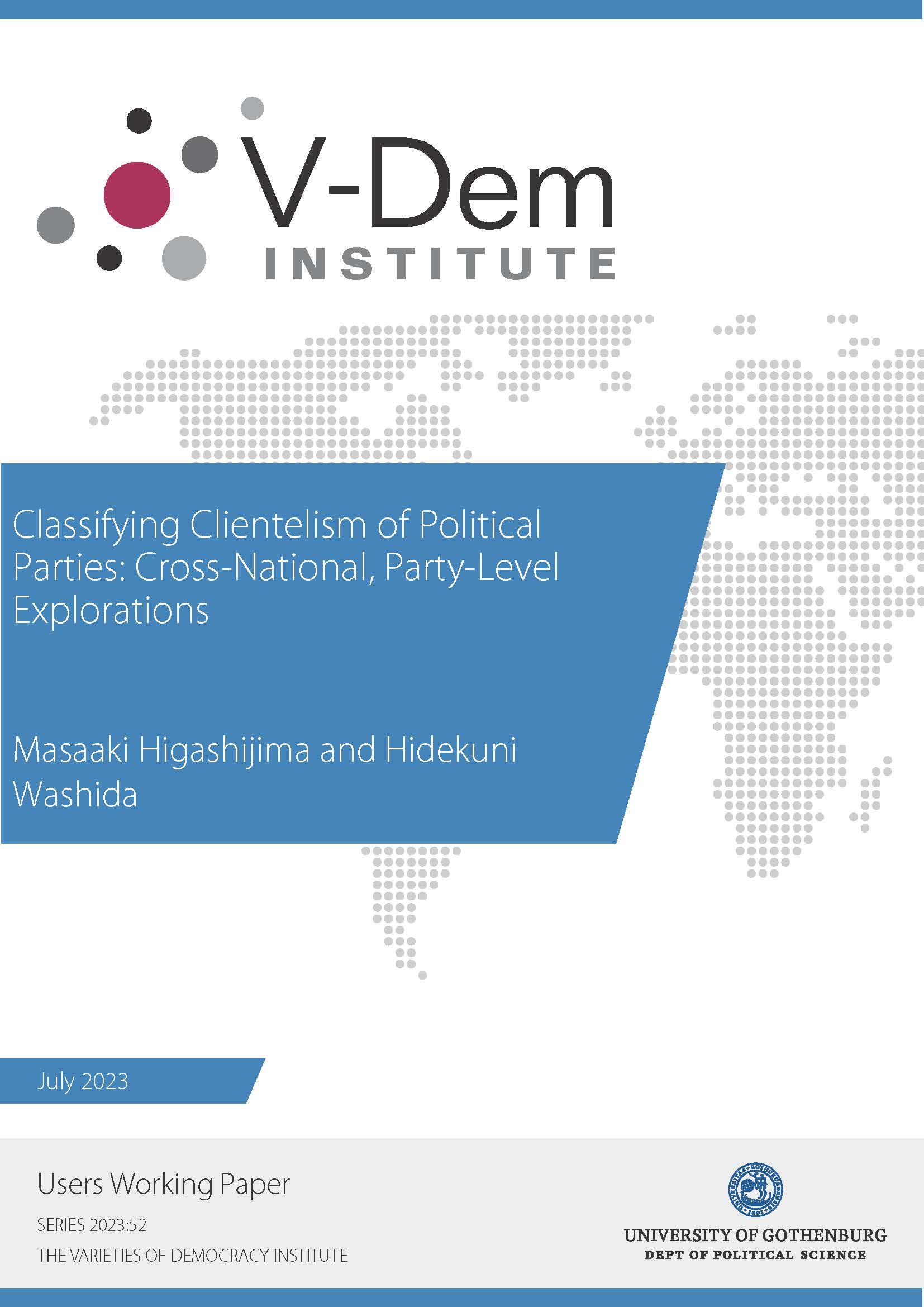
|
UWP #52 | Classifying Clientelism of Political Parties: Cross-National, Party-Level Explorations | Masaaki Higashijima and Hidekuni Washida | University of Gothenburg, Varieties of Democracy Institute: Users’ Working Paper No. 52. July 2023. |
Recent research on clientelism has focused on varieties of clientelism while suggesting that clientelistic exchanges differ in terms of the strength of monitoring and enforcement mechanisms whereby politicians deliver benefits to voters in exchange for political support. By using newly collectedV-Party data (1970-2019, 1,844 political parties from 165 countries), we identify two prominent types of clientelism that recent studies have suggested, relational clientelism and single-shot clientelism. While comparing our results with those based on other existing data sets, we suggest that it is important to unpack clientelistic linkages at the party level to grasp fine-grained differences in clientelism across parties within states. We then use our indicators to explore the relationship between democracy, development, and clientelism. Our analysis finds that relational clientelism persists even in rich and advanced democracies while the effect of democracy on single-shot clientelism has a curvilinear relationship with economic development. |
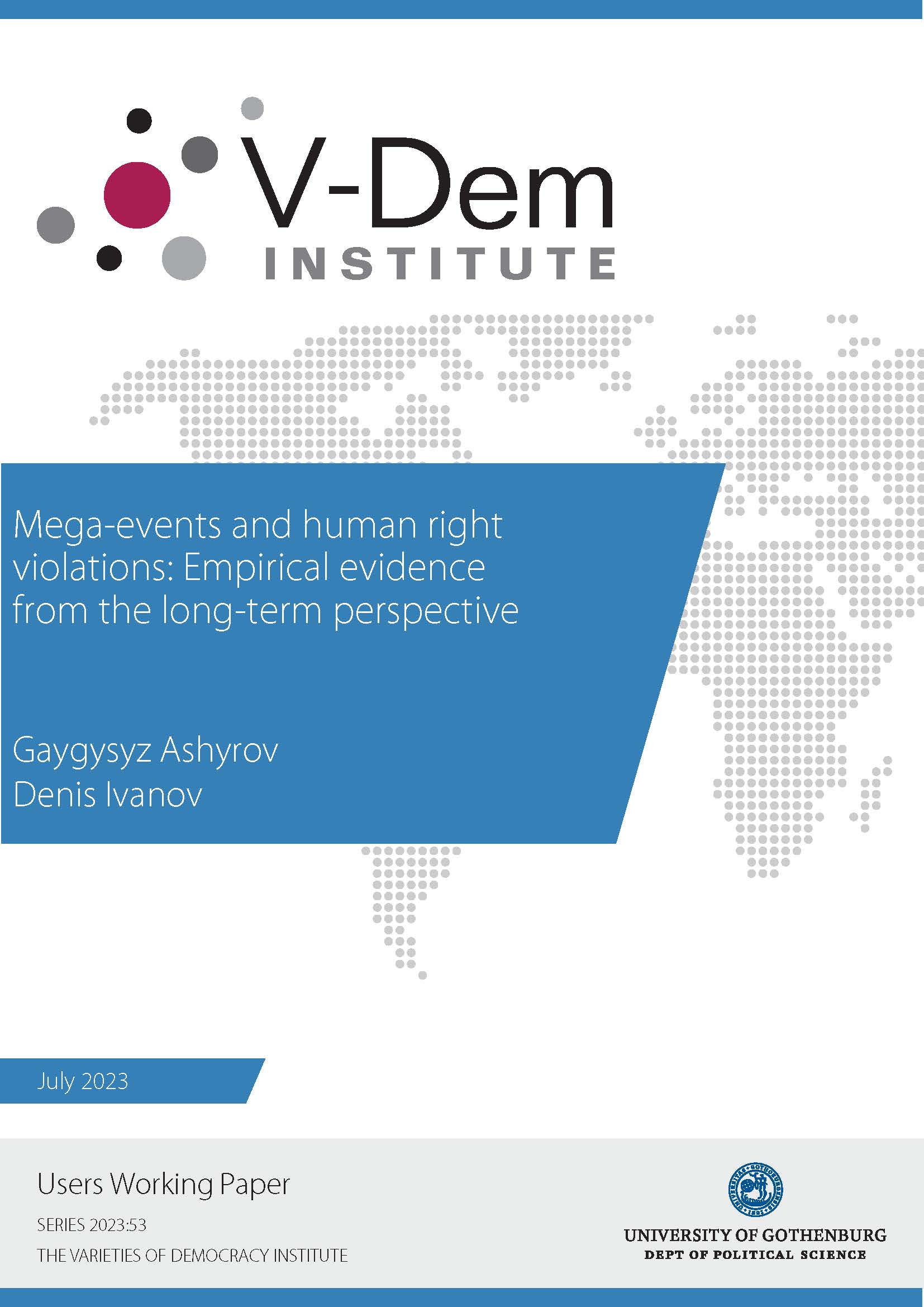
|
UWP #53 | Mega-events and human right violations: Empirical evidence from the long-term perspective | Gaygysyz Ashyrov and Denis Ivanov | University of Gothenburg, Varieties of Democracy Institute: Users’ Working Paper No. 53. July 2023. A modified version of this paper is published as: Ashyrov, G. & Ivanov, D. (2023). Mega-events and human rights violations: Empirical evidence from the long-term perspective. Scottish Journal of Political Economy, 00, 1–22. https://onlinelibrary.wiley.com/doi/full/10.1111/sjpe.12362 |
Recent shifts in locations of the organization of mega events (Olympics, FIFA World Cup, Expo etc.) towards emerging countries (such as Russia, China, South Africa) led to the soaring objections among human right activists and investigative journalists with to the concerns over human right violations. We aim to understand the linkage between two phenomena, by empirically testing the impact of sports mega events on human rights violations in over 120 countries. By applying panel data techniques on a rich dataset going back to 1900, we find no evidence for the negative effect of sports mega events on human rights violations. On the contrary, organization of such events (the year of the nomination as well as the actual event) produces a positive effect, which remains statistically significant after several different specifications. In addition, we find a spill-over effect on improving human rights’ situation onto consecutive years after the country hosted the mega-event. Moreover, even when controlling for the economic (GDP per capita), political (political participation), security (internal conflict), energy dependency (oil production) factors, mega events as well as the election years (including consecutive years – mostly 2-3 years after) are strong determinants of improving the human rights situation across the world, since 1900. |
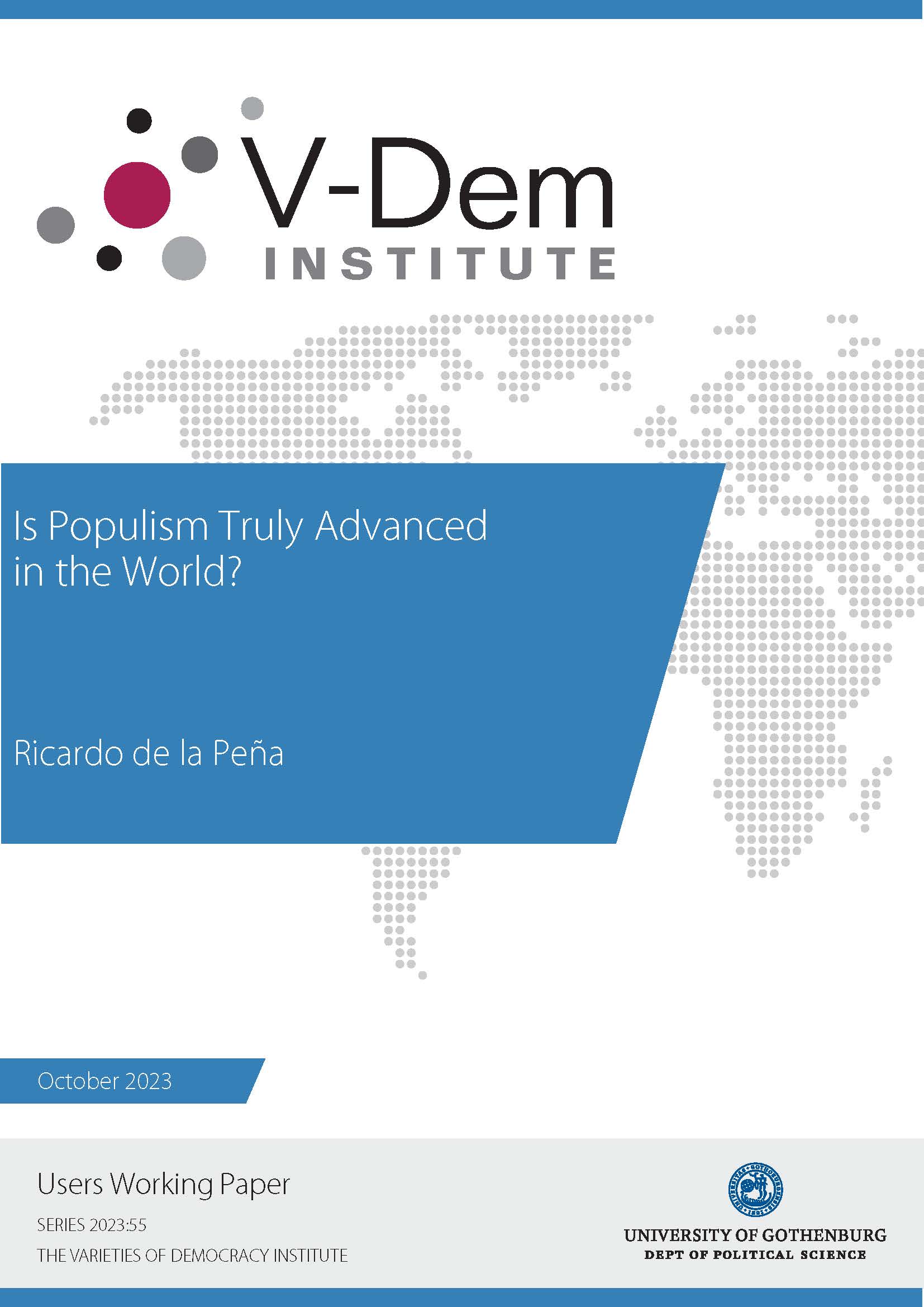
|
UWP #55 | Is Populism Truly Advanced in the World? | Ricardo de la Peña | University of Gothenburg, Varieties of Democracy Institute: Users’ Working Paper No. 55. October 2023. Published in Spanish as “¿De verdad el populismo está avanzando en el mundo?", in: Revista Mexicana de Estudios Electorales, 29:129-179. México: Sociedad Mexicana de Estudios Electorales, January-June 2023. |
It is fashionable to affirm that populism is advancing in the world. Examples of governments assuming positions that can be qualified in this way are abundant. But it seems pertinent to really dimension the existence and magnitude of this phenomenon and not only attend to a casuistic vision, largely focused on the Western world. That is why this paper will seek to measure the growth during the 21st century in terms of votes and seats in the lower national assemblies and the participation in the governments of the world of parties, differentiated according to their populist orientation. Today there are reliable sources of information to do this type of exercise. In particular, we will use the data compiled by the Varieties of Democracy (V-Dem) project to compare the electoral presence and success and the ability to lead or be part of the government coalitions of the parties according to their adherence to populist logics. To do this, after an introduction related to the same concept of populism, the source of information to be used in this text and the indices that will be used for analysis will be characterized. Subsequently, the results of the measurement of the behavior of these indices in the world in the period 2000-2019 and their relationship with the achievements of the parties in terms of votes, seats and participation in government coalitions will be presented in a synthetic way. Finally, the meaning of the data compiled, displayed and analyzed will be discussed. The analyzed data allow us to advance in the finding of a relationship between populist discourse and the adoption of a position contrary to elitism and that the position to the right in the political-ideological spectrum tends to make an organization less likely to adopt a populist rhetoric. However, there would be a long way to go to achieve a full explanation of the phenomenon of populism in this century and it is not insignificant progress in achieving electoral support and integration into governments that has been detected during the last decade. This forces us to think of new paths and alternative sources for understanding the phenomenon that occupies the center of attention in this essay. |
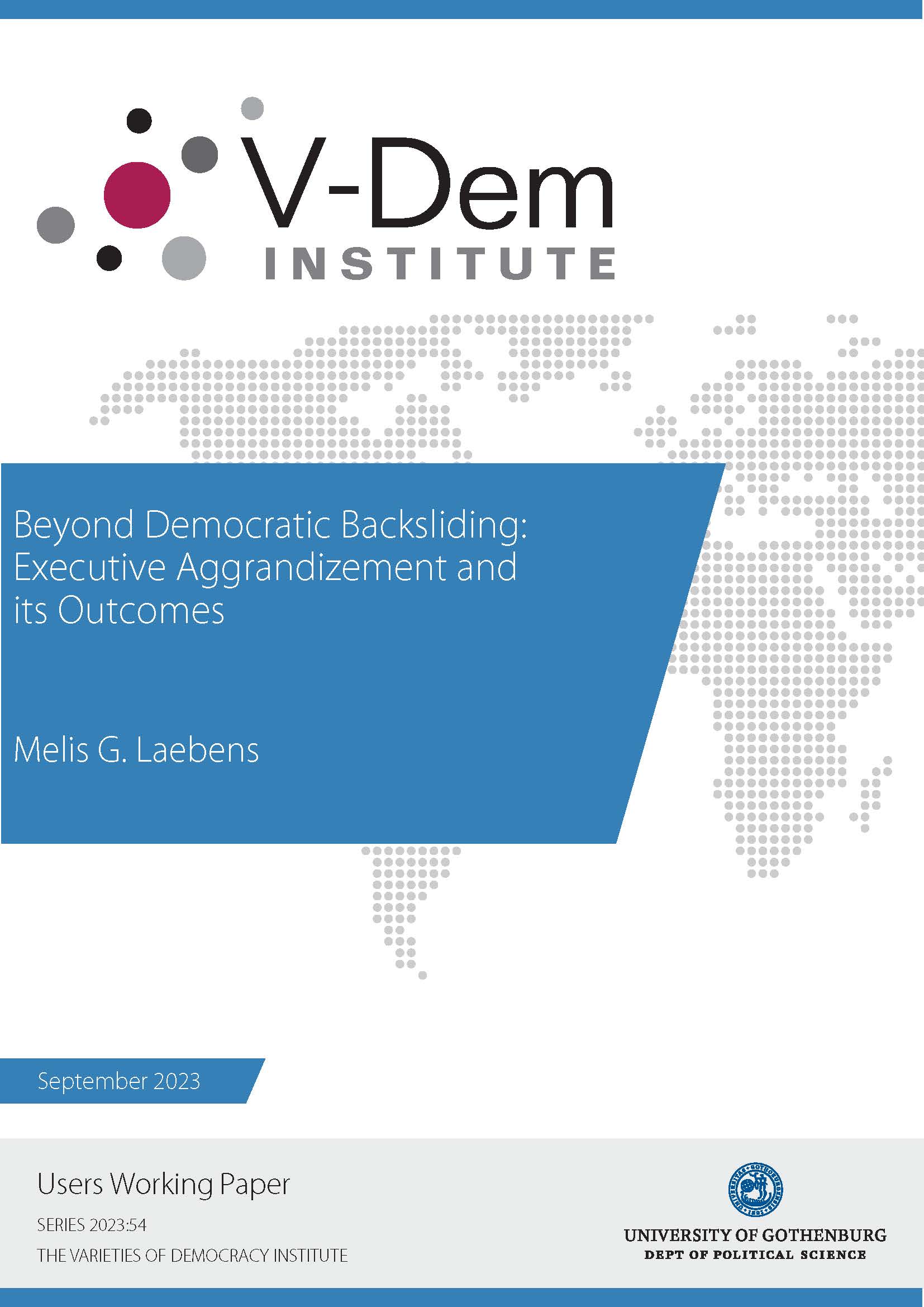
|
UWP #54 | Beyond Democratic Backsliding: Executive Aggrandizement and its Outcomes | Melis G. Laebens | University of Gothenburg, Varieties of Democracy Institute: Users’ Working Paper No. 54. September 2023. |
Executive power grabs and resulting democratic backsliding have become a major concern for scholars and the public alike. Although a growing number of cases are studied under these headings, we do not have globally applicable measurement criteria for observing executive aggrandizement, i.e. attempts by democratically elected incumbents to concentrate power. Our conceptual net tends to be either too wide, lumping together all forms of democratic regression, or too narrow, limiting our attention to particular mechanisms through which incumbents subvert democratic institutions. This article conceptualizes executive aggrandizement as an attempt by a democratically elected executive leader to weaken both electoral (vertical) and horizontal accountability without altogether suspending democratic institutions. Using selected V-Dem indicators and secondary sources, I identify 26 cases of executive aggrandizement in democracies worldwide from 1989 to 2019. Descriptive analysis shows considerable variation in the consequences of executive aggrandizement for the democratic regime and for the incumbents who engaged in it. Only a minority of these cases resulted in democratic breakdown due to incumbent takeover, while a majority ended with the incumbent being forced out of office either via democratic institutional procedures or otherwise. This article lays the ground for explaining the causes and outcomes of executive aggrandizement. |
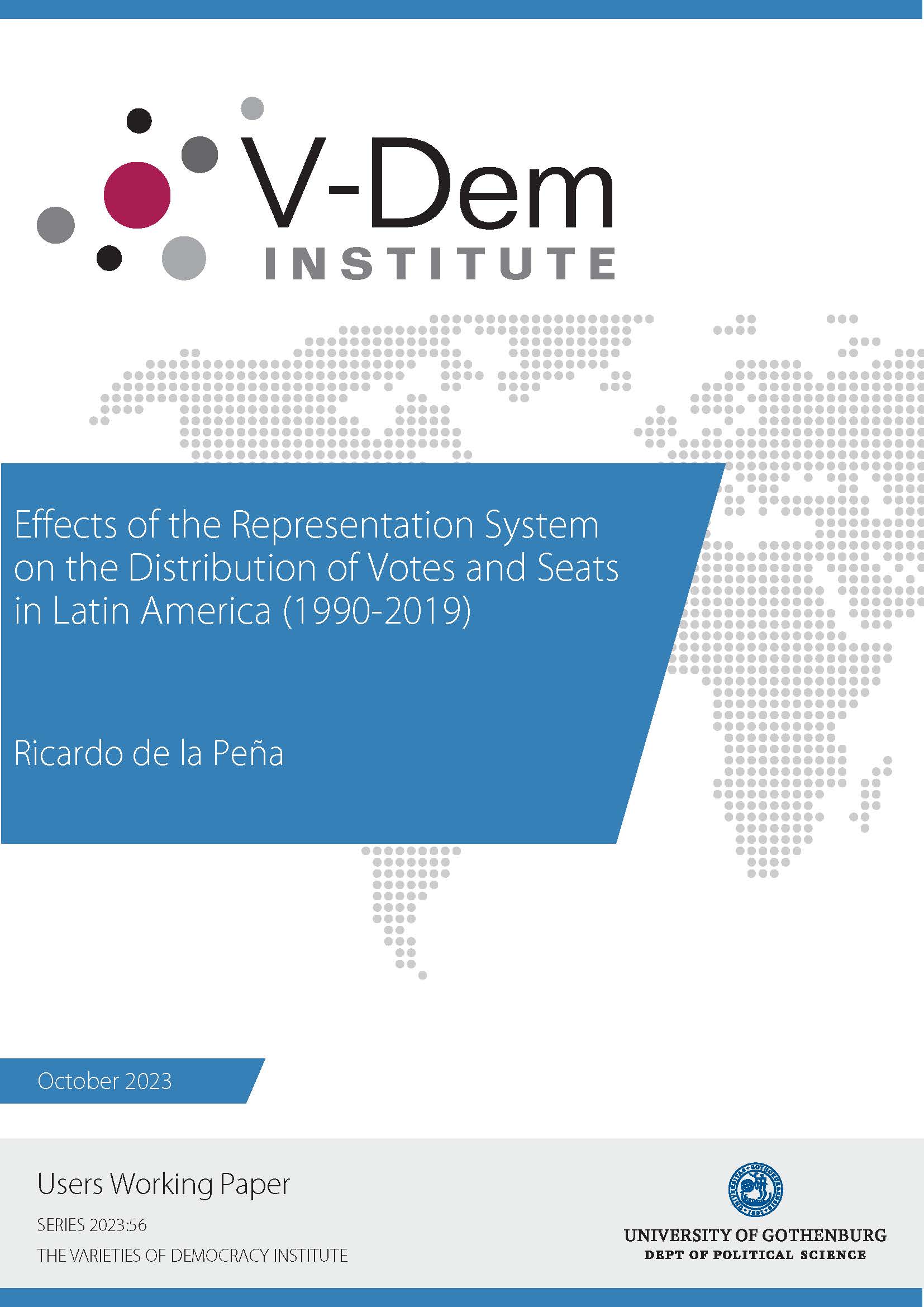
|
UWP #56 | Effects of the Representation System on the Distribution of Votes and Seats in Latin America (1990-2019) | Ricardo de la Peña | University of Gothenburg, Varieties of Democracy Institute: Users’ Working Paper No. 56. October 2023. |
One of the main consequences of the legal rules that govern electoral systems is that they establish the conditions for the conversion of votes into seats. Based on various public sources of information, this essay constructs indicators on the effects of the rules adopted in the electoral systems of Latin America in the period 1990-2019 in terms of the fragmentation of votes and seats. The evidence analyzed shows that there is no defined and constant pattern that reflects that the adoption of a proportional representation system results in a different fragmentation than that which occurs when a mixed system is available. The lower fragmentation of the vote than of seats does not turn out to be a product of the presence of partisan alliances. The fragmentation of voting in mixed systems has increased systematically, a situation that does not occur in the case of proportional systems. |
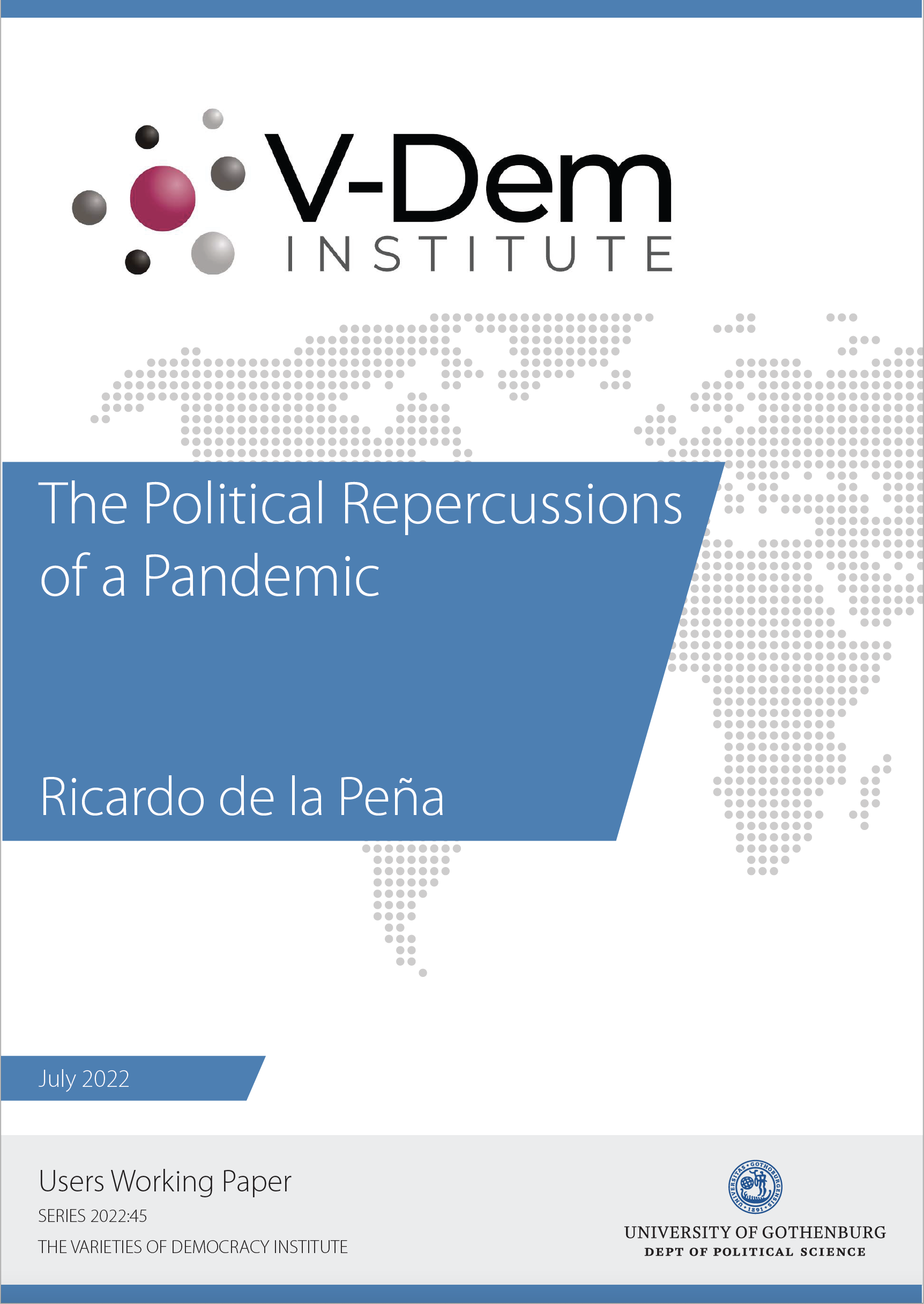
|
UWP #45 | The Political Repercussions of a Pandemic | Ricardo de la Peña | University of Gothenburg, Varieties of Democracy Institute: Users’ Working Paper No. 45. July 2022. Published in Spanish as "Las repercusiones políticas de una pandemia", in: Revista Mexicana de Ciencias Políticas y Sociales, Vol. 66, 242:143-165. México: Universidad Nacional Autónoma de México, 2021. |
In this essay, data are recovered that account for the impact of the pandemic on the conditions of democracy in the world. The source of information is the Varieties of Democracy (V-Dem) project, which for this year incorporates, in addition to its monitoring of the situation of democracy in more than two hundred countries, a compilation of state responses to the pandemic and its impact on the validity of democratic standards. In this regard, it is observed that throughout the last decade there has been a decline in democracy, and although the effects of the pandemic are still limited, it is to be feared that in the long term its consequences will be worse than those perceived today. And given that there is an evident relationship between the autocratic character of the regimes and the propensity to violate democratic standards with exaggerated or non-consensual measures to combat the pandemic, is expected a deepening of the distance between countries where democracy prevails and those in which are autocratic forms of exercise of power. |
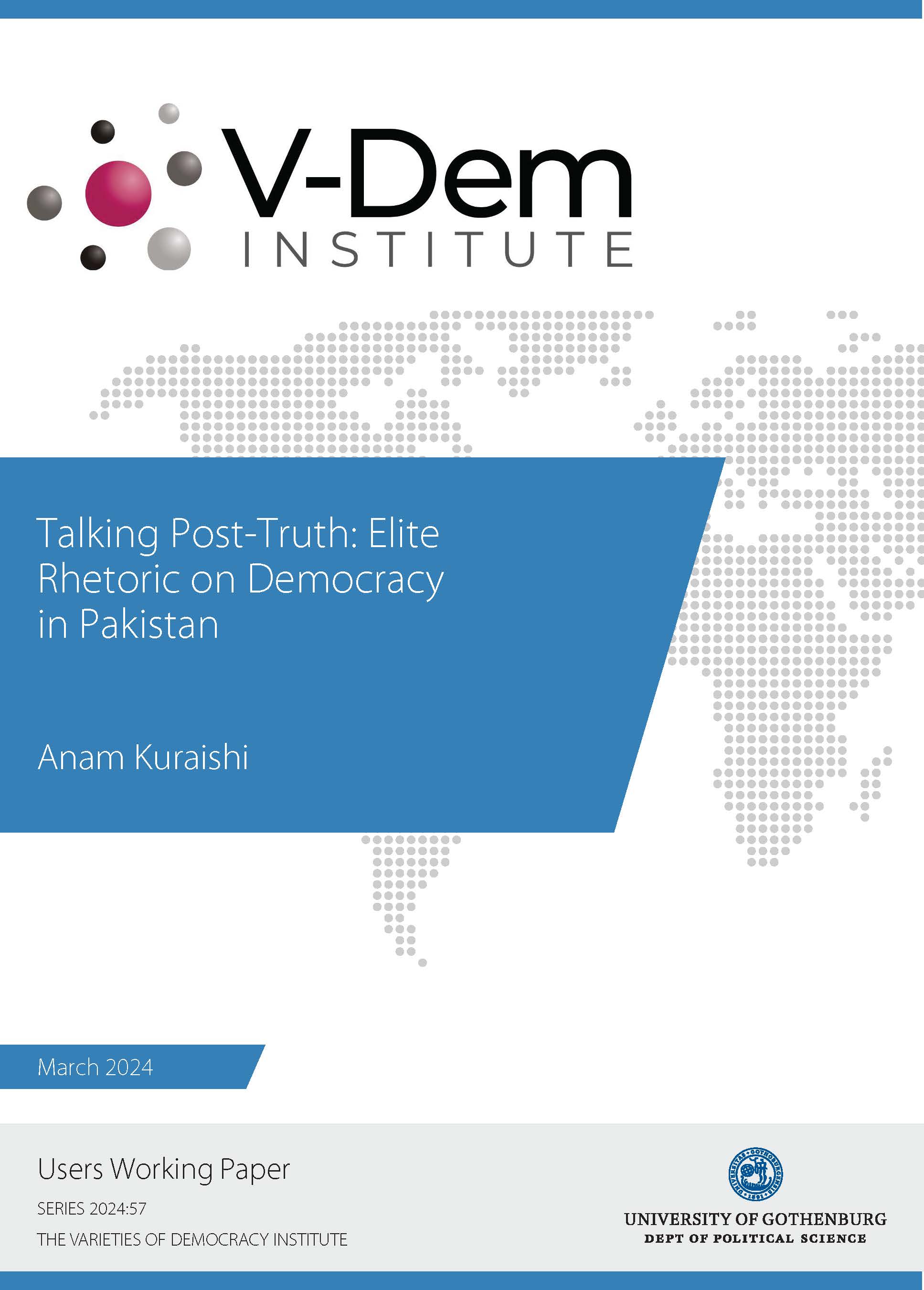
|
UWP #57 | Talking Post-Truth: Elite Rhetoric on Democracy in Pakistan | Anam Kuraishi | University of Gothenburg, Varieties of Democracy Institute: Users’ Working Paper No. 57. March 2024. |
Post-truth is increasingly linked to the decline of democracy. In this article, contrary to popular belief, I propose post-truth as a discourse strategy. Post-truth can have an important role during democratization. I introduce a new interpretive methodological approach to analyse textual data for post-truth narratives which I apply to 1209 newspaper articles from three leading Pakistani newspapers during national elections between 2007-2018. I identify posttruth narratives on democracy and find that post-truth narratives highlight the democratisation attempts in the country. Post-truth narratives act as mobilising strategies as opposed to being associated with the decline of democracy. This paper presents the re-evaluation of post-truth as a discourse and argues that its role during elections can be a powerful mobilizing strategy. |

|
UWP #58 | Party Institutionalization and Party Strength: A New Global Dataset | Darin Sanders Self, Shari Franke, and Grant Mitchell | University of Gothenburg, Varieties of Democracy Institute: Users’ Working Paper No. 58. August 2024. |
Party institutionalization and party organizational strength are two distinct concepts and both are widely used in Comparative Politics. Despite the centrality of these concepts in the literature, we lack measures of party institutionalization and/or strength that 1) accurately measures the concepts, 2) is measured at the party level, 3) is geographically expansive, and 4) covers a substantial scope of time. In this paper we introduce the Party Institutionalization and Party Strength (PIPS) dataset. Using data at the individual-party level from parties across the globe since 1970, we construct several new measures of party institutionalization and strength to facilitate comparative analysis. Our measures include system-level averages of party institutionalization and strength, in addition to individual party scores of institutionalization and organizational strength. We also construct measures which distinguish between incumbent and opposition parties. Lastly, we construct measures of institutionalization and strength contingent on whether the party exists in a democratic or authoritarian regime. |

|
UWP #59 | The Legacy of Stateness: Using Stateness Stock to Predict Current Fragility | Andrea Vaccaro and Rachel M. Gisselquist | University of Gothenburg, Varieties of Democracy Institute: Users’ Working Paper No. 59. August 2024. A previous version of the paper was published in the WIDER Working Paper Series: https://www.wider.unu.edu/publication/statebuilding-fragile-countries.
|
Supporting state capacity is a priority for the international community, yet the record of internationally supported statebuilding to date has been mixed at best. A key question for continuing research concerns the factors influencing more versus less successful interventions. We show that the quality of past ‘stateness’ is crucial in understanding contemporary state fragility and statebuilding. Extending beyond previous work, we introduce the concept of past stateness, consider theoretically its relationship to contemporary fragility, and explore this relationship empirically, drawing on cross-national data and newly developed indicators. In line with our expectations, descriptive and inferential analysis shows that lack of experience of two core features of stateness—monopoly of violence and existence of a professional bureaucracy—in the past century predicts chronic fragility today. This association is mainly driven by monopoly of violence rather than existence of a professional bureaucracy. Our analysis sheds new light on the underlying heterogeneity among states today labelled as ‘fragile’. From a policy perspective, a key implication is that, in designing interventions, the most relevant experiences are likely to be from other countries with similar stateness legacies, rather than from ‘fragile states’ more generally. Our analysis does not imply that statebuilding is impossible in contexts with weak stateness legacies, but it does underscore the challenges of this and the importance of setting expectations appropriately. |

